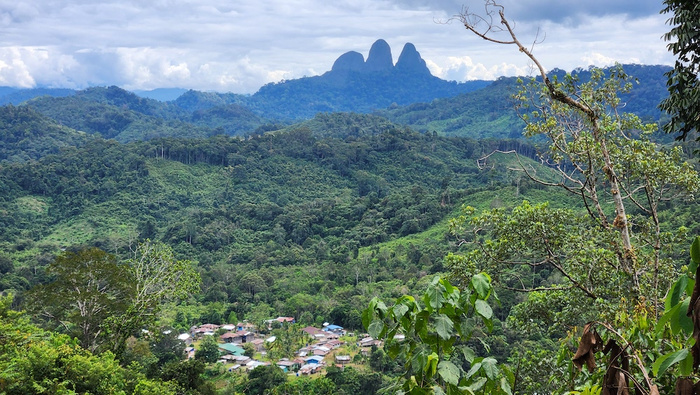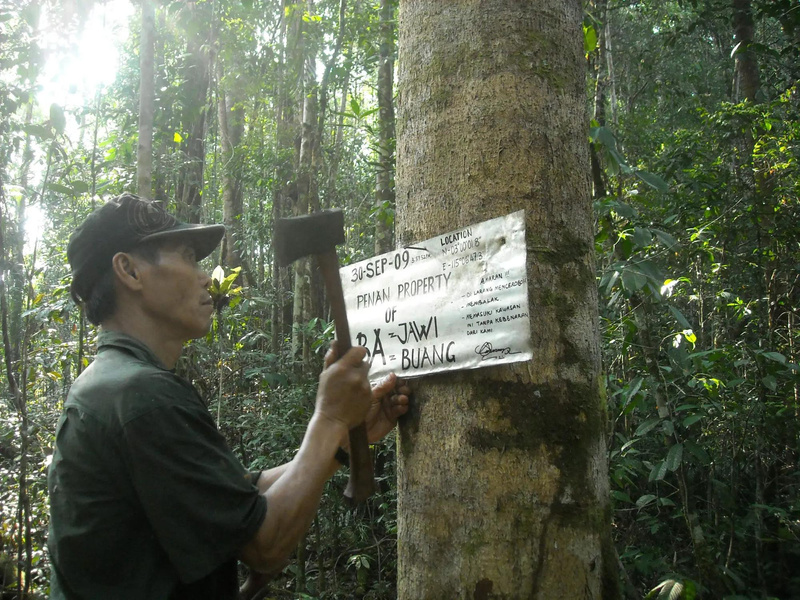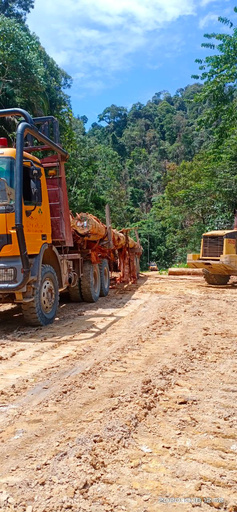LOST IN CERTIFICATION
How forest certification greenwashes Samling's dirty timber and fools the international market
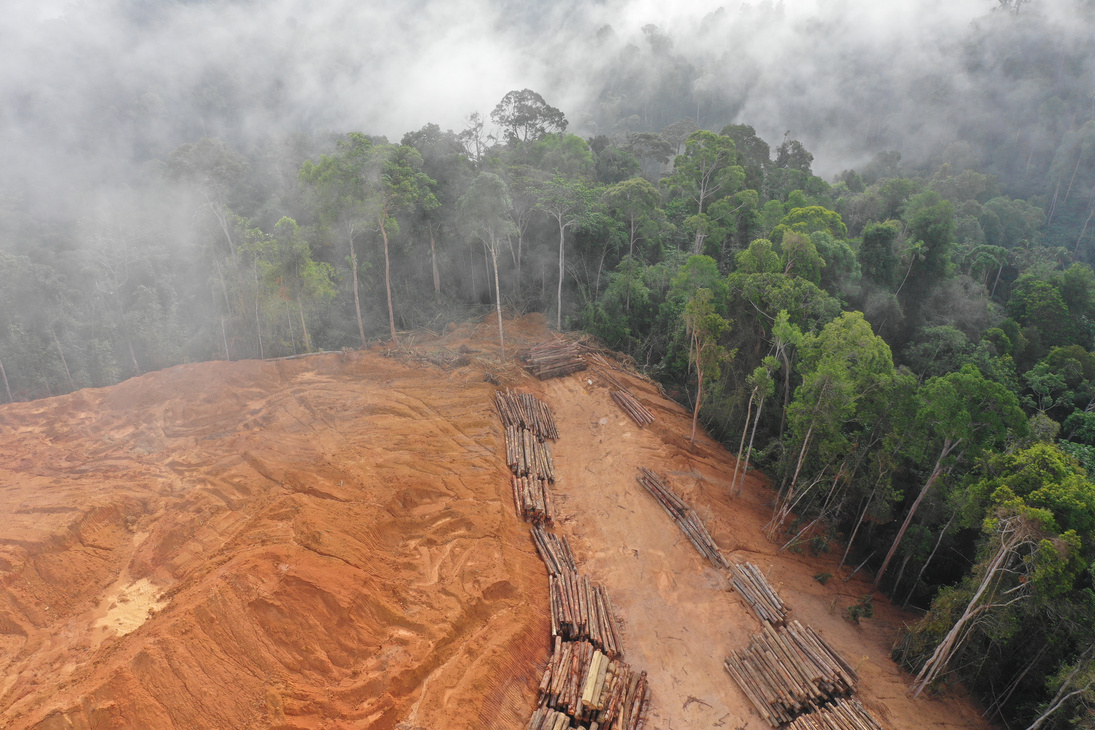
Prepared and published by
THE BORNEO PROJECT AND BRUNO MANSER FONDS
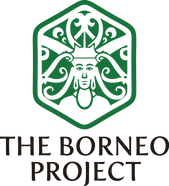
This report is a joint investigation by The Borneo Project and Bruno Manser Fonds.
Disclaimer: This report has been prepared in good faith on the basis of information available at the date of publication. The authors do not guarantee that all information is complete: readers are responsible for assessing the relevance and accuracy of the content of this publication. The authors will not be liable for any loss, damage, cost or expense incurred or arising by reason of any person using or relying on information in this publication.
Publication date: November 15, 2023.
Unless otherwise stated, all photos are property of The Borneo Project, Bruno Manser Fonds or Canva stock. Unless otherwise stated, satellite images are sourced from Bruno Manser Fonds archive, Sentinel-2 2020 by EOX - 4326 and Google Earth (Maxar TechnologiesLandsat / CopernicusCNES / Airbus), accessed 2023.
Citation: The Borneo Project & Bruno Manser Fonds, Lost in Certification: How Forest Certification greenwashes Samling's dirty timber and fools the international market, November 2023.
List of Acronyms
BHS: Baram Heritage Survey
BKJ: Ba’i Keremun Jamok
CB: Certification Body
CH: Certificate Holder
CRC: Community Representative Committee
CUZ: Community Use Zone
EUDR: European Union Resolution on Deforestation-free Products
FDS: Forest Department Sarawak
FMCLC: Forest Management Certification Liaison Committee
FMU: Forest Management Unit
FPIC: Free, Prior, and Informed Consent
FPMU: Forest Plantation Management Unit
FSC: Forest Stewardship Council
GCRAC: Gerenai Community Rights Action Committee
GFS: Global Forestry Services
HCV: High Conservation Value
IAF: International Accreditation Forum
ITTO: International Tropical Timber Organization
ISO: International Organization for Standardization
LPF: Licenses for Planted Forests
MDF: Medium Density Fiberboard
MTCC: The Malaysian Timber Certification Council
MTCS: Malaysian Timber Certification Scheme
NCR: Native Customary Rights
NGO: Non-governmental Organization
NREB: Natural Resources and Environment Board of Sarawak
PEFC: Programme for the Endorsement of Forest Certification
RM: Malaysian Ringgit
RSPO: Roundtable on Sustainable Palm Oil
SIRIM: SIRIM QAS International
SLAPP: Strategic Lawsuit Against Public Participation
STLVS: Sarawak Timber Legality Verification System
UBFA: Upper Baram Forest Area
Task
Start date
List of Figures
Figure 1: The Malaysian state of Sarawak on the island of Borneo
Figure 2: Entities in forest certification processes in Sarawak
Figure 3: Samling's licenses for timber, planted forest and oil palm in Sarawak
Figure 4: MTCS status of Samling’s licenses for planted forest (LPFs)
Figure 5: MTCS status of Samling’s logging concessions and respective FMUs
Figure 6: Overview of Samling FMUs and community territories
Figure 7: Gerenai FMU and overlapping community territories
Figure 8: Logging activity in and around Jamok territory
Figure 9: Before and after logging in Ba Jawi territory
Figure 10: Layun FMU and overlapping territory
Figure 11: Samling’s logging roads before April 2022 and after July 2022
Figure 12: Ravenscourt FMU and overlapping and nearby community territories
Figure 13: Analysis of Samling map vs Penan proposal
Figure 14: Suling Selaan FMU and overlapping and nearby community territories
Figure 15: Analysis of logging road encroachment
Figure 16: UBFA, Samling FMUs and community territories
Figure 17: Encroachment near the Batu Siman mountains
Figure 18: Long Moh territory overlapping with Gerenai and Suling Selaan FMUs
Figure 19: Analysis of logging activities In Long Moh 2017-2021
Figure 20: Historical location of Sungai Moh Wildlife Sanctuary
Figure 21: New location of Sungai Moh Wildlife Sanctuary
Figure 22: Progression of logging in the proposed Sungai Moh Wildlife Sanctuary
Figure 23: Analysis showing encroachment into both old and new locations of the sanctuary
Figure 24: Analysis showing encroachment into the new location of the sanctuary
Figure 25: Extensive deforestation in excised area of Gerenai FMU
Figure 26: Issued Provisional Leases showing the names of 13 different companies with a total land bank of just over 50,000 hectares
Figure 27: Samling's LPFs in Sarawak according to available data
Figure 28: Table from the Social Impact Assessment from 2018 Gerenai FMU
Figure 29: Complaints escalation processes
Figure 30: Accreditation complaints procedure
Figure 31: Samling’s corporate structure
Figure 32: Product trade flow
Figure 33: Samling’s tier 1 customers
About This Report
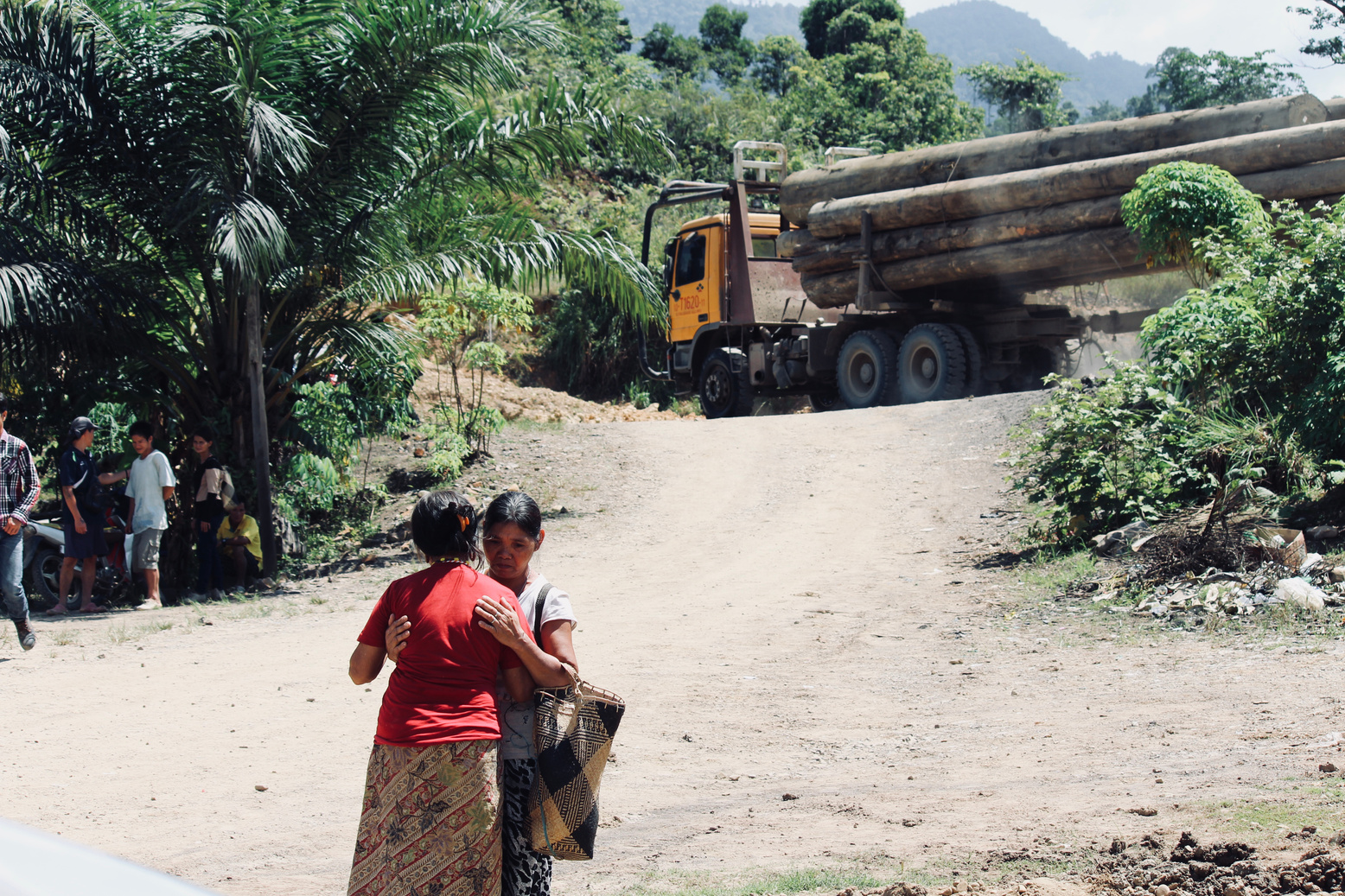
This report focuses on the logging operations of Malaysian timber company Samling Global Limited and its subsidiaries (“Samling“) in Sarawak from 2018 to 2023.
It includes documented evidence and investigation into Samling’s:
- Ethical, environmental and compliance issues
- Conflicts with Indigenous communities
- Questionable environmental practices
- Corporate structure and global trade flow
This report also examines problems with the Malaysian Timber Certification Scheme’s (MTCS’s) complaints procedure and demonstrates how the grievance mechanisms available to impacted local communities are faulty at best, and designed to fail at worst.
Indigenous communities in Sarawak have exhausted official complaint mechanisms with little impact. They have been speaking out publicly against Samling’s logging operations since 2020, uniting under the banner of the #StopTheChop campaign. This report gathers those community claims against Samling for the first time.
In doing so, this report intends to alert Malaysian and Sarawakian authorities, importing countries, buyers, certifiers, auditors and the public to Samling's questionable practices. It also sounds the alarm about the bodies involved in forest certification in Malaysia, which have been unable to guarantee the standards that they claim to uphold and unwilling to take action to protect Indigenous rights.
Key Findings
1.
Samling has been and remains party to multiple ongoing conflicts with Indigenous communities in Sarawak regarding failure to adequately obtain Free, Prior, and Informed Consent (FPIC) in their logging operations.
2.
Samling has repeatedly contributed to significant environmental degradation in Sarawak.
3.
The Malaysian Timber Certification Council and the Programme for the Endorsement of Forest Certification have repeatedly failed to guarantee their own standards and enforce compliance.
4.
As a result of repeated failed complaints, trust in domestic and international timber certification bodies has been seriously undermined.
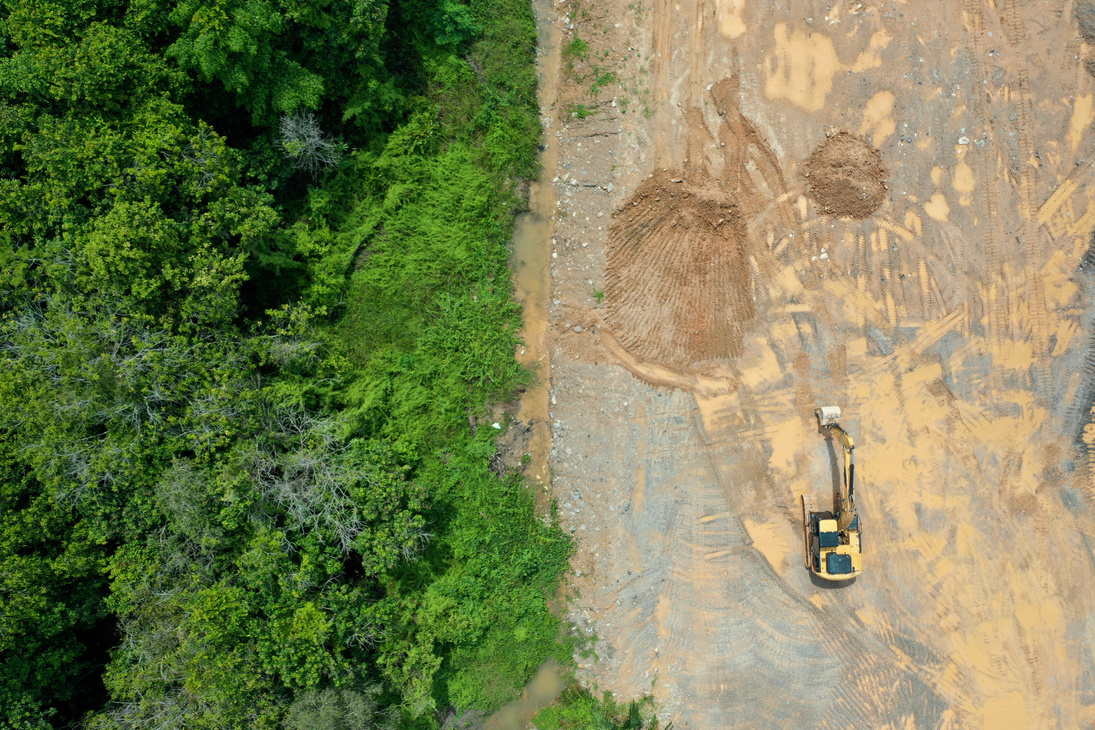
Introduction
The Malaysian state of Sarawak, a biodiversity hotspot on the island of Borneo, has become infamous for its exceptionally high rate of deforestation and has been a global leader in tropical log exports.[1] A 2009 analysis found that only 11% of forests in the state had been spared from logging.[2]
The Samling group of companies is a Malaysian conglomerate with interests in timber extraction, oil palm plantations, property development, and the automotive business in a number of countries.[3] Yaw Teck Seng, the founder of the group, started the original logging business in Sarawak in 1963. Today, through three subsidiaries under Samling Global Limited, a holding company that was incorporated in Bermuda and is now registered in Hong Kong, the company controls over 65 companies related
to forest products, plantations, and logging. The Yaw family has extensive political ties and their companies have repeatedly come under fire for alleged environmental and human rights conflicts in Malaysia and beyond.
Samling is one of the “Big Six” logging companies, which have dominated Sarawak’s timber boom for decades. Starting with timber extraction in the watersheds of the Baram and Limbang rivers, Samling is now the largest timber concession and forest plantation holder in Sarawak, managing over 1.1 million hectares of forest land and almost 200,000 hectares of forest plantations.[4] The conglomerate has been active in multiple global hotspots of deforestation, including Papua New Guinea, Indonesia, and Guyana.[5]
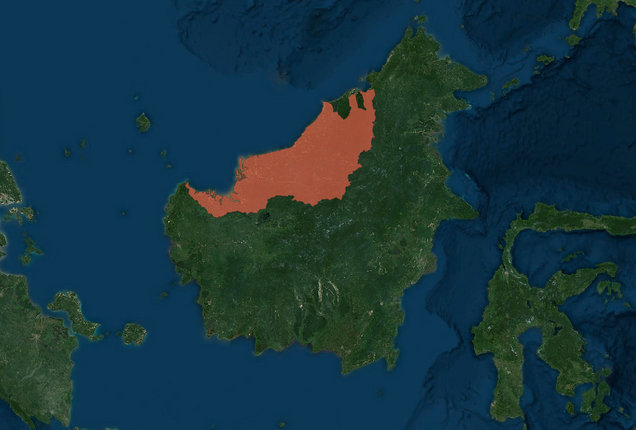
Figure 1: The Malaysian state of Sarawak on the island of Borneo
N
Samling operates its upstream operations in Sarawak via numerous different legal entities whose management, operations and branding are closely coordinated and controlled by Samling's operational headquarters in Miri, Sarawak. In this report, they are collectively referred to as 'Samling' rather than the individual legal entities' name. Samling subsidiaries examined in this report include but are not limited to Samling Plywood (Miri) Sdn Bhd, Samling Plywood Baramas Sdn Bhd, TreeOne Megapellet Sdn Bhd and Ravenscourt Sdn Bhd all of which are private companies registered with the Malaysian Companies Commission.
Reports of illegal logging, conflicts with traditional and Indigenous communities, and deforestation by Samling and its related companies have been circulating for many years:
- A Global Witness report from 2011 includes allegations of illegal logging by Samling going back to 1998.[7]
- The Norwegian Government Pension Fund divested from Samling Global in 2010, after an investigation found significant evidence of “illegal logging and severe environmental damage” in their forest operations in Sarawak and Guyana.[8]
- In 2011, Concord Pacific, a company linked to Samling’s founder Yaw Teck Seng as the controlling shareholder (60%),[9] was fined $100 million for illegal logging in Papua New Guinea.[10]
- In May 2023, the Forest Stewardship Council (FSC) accepted a complaint filed against Samling for alleged illegal logging, violations of human rights, destruction of High Conservation Value (HCV) forests, and breach of land conversion standards.[11]
"Sarawak is the worst example of tropical rainforest deforestation that we have seen anywhere in the world"
— Explorer Sir Robin Hanbury-Tenison speaking at the Basel Rainforest Tribunal, August 2023 [6]
The Sarawak government is working towards establishing sustainable logging practices in depleted forests, making forest certification mandatory for all logging concessions. This initiative has forced Samling to obtain forest certification for its timber extraction operations. However, the evidence provided in this report indicates that Samling has not fundamentally altered its practices to enhance sustainability and address ethical concerns.
Despite driving deforestation and exploiting the resources of local communities, Samling is able to export so-called “sustainable” timber around the world under the guise of forest certification. The Malaysian Timber Certification Scheme (MTCS) facilitates this process, essentially greenwashing the supply chain.
Land Rights in Sarawak: Inherent Risk
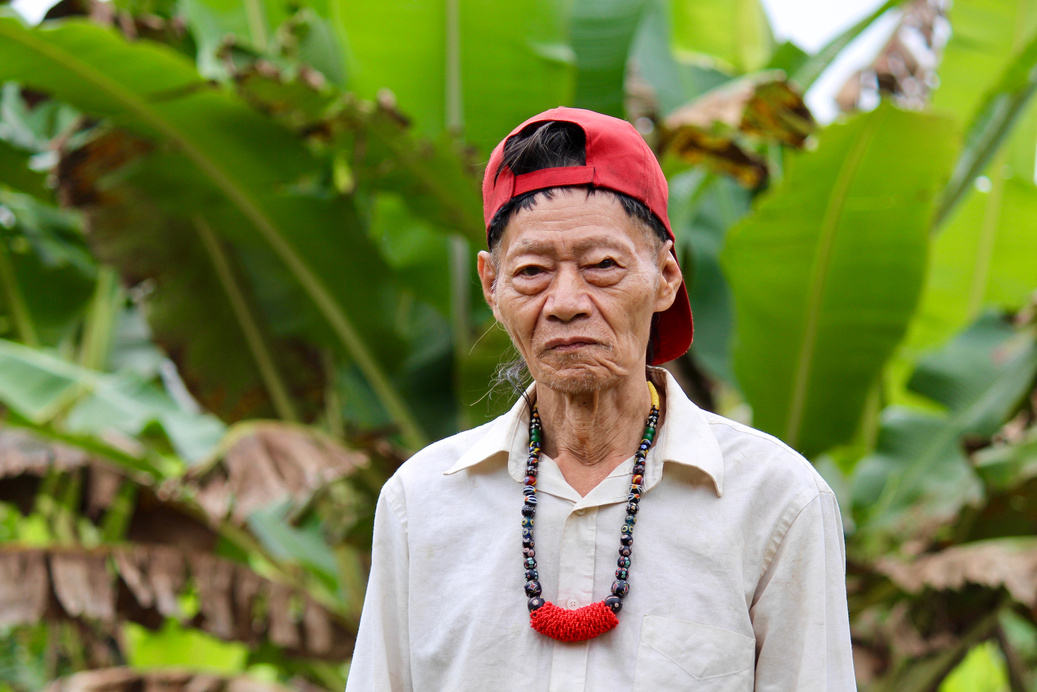
Timber from Sarawak is inherently high-risk from a human rights point of view.
Logging operations in Sarawak have been met with Indigenous resistance for decades, including massive blockades erected by Indigenous communities since the early 1990s in the north of the state, where Samling is the main timber logging concession holder.
The state of Sarawak simultaneously acknowledges Indigenous land rights while limiting them in a variety of ways.[12] Indigenous communities have extensive traditions and customs, or adat, regarding land rights, and each community is considered to own a territory. This is legally referred to as Native Customary Rights (NCR) land.
While the state has acknowledged that there are between 1.5 and 2.8 million hectares of NCR land in Sarawak, they have not revealed where exactly the NCR land is. Instead, laws relating to Indigenous land rights and NCR have been progressively tightened to the detriment of Indigenous rights.[13]
Many communities have tried to gain official legal recognition of NCR land through expensive court cases that often last many years, sometimes decades. Under the Sarawak Land Code, communities must prove they have used an area uninterruptedly since before 1958, which is challenging for longhouse communities and even more so for traditionally nomadic communities like the Penan. While they have, of course, used the land for much longer than that, much of that use has left no documented evidence. Amendments to the Land Code and recent case law arguably restrict the rights of communities to their NCR land even further.[14] Ironically, by bringing NCR claims through the proper legal channels, communities now risk handicapping their own rights to access their traditional territories. These are just some of the many elements discouraging communities from attempting to gain legal recognition over their land.
Moreover, the state of Sarawak keeps important land registry information hidden from public view, such as the locations and title holder information of logging and plantation concessions and NCR land.[15]
These elements make it easier for companies to gain access to land that should be recognized as NCR land, resulting in repeated encroachment and land conflicts with Indigenous communities, and creating an inherently high-risk environment for companies claiming to or attempting to respect Indigenous rights.
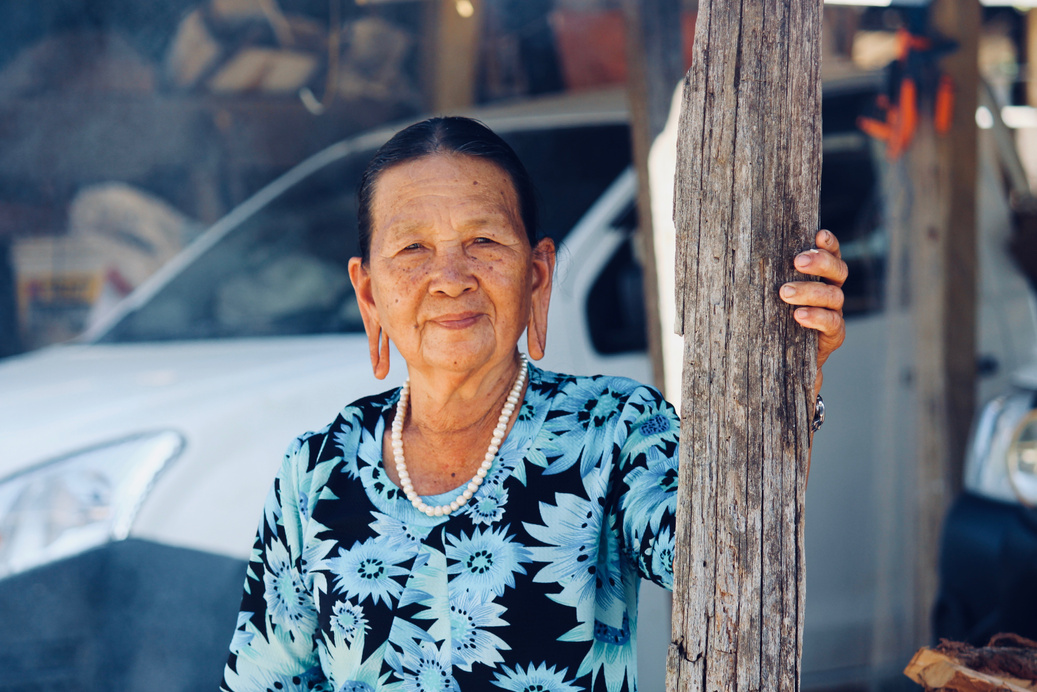
Community Conservation Initiatives
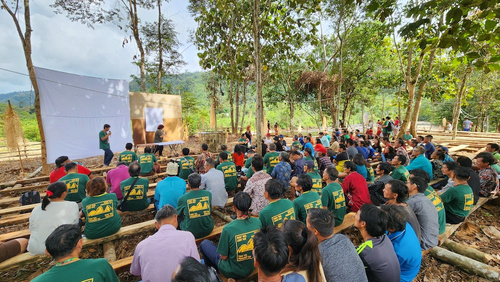
Indigenous communities in Sarawak have many traditional customs regarding forest resource management, including protection measures and communal land-use planning. In recent years communities have taken steps to gain formal recognition of Indigenous-led forest protection in certain areas.
One of these initiatives is known as the Upper Baram Forest Area (UBFA), sometimes referred to as the Baram Peace Park or the Baram Heritage Forest. The UBFA is an initiative designed to increase forest protection and build regenerative livelihoods in the upper Baram area. It was originally proposed by Indigenous communities in the area. In December 2020, the International Tropical Timber Organization (ITTO) endorsed a proposal submitted by the Forest Department Sarawak (FDS) for the project, which covers 2,835 square kilometers. The project has since been financed by ITTO member countries, the Swiss city of Basel, and Switzerland-based Bruno Manser Fonds.
The Sarawak government is currently working with local stakeholders, including Indigenous communities, KERUAN Organisation, and SAVE Rivers, to define and launch the project.[16]
In 2019, the Kenyah Jamok communities of Long Tungan and Long Siut submitted a proposal for official recognition of their communal forest, the Ba’i Keremun Jamok (BKJ), to FDS. Jamok ancestors recognized the area as a protected zone when they moved to Long Tungan many generations ago, and no part of the BKJ has ever been cultivated. It is also located within the UBFA area. When Samling trespassed in the area in 2018, the community was motivated to submit documents for official recognition of the BKJ in order to prevent further timber extraction.
Many communities in the area are currently in the process of developing similar plans to achieve formal recognition of important communal forest areas for protection and conservation.
Forest Management Units and Logging Concessions
- A Forest Management Unit (FMU) or a Forest Plantation Management Unit (FPMU) is a designated area of natural or planted forest managed by a specific entity or company for timber extraction and other forest-related activities. It is a defined parcel of land where forest management practices take place under explicit objectives and according to a long-term management plan.[17] This can include logging concessions or plantation concessions.
- A License for Planted Forest (LFP) refers to the authorization or contract granted by the government or relevant authorities to a specific company or individual allowing them the right to plant, manage, and harvest a forest plantation, such as acacia, eucalyptus, and other species harvested for timber. LPF license holders are also allowed to plant up to 20% of the plantable area of an LPF with oil palm trees.[18]
- A logging concession refers to the authorization or contract granted by the government or relevant authorities to a specific company or individual, allowing them the right to extract timber and engage in logging activities within a designated area of forest land (FMU). The concession typically outlines the terms and conditions under which the logging activities can take place, including the duration of the concession, the permitted volume of timber extraction, the exact location where timber may be cut at a certain time (coupes), and the environmental and social obligations that the concessionaire must adhere to during the logging operations. The focus of a logging concession is primarily on the rights and responsibilities of the concessionaire to exploit timber resources within the approved area.
Timber Certification and Logging in Sarawak
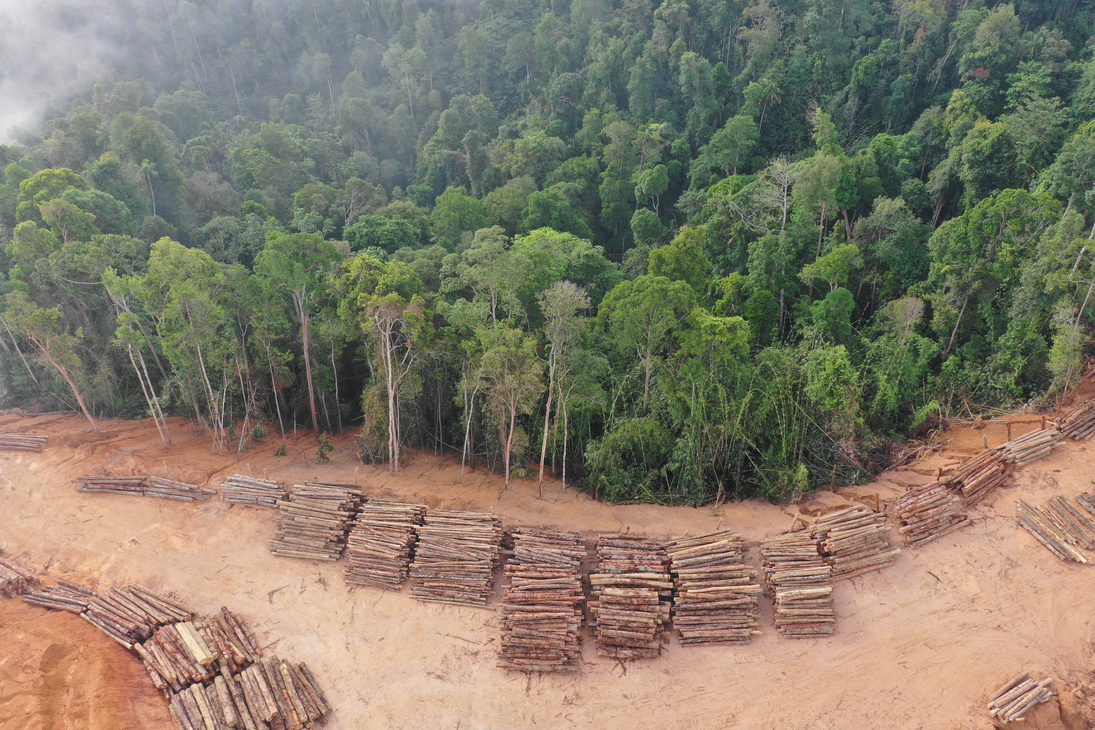
In 2017, the Forest Department Sarawak adopted the policy that all long-term FMUs in Sarawak are required to be certified by the end of 2022, with a grace period of two years.[19] The intention behind certification is to ensure basic standards for sustainability. There are two certification options for FMUs: through the Malaysian Timber Certification Scheme (MTCS), which is in turn certified by the Programme for the Endorsement of Forest Certification (PEFC), or through the Forest Stewardship Council (FSC). The Forest Department of Sarawak has also declared that all LPFs must be certified by 2025.[20]
PEFC and FSC are both international non-profit organizations that promote sustainable forest management through certification. The FSC certification process involves an independent assessment of forest management practices
against a set of environmental, social, and economic standards established by the FSC. It also ensures compliance with local policies regarding logging. Currently, there are no FSC-certified FMUs in Sarawak.
The MTCS is a national forest certification system developed by the Malaysian Timber Certification Council (MTCC), a private company with close connections to the Malaysian government and timber industry. It focuses on verifying the sustainable management of forest resources and ensuring that timber products meet international sustainability standards. It also ensures compliance with FDS regulations regarding timber extraction. The MTCC is responsible for the operation and credibility of the MTCS as a scheme recognized by PEFC. FMUs that undergo MTCS certification must comply with MTCC's specific criteria and guidelines for sustainable forest management.
In Malaysia there are two Certification Bodies (CBs) – entities that can evaluate and certify FMUs and timber companies against the MTCS standards for forest certification: SIRIM QAS International (SIRIM) and Control Union.
SIRIM is a government-owned corporation responsible for promoting, maintaining and inspecting standards in various industries. Control Union is an international certification and inspection organization that provides independent assessment and certification services in a range of sectors.
Figure 2: Entities in forest certification processes in Sarawak
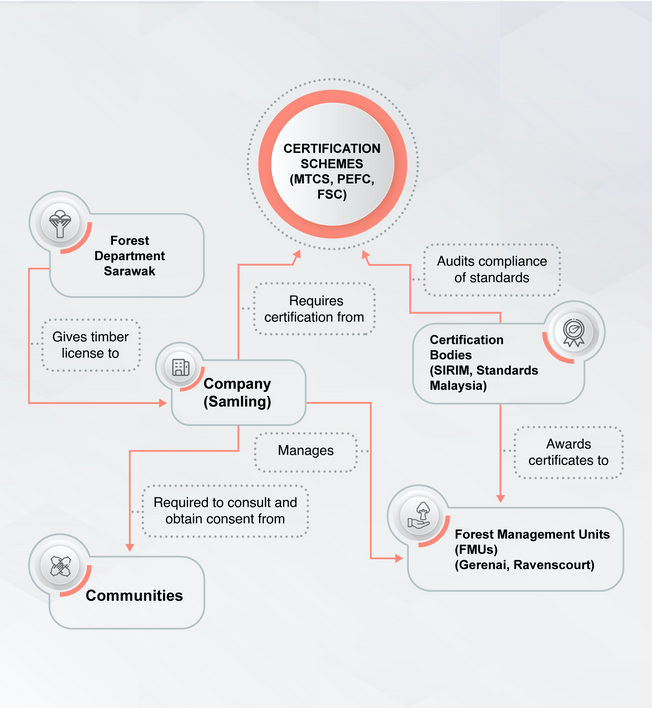
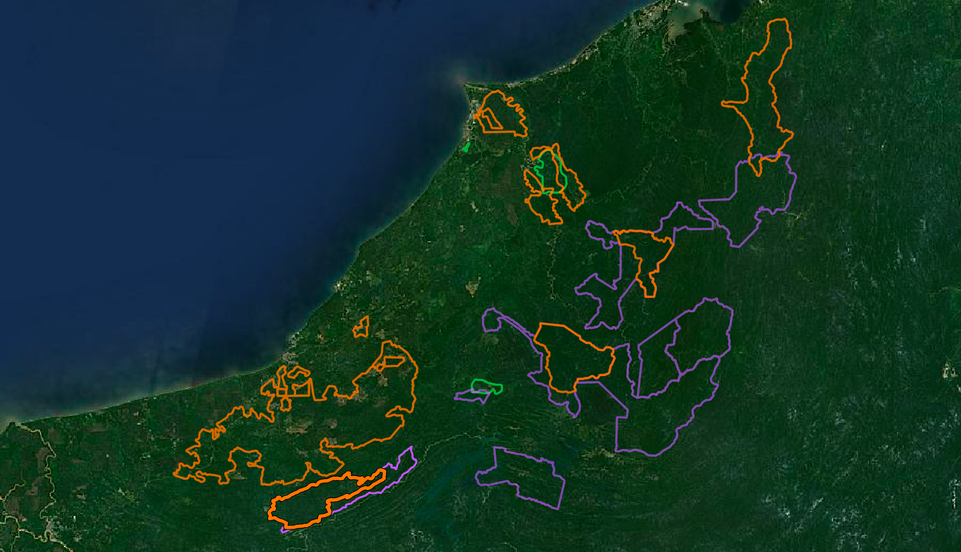
Figure 3: Samling's licenses for timber, planted forest and oil palm in Sarawak
N
Samling licenses for planted forest
Samling licenses for timber
Samling licenses for oil palm
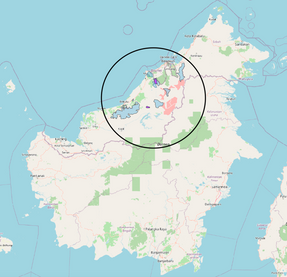
Certification Bodies conduct three stages of audits for MTCS certification of FMUs: stage 1, stage 2, and surveillance audits. The first stage, known as the pre-assessment, evaluates the FMU's forest management system and identifies any major gaps or “non-conformities” to the standards. The main assessment, or stage two audit, involves comprehensive on-site inspections and reviews to assess the FMU's compliance with sustainability criteria related to environmental, social, and economic aspects of forest management. After initial certification, regular surveillance audits are conducted to monitor ongoing compliance. A re-certification audit is conducted before the certificate expires.
In the context of FMU management, a Community Representative Committee (CRC) is a forum organized by the company holding the timber license that facilitates communication and engagement between representatives from both the FMU management personnel and the local communities impacted by its activities. Forest Department Sarawak sustainable management guidelines and manuals require FMU management to organize CRCs in all FMUs, and specifies that communities must choose their own CRC members and the number of community representatives. The committee aims to foster effective communication, engagement, and collaboration between these stakeholders.
Several of Samling’s FMUs have been certified through the MTCS. This includes Samling's Ravenscourt and Gerenai FMUs, which were certified under MTCS in 2018 and 2020, respectively. According to an email sent to The Borneo Project from the MTCC’s Director of Forest Management on August 25th 2023, the MTCS certificate for the Ravenscourt FMU was withdrawn in July 2023 due to Samling’s failure to submit and implement effective corrective action regarding non-conformities to the MTCS standards in their FMU operations.
Of Samling’s eight LPFs in Sarawak, four were holding a certificate at the time of publication (November 2023). All of Samling’s LPFs and timber concessions in Baram contain or border lands claimed by Indigenous communities with NCR claims.
Figure 4: MTCS status of Samling’s licenses for planted forest (LPFs)*
License for Planted Forests Number | FPMU name | MTCS certified? |
0014 | Segan | Certified in 2014 |
0021 | Paong | Audit ongoing |
0004 | Kuala Baram | Certified in 2022 |
0005 | Kanaya | Unknown |
0006 | Lana | Certified in 2017 |
0008 | Marudi | Certified in 2019 |
0020 | Layun | Unknown |
0043 | Unknown | Unknown |
*Based on currently available public data.
Figure 5: MTCS status of Samling’s logging concessions and respective FMUs*
Forest Timber License Number | FMU name | MTCS certified? |
T/0280 | Ulu Trusan | Certified In 2018 |
T/9115 | ||
T/0294 | Ravenscourt | Certified In 2018 and withdrawn In 2023 |
T/0390 | Tama Abu | Audit ongoing |
T/9082 | ||
T/0405 | Layun | Audit ongoing |
T/0411 | Suling Selaan | HCV assessment ongoing |
T/0412 | Certified by MTCS in 2004 and then expired In 2009 | |
T/0413 | Gerenai | Certified In 2020 |
T/3670 | Bah Sama | Certified In 2018 |
T/0404 | Sekiwa | Unknown |
T/3282 | Unknown | Unknown |
T/3284 | Unknown | Unknown |
*Based on currently available public data.
PART 2:
Evidence of Ethical, Environmental and Compliance Issues
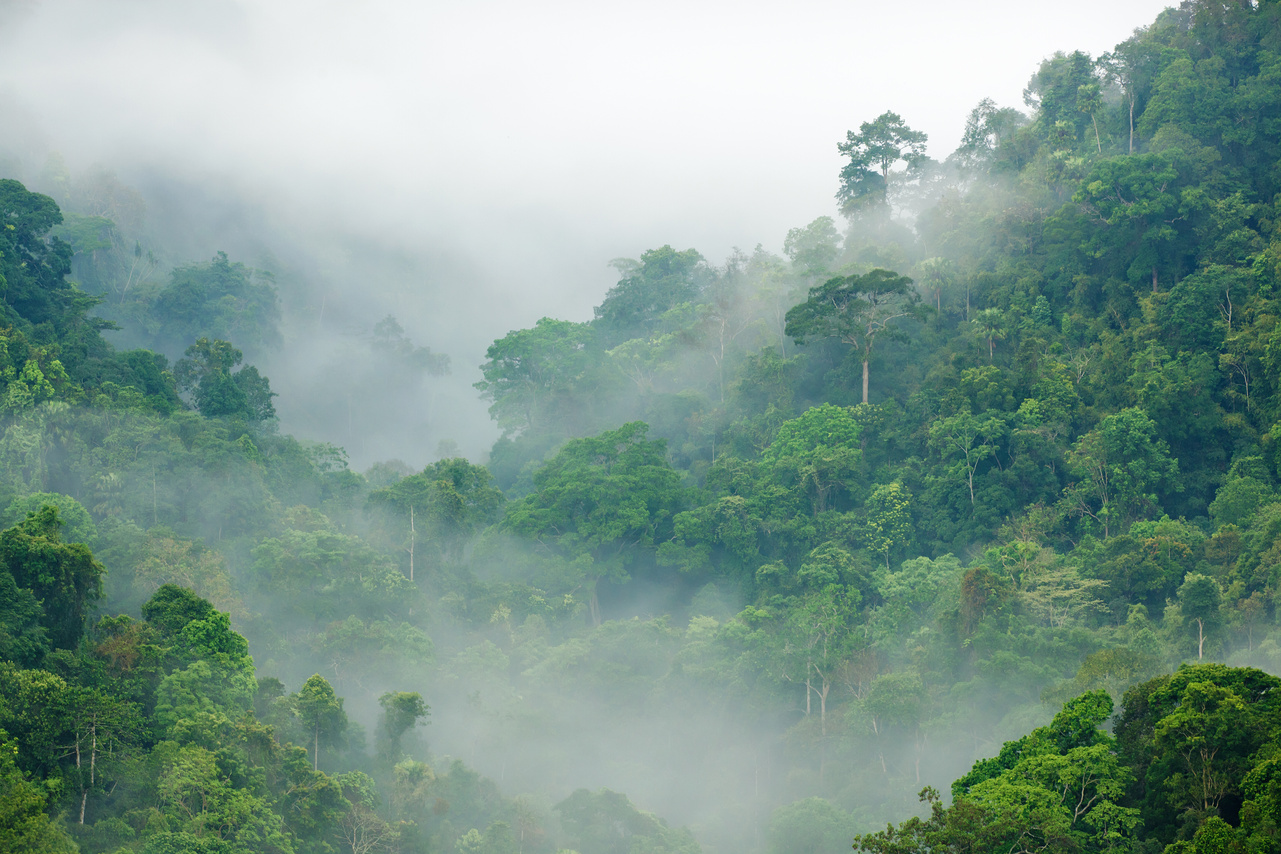
Documented Conflicts with Indigenous Communities
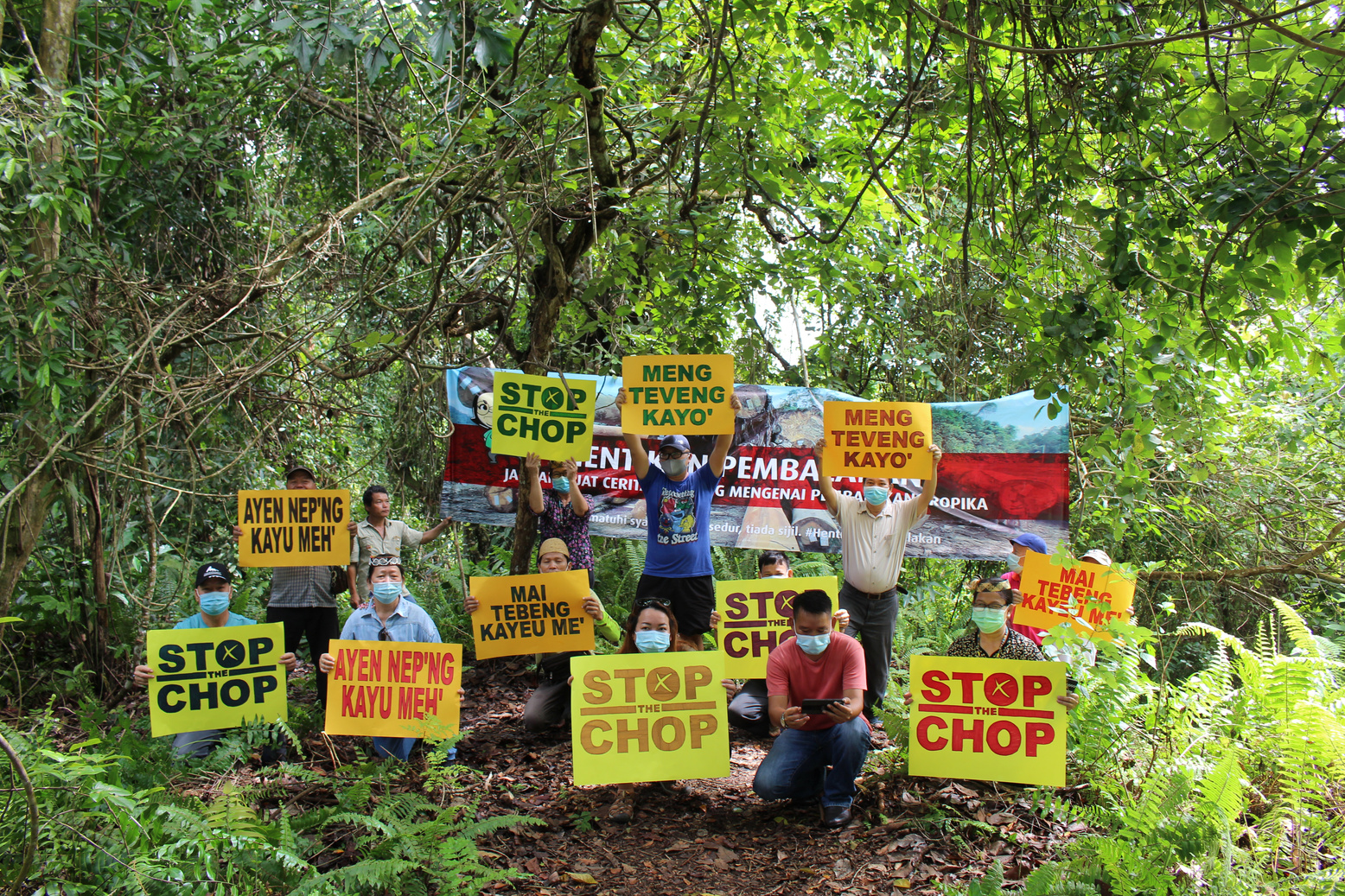
Indigenous communities in Baram protesting logging on their territories
Problems with Obtaining Free, Prior and Informed Consent
There is overwhelming evidence that Samling neglected to adequately obtain the free, prior and informed consent (FPIC) of Indigenous communities located within their logging concessions in multiple locations.
Consultations and impact assessments did not adequately or accurately inform or assess communities. In some cases, very few people were consulted, or communities were not consulted at all. Entire communities were left off of the maps for the FMUs. Among the people who were consulted, many people expressed opposition to logging.[21]*
Samling has committed to obtaining FPIC in its logging operations in multiple ways. According to a November 2021 audit by US-based Global Forestry Services (GFS), Samling “has a Social Policy dated 9th July, 2018, not to harvest any areas used by local communities until a mutual agreement has been signed.”[22] The MTCS standard also guarantees FPIC.**
The following examples highlight the situation in multiple FMUs managed by Samling. They demonstrate a pattern of failing to adequately obtain the consent of Indigenous communities, which inevitably results in conflict.
*In an EIA conducted for the Gerenai Concession in 2014, 64% of people interviewed said they had objections to the project, 27% said they were not sure about the project, and only 9% said they had no objections.
**Under principle 3.1: “Indigenous peoples shall control forest management on their lands and territories unless they delegate control with free, prior and informed consent to other agencies and/or parties.”
Overview
Figure 6: Overview of Samling FMUs and community territories discussed in this report
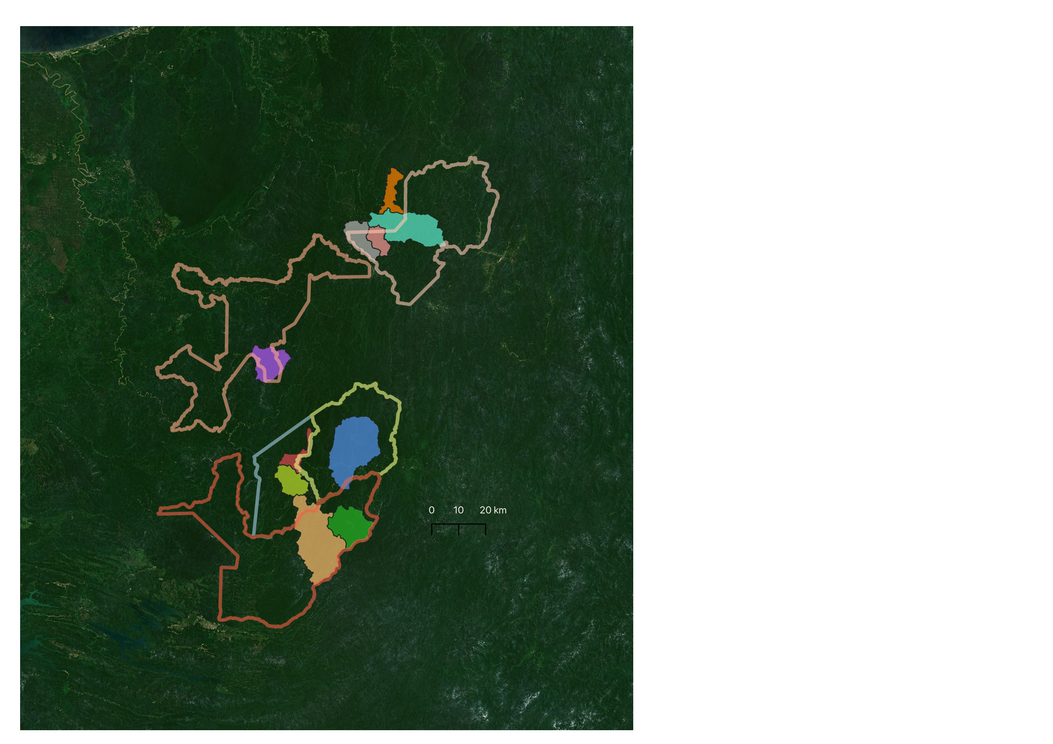
T/0294
T/0405
T/0411
T/0413
T/0412
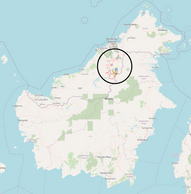
There are many more Indigenous communities with territories that fall within the maps discussed in this report. The maps in this report only identify territories of the communities discussed.
N

Gerenai FMU T/0413

Long Moh Land*

Ba Jawi Land*

Jamok Land

Layun FMU T/0405

Long Pakan Land

Ravenscourt FMU T/0294

Long Adang Land

Ba Gita Land

Ba Peresek Land

Long Tevenga Land
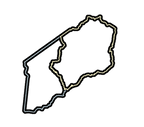
Suling Selaan FMU T/0411 & T/0412

Long Lamam Land

Long Ajeng/Long Murung Land


Long Moh Land
Jamok Land
Gerenai FMU T/0413
Figure 7: Gerenai FMU and overlapping community territories
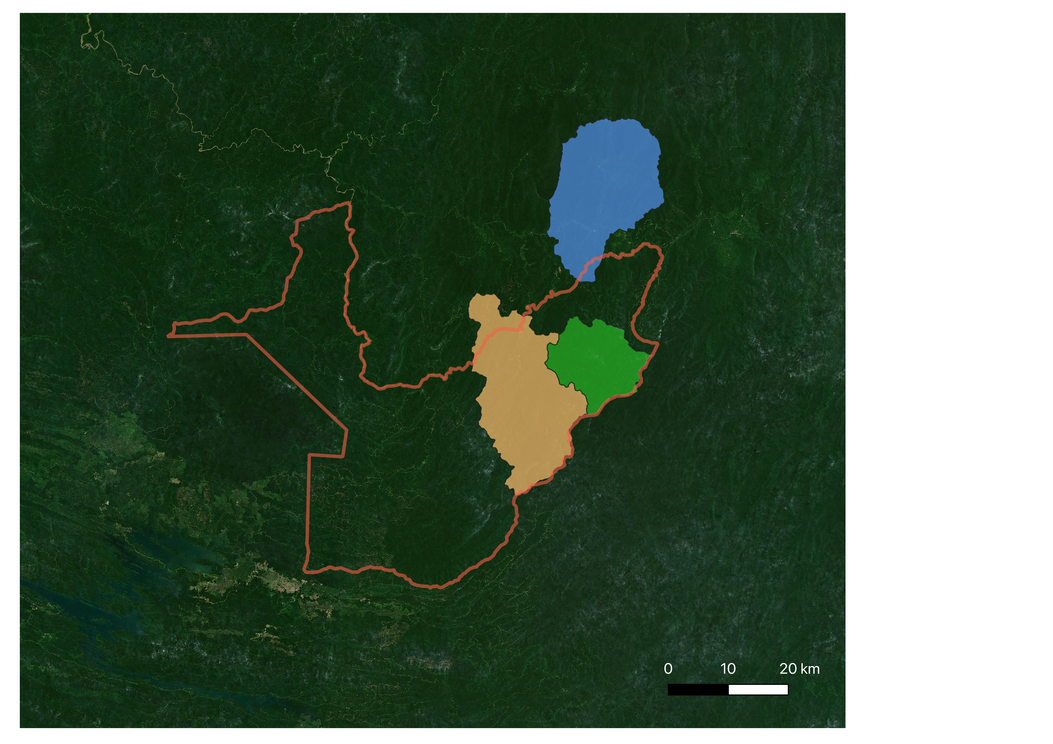
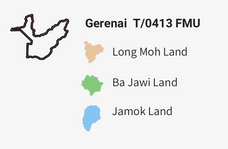
N
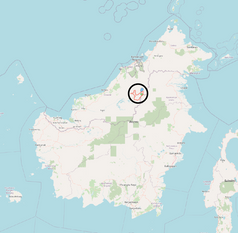
The Gerenai FMU has become a focal point of concern due to a lack of consultations before MTCS certification, repeated allegations of encroachment into Indigenous territories and alleged violations of community rights.
“Samling claimed that they have consulted villages within the Gerenai and that they have been given support and consent to carry out work there. The majority of us ‘kampung’ folks were left in the dark, we do not know what was agreed between the headman and Samling. Nothing was discussed with us.”
— Patrick Keheng, Long Julan [23]
Audit reports confirm community claims
Community claims that Samling failed to adequately obtain FPIC and consult communities prior to certification are well-documented in multiple audits conducted by SIRIM for the Gerenai FMU in 2018, 2019, 2021, and 2022. For example, the stage 1 audit report from October 2018 found that there were no records of consultations with local communities or Community Representative Committee (CRC) established.[24] The audit found that lists of relevant stakeholders and records of communication were not available.
Furthermore, forest managers were “not aware of the applicable federal, state and local laws, as well as the regulatory framework for forest management,” nor were they aware of “all binding international agreements relevant to forest management.”
These issues have persisted for all audits conducted to date. In the public summary of the stage 2 audit conducted in 2019, SIRIM’s auditors concluded:
“...consultation was not sufficient. Majority of the communities were not aware of the objective and function of Community Relation Committee (CRC) which is yet to be established.”[25]
Major non-conformity against indicator 2.2.2
Based on the surveillance audit from 2021, SIRIM concluded:
“Majority of the local communities don’t understand Forest Certification process including the objectives and meaning of FMU operation including formation and objectives of CRC or Forest Management Certification License Committee (FMCLC)* as there were lack of clear disclosure from the FMU. There was also inadequate community engagement, involving prior and informed consent from the communities on the FMU certification process affecting the duly recognized legal and customary or Use rights of the communities [sic].”[26]
Major non-conformity against indicator 2.2.2
“Majority of the communities in 18 villages were not aware of the mechanism available to resolve dispute.”[27]
Minor non-conformity against indicator 2.3.1
“Majority indicated the inadequate engagement, consultation and identification of the customary rights of the indigenous communities within and surrounding the FMU and meeting was held only with community leaders and headmen. There was insufficient involvement of the larger community at the village level. […] records of dialogue and consultation held with communities and relevant stakeholders on the documented customary rights of indigenous people was not available.”[28]
Major non-conformity against indicator 3.1.2
“Mechanism for conflict resolution (resource & tenure rights) were not publicly available and consultation with local communities were not conducted for 2020/2021.”[29]**
Minor non-conformity against indicator 3.3.2
*The FMCLC is a committee that includes representatives from various stakeholders involved in forest management and certification processes. Each FMU has their own FMCLC and they are only engaged when conflicts arise.
**The authors of this report note that the Covid-19 Movement Control Order MCO was a contributing factor to this failure.
These non-conformities provide evidence that SIRIM had either missed all of these problems during the 2019 audit, or that the situation had worsened, or both. Based on the surveillance audit from 2022, the auditors concluded:[30]
“The consultation held with local communities to identify and document areas traditionally used and sites of significant importance to them was not conducted. The audit team has concluded that the corrective actions provided were not sufficiently implemented…”[31]
Major non-conformity against indicator 2.2.2 reissued
“The mechanism for conflict resolution (land tenure and use rights) was not sufficient. Updated records of a dispute over tenure and use rights were also not available…the corrective actions provided were not sufficiently implemented”[32]
Minor non-conformity against indicator 2.3.1 upgraded to Major non-conformity
“The Gerenai FMU has lacked engagement and identification of the customary rights of the indigenous communities within and surrounding the FMU. Furthermore, the status of indigenous people’s control over their land and territories was still not clear. The corrective actions provided were not sufficiently implemented.”[33]
Minor non-conformity against indicator 3.1.1 upgraded to Major non-conformity
It was noted the engagement with communities within and surrounding the FMU on customary rights or user rights of lands and resources was inadequate. The engagement with communities was limited to community leaders. In addition, there was no record of delegation control with free, prior and informed consent to other agencies and/or parties available. The corrective actions provided were not sufficiently implemented…”[34]
Major non-conformity against indicator 3.1.2 reissued
“Consultation with affected local communities on a mechanism for conflict resolution (sites of special cultural, ecological, economic or religious) was not sufficient. The corrective actions provided were not sufficiently implemented.”[35]
Major non-conformity against indicator 3.3.2 reissued
These examples illustrate Samling’s incomplete and arguably inadequate community engagement processes in Gerenai FMU, even after multiple audits over a period of many years. This only intensifies patterns of conflict with local communities.
Despite these non-conformities, SIRIM has not suspended or revoked the MTCS certificate for the Gerenai FMU. The problems identified by SIRIM touch on many of the same inadequacies flagged by the communities themselves, and published on the websites of SAVE Rivers, a Sarawak civil society organization, and others. Reports on the disputed Gerenai FMU were the subject of defamation proceedings by two Samling subsidiaries against SAVE Rivers in a local court, which were retracted by Samling in September 2023.
Long Siut and
Long Tungan
In July 2018, the Indigenous Kenyah Jamok living in the villages of Long Siut and Long Tungan reported that they found Samling entering their communal forest, the Ba’i Keremun Jamok, allegedly without prior notice or the community’s consent.
The Jamok communal forest is within the Gerenai FMU, which was not yet MTCS certified at that time, as well as within the UBFA conservation project. Satellite images show logging activities entering the communal forest in 2018 (see Figure 8).
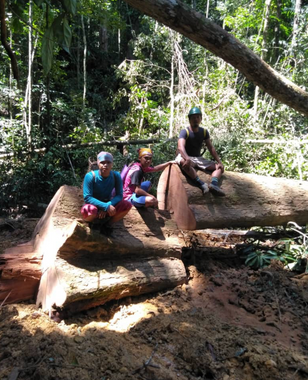
Jamok community members sit atop
logs felled by Samling on their land in July 2018
Figure 8: Logging activity in and around
Jamok territory
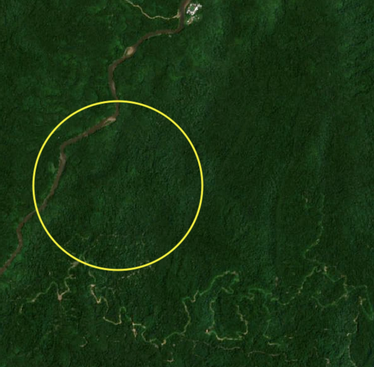
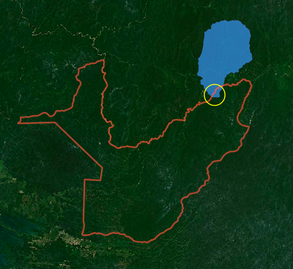
Area of Interest
N

Gerenai FMU

Jamok territory
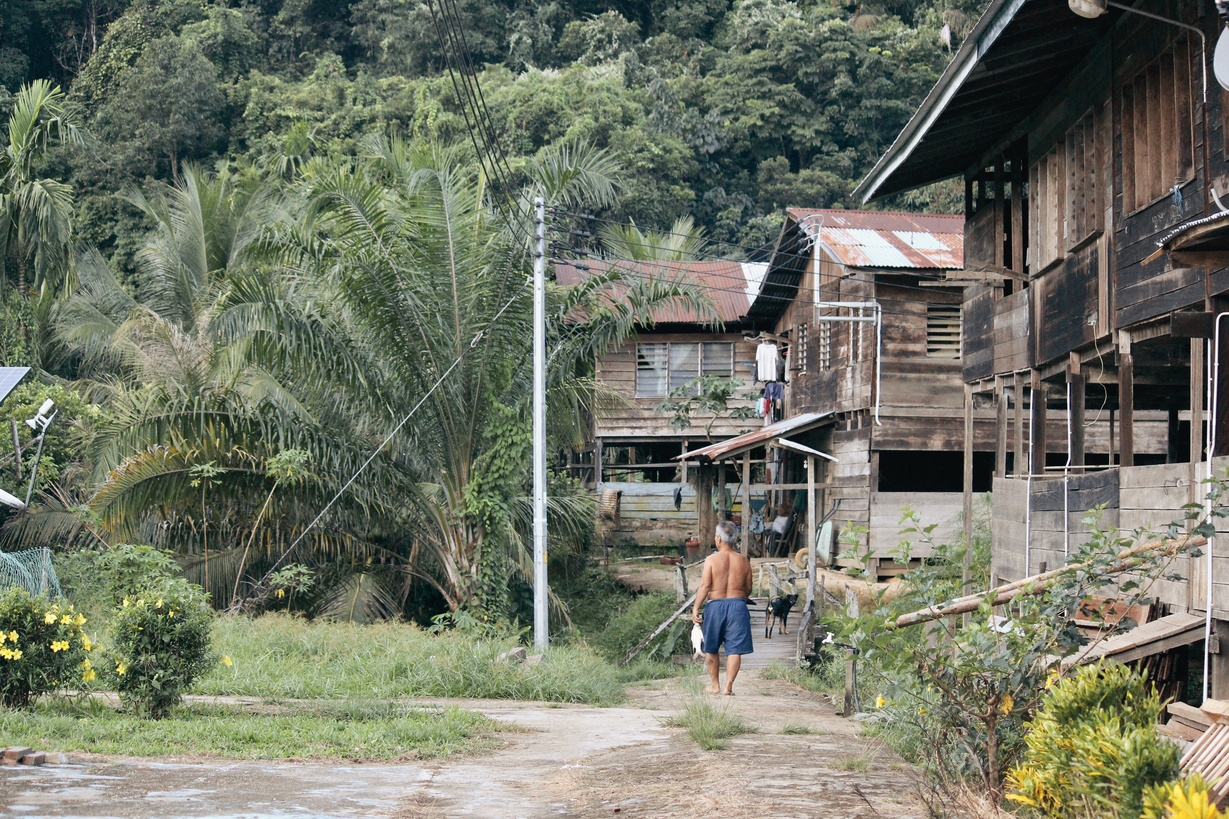
Long Tungan
The community reacted quickly, talking to Samling and informing the Forest Department Sarawak (FDS), requesting that FDS no longer grant any logging permits in their territory. According to minutes of a meeting between Samling and Jamok representatives, Samling agreed to pay the community RM 16,400 in compensation for the 107 logs taken and stopped timber extraction in the area — although they made no admission of guilt.[36]
Long Tungan residents
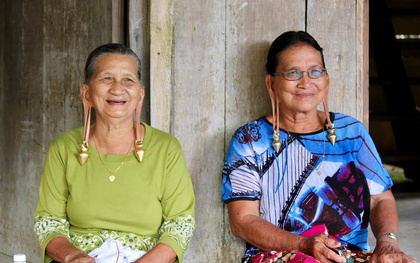
“We are working hard on community conservation to create long-term sustainable jobs in our forests Not to chop it all down for short-term gain”
— John Jau Sigau,
Long Tungan [37]
Ba Jawi
Deforestation in the territory of Ba Jawi is of special concern as this is the last Penan community in the Baram area that follows a nomadic hunter-gatherer life. Their situation needs special sensitivity regarding consultation and FPIC.
Between approximately 2012 and 2015, Samling logged the territory of Ba Jawi (see Figure 9) without obtaining the community’s prior consent. The community had also filed an NCR case against Samling in 2010.[38] Ba Jawi has repeatedly expressed their rejection of logging in letters to Samling in February 2020 and July 2023.
SIRIM’s audit reports for Gerenai document the difficulties in consulting and reaching the small, remote community. The 2021 audit identified the lack of consultations under the MTCS certification process and lack of social impact assessments (SIAs) as a minor non-conformity under indicator 3.1.1[39] and a major non-conformity under indicator 4.4.1.[40]
Marking NCR boundaries of Ba Jawi
Figure 9: Before and after logging in Ba Jawi territory
Before (2010)
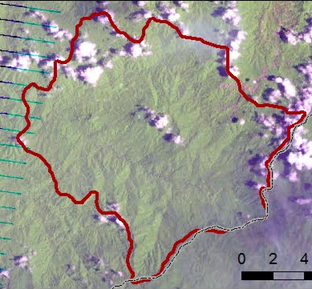
Area of Interest

Gerenai FMU

Ba Jawi Land
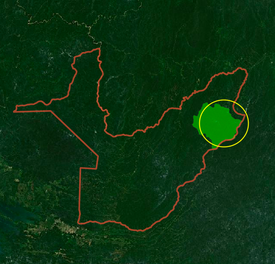
After (2015)
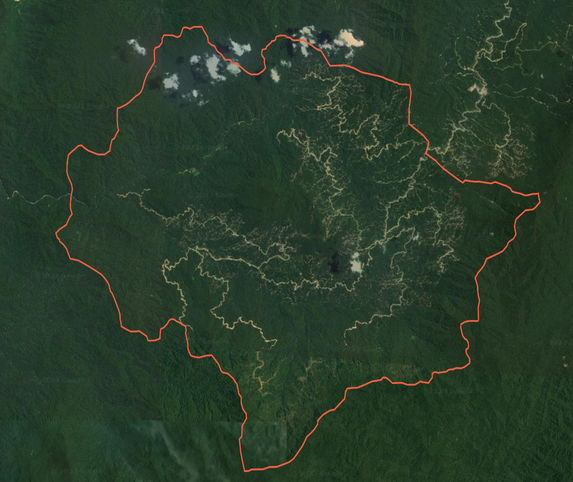
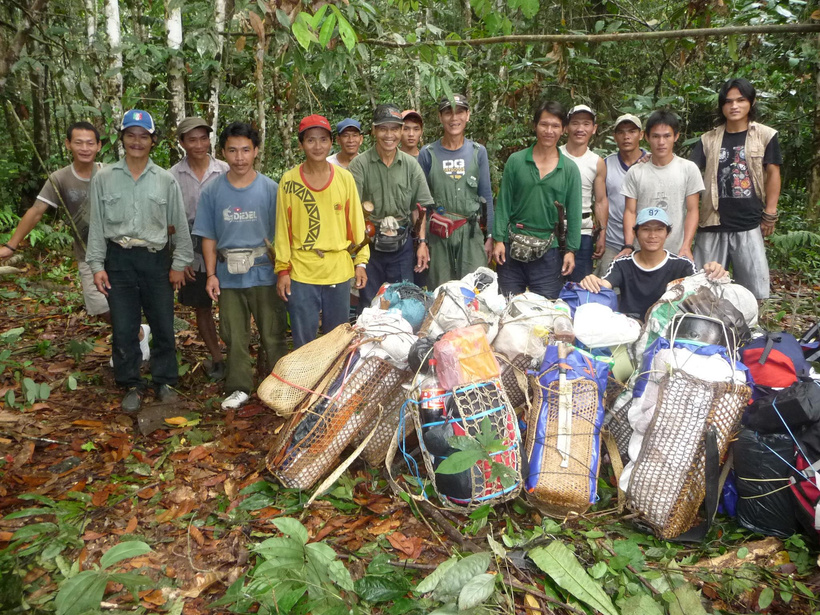
Members of the last semi-nomadic Penan community in the Baram: Ba Jawi
The zoning map from Samling's Forest Management Plan does not reflect the community’s demands to exclude their territory from the production zone.[41] The map instead shows an intention to build a road close to the village. The community has not been consulted about this road.
Roads are a contentious issue in Indigenous communities; while they are essential for transport and access, they also result in environmental degradation that impacts local resources, including sources of food, water, and shelter. Consultation with communities before a road is built is imperative to mitigate potential negative impacts.
“As the last nomads of Baram, we ask Samling to stay away from our forests and allow us to continue to live like our ancestors and carry on their legacy and culture.”
— Letter from Ba Jawi to Samling,
July 2023 [42]
Layun FMU T/0405
Figure 10: Layun FMU and overlapping territory
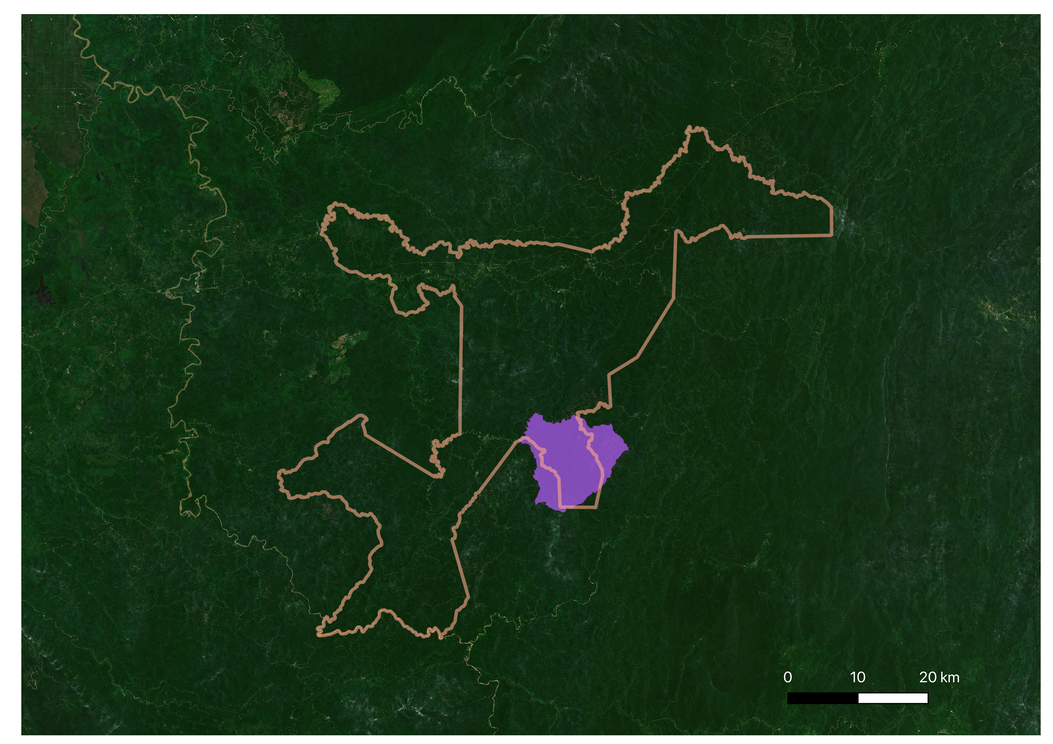
Layun FMU T/0405

Long Pakan Land
N
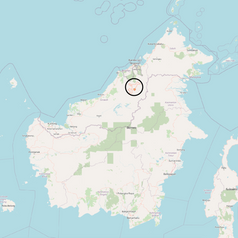
The Layun FMU, a 142,970 hectare area, presents another example of Samling operating in Indigenous territories without prior and informed consent. As of November 2023, the stage 2 audit had been conducted by SIRIM, but the MTCS certificate had not yet been granted and the audit had not been published. Before applying for MTCS certification, the Layun FMU was certified under the Sarawak Timber Legality Verification System (STLVS) by Global Forestry Services (GFS).
The STLVS was a certification system specific to the state of Sarawak. It was established to ensure the legality of timber products originating from Sarawak's forests. GFS is a consulting and advisory firm that provides a range of services related to forestry and land-use planning. It also acted as an auditor of STLVS. Currently, the Sarawak government is requiring either FSC or MTCS certification for all FMUs, and STLVS is no longer relevant
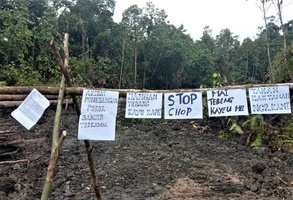
Long Pakan blockade against Samling,
October 2021
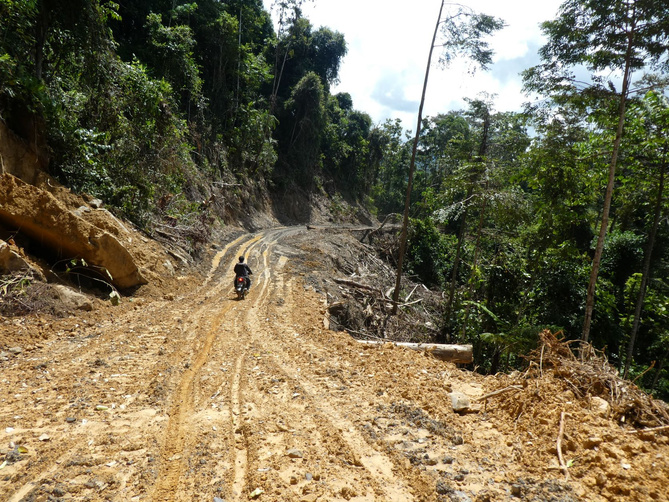
41
Logging road encroaching into
Long Pakan territory
Long Pakan
The territory belonging to the community of Long Pakan is included in the Layun FMU (see Figure 10). When Long Pakan discovered Samling encroaching into their territory in August 2021, the community had not been consulted and had not agreed to the logging.
On August 23, 2021, the headman of Long Pakan lodged an official police report against the company. On September 22, 2021, the community erected a blockade. The headman lodged a second police report on October 5, 2021. Explaining the blockade, the headman said:
“We request Samling leave immediately and not to be given any timber certification in our area. We erected a blockade to prevent Samling from further encroaching into the NCR land of Long Pakan. We are not happy when the company continues to work because the forest will vanish, forest products are difficult to find such as sago, rattan, medicines, game is also difficult to hunt and the polluted water and soil erosion cause the fish to die.”[43]
Figure 11: Samling’s logging roads before April 2022 and after July 2022
Long Pakan village location
Area of Interest

Long Pakan Land

Layun FMU T/0405
April 2022
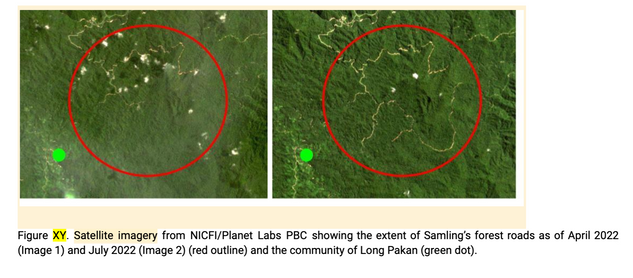
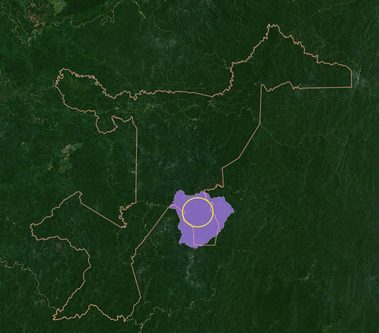
July 2022
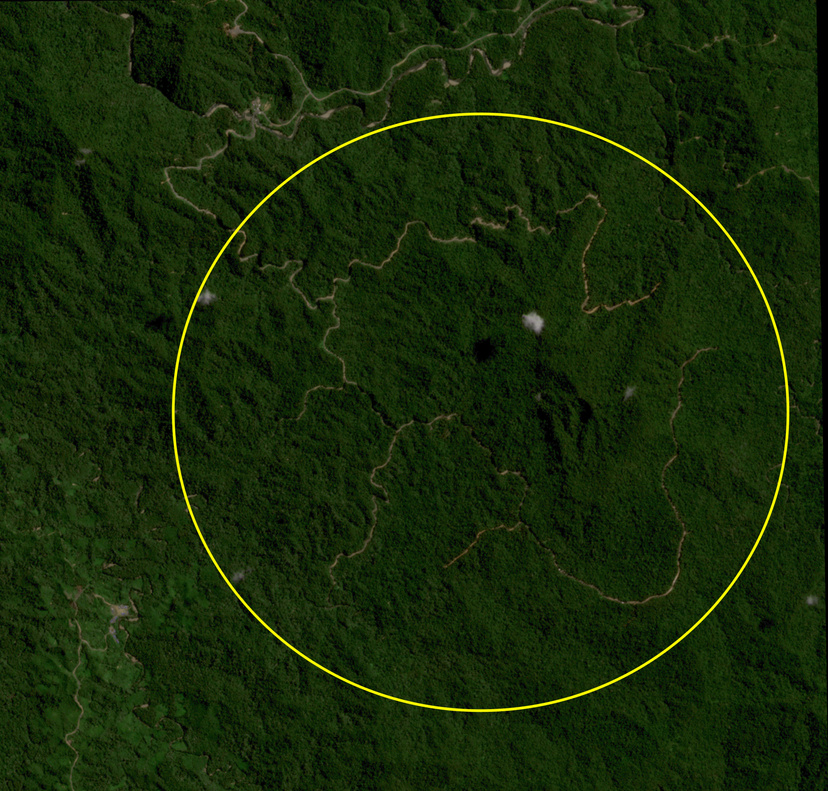
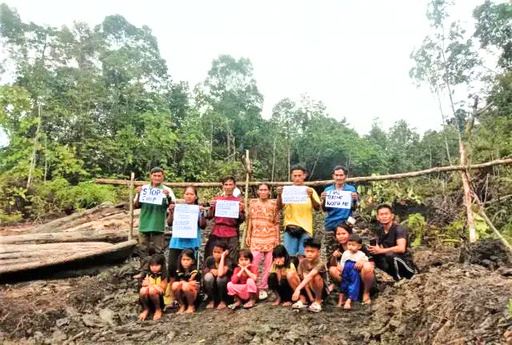
Long Pakan blockade
In response to media reports about Long Pakan’s resistance to logging, Samling Group’s COO James Ho Yam Kuan stated: “Samling did not carry out any logging operations in Long Pakan as the area is outside its concession area.”[44] This is directly refuted by evidence from Long Pakan community members, satellite images, and GPS coordinates taken of a logging road built into Long Pakan territory. Satellite imagery confirms the progression of the logging roads built by Samling
(see Figure 11).
The encroachment into the territory of Long Pakan in 2021 happened without the community’s agreement because Samling did not consider Long Pakan to be an affected community. GFS audits from 2019 and 2020 did not include Long Pakan in the list of affected communities.[45] Samling started negotiating with the community only after encroaching in their territory and the resulting complaints. Long Pakan was listed as a relevant village in the 2021 audit, after complaints were lodged.
The audit report states that Samling is “in the process of negotiation for the agreement” with Long Pakan.[46] Samling therefore failed to note the existence of an entire village prior to starting logging operations, clearly failing to do proper due diligence.
“Samling is denying our very existence. How can they claim that the territory of Long Pakan is not within their concession? We Penan might have no roads to our villages, but we are here and will stay.”
— Komeok Joe, KERUAN Organisation [47]
Ravenscourt FMU T/0294
Figure 12: Ravenscourt and overlapping and nearby community territories
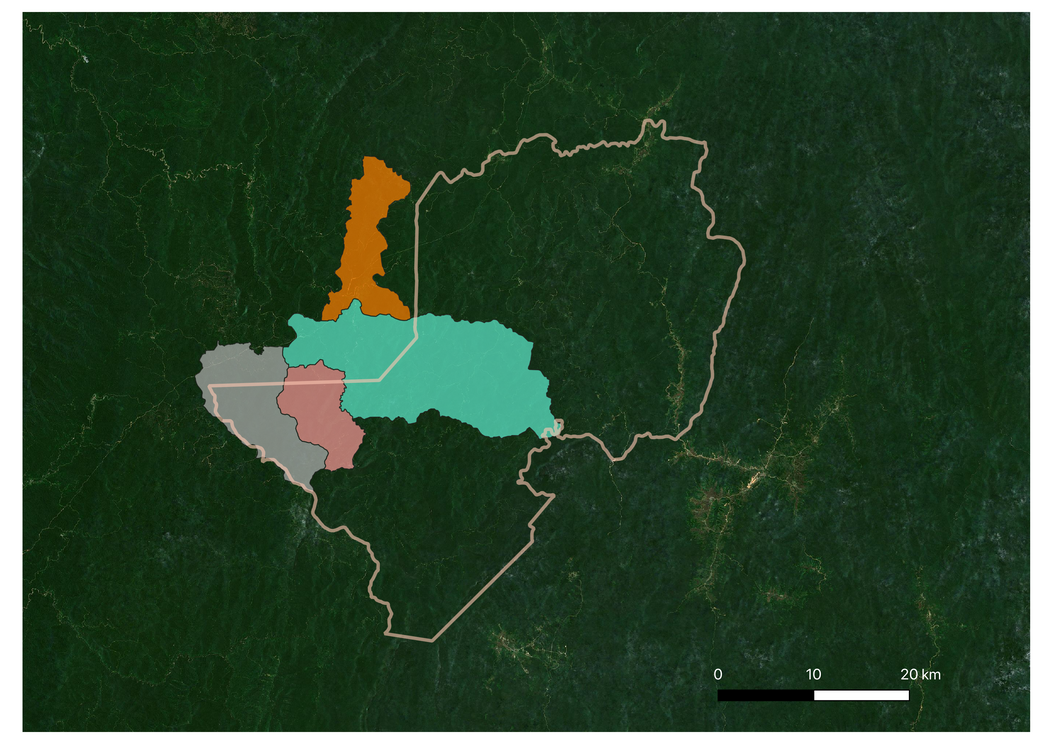

Ravenscourt FMU T/0294




Long Adang Land
Ba Gita Land
Ba Peresek Land
Long Tevenga Land
N
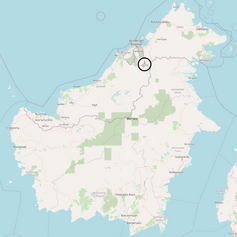
Ravenscourt has long been a contentious FMU with repeated land conflicts. In 2010, Norway's Council on Ethics for the Government Pension Fund Global (GPFG) found that:
"In the Council’s opinion, there can be little doubt that Samling has acted illegally in several ways in this concession, including carrying out re-entry logging for four years without the required Environmental Impact Assessment, logging in an approved National Park which has been excluded from the official licence area and where logging is prohibited, and illegally constructing roads and conducting land-based logging in areas of steep Class IV terrain where such logging normally is banned. The Council finds it highly probable that the logging activities performed in this concession are devastating to the forest and the local biodiversity, causing extensive soil erosion and reducing the area’s value as a national park."[48]
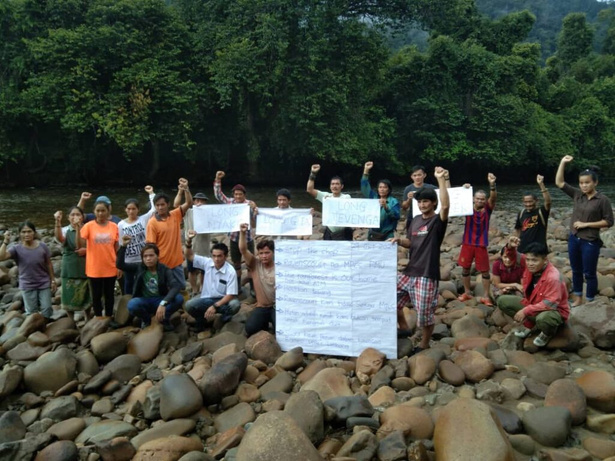
Penan protest against Ravenscourt FMU
The Ravenscourt FMU was first MTCS certified by SIRIM in 2018. Multiple major and minor non-conformities by Samling were found in the yearly SIRIM audit reports.
The 2020 SIRIM audit report shows that one CRC for the FMU had not yet been established. This had already been flagged as an issue during the 2019 audit, and was upgraded from a “minor non-conformity” to a “major non-conformity” in the 2020 audit.[49]
The 2021 SIRIM audit noted several non-conformities such as not adequately consulting communities, not informing them of conflict resolution procedures, and not providing communities with reports and information, including:
“Stakeholder’s[sic] consultation with the local communities confirmed that records of mechanism to resolve disputes was not made publicly accessible in the local language. There were no records of dialogue and consultation held with the community and other relevant stakeholders.”
Major non-conformity against indicator 3.3.2.[50]
SIRIM suspended MTCS certification for the Ravenscourt FMU on March 28, 2023 due to Samling’s failure to submit and implement effective corrective action regarding non-conformities. The certificate was subsequently withdrawn on July 11, 2023.
Long Tevenga, Ba Peresek, Long Adang, Long Gita
In the Ravenscourt FMU, the Penan communities of Long Tevenga, Ba Peresek, Long Adang, and Long Gita were not aware of the certification process, did not give consent for their territories to be logged, and documented their objection to logging. MTCS certification was granted in June 2018, but it was not until 2020 that some community members became aware of the certification process and reacted.
They expressed their objection to logging in a September 2020 letter to SIRIM. KERUAN Organisation sent the letter, stating that the communities of Long Tevenga, Ba Peresek, Long Adang and Long Gita, who are within or close to the border of the Ravenscourt FMU, were not aware that the area was certified for sustainable timber under the MTCS, and object to logging: “We, the Penan communities of Long Tevenga, Ba Peresek, Long Adang and
Long Gita, unanimously disagree with the MTCS Certificate for Samling Company for the area within our village territory as shown by our community map. In the area of our Penan village map, there are various interests such as traditional medicines, ipoh poison tree, saltlick, fruit tree, sago clumps, rattan, river where to find fish and animals on land, Living Land, we do not want everything to be destroyed.”[51]
A map from Samling’s Forest Management Plan (Figure 13, top) leaves the Penan communities off the map entirely. It also does not show any Community Use Zone (CUZ) marked for the Penan. These are areas within the forest that are set aside for the use of local communities for their livelihoods and traditional activities. Under FDS procedure, and therefore under MTCS, there is a requirement to identify and demarcate CUZs in the Forest Management Plans of FMUs.
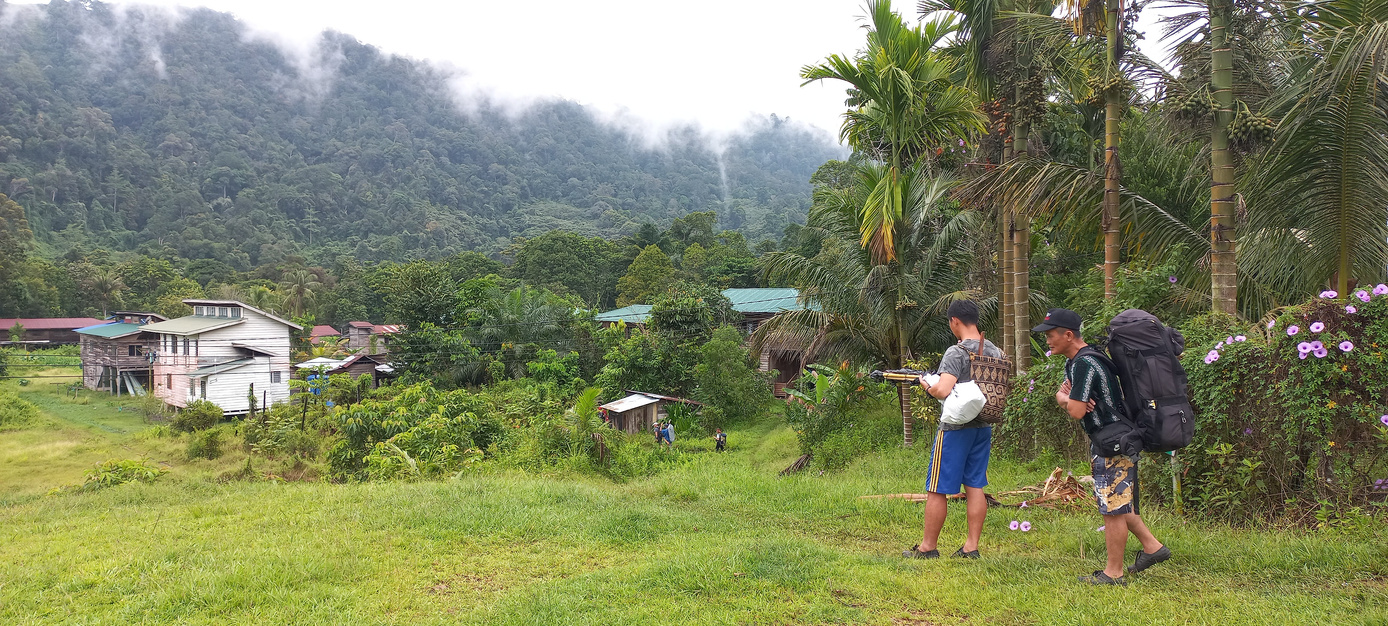
Long Adang
Figure 13: Analysis of Samling map vs Penan proposal
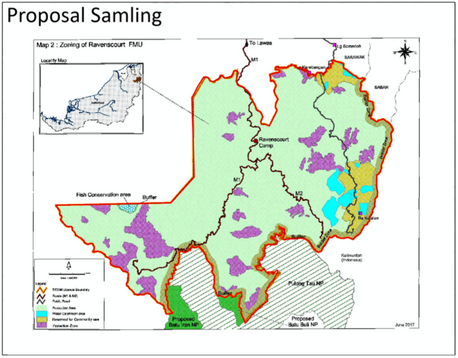
Map from Samling’s Forest Management Plan from June 2017 does not include any Penan communities or CUZs.
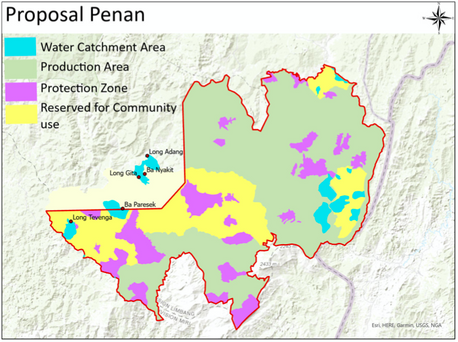
Map showing where Penan communities, protected forest, and CUZs should be in relation to the Ravenscourt FMU according to Penan communities.
The communities learned of the Ravenscourt FMU and MTCS certification in the context of its ongoing re-evaluation. The village received a letter from Samling and SIRIM in July 2020 requesting a meeting, but the purpose of the meeting was unclear. The communities did not attend this meeting, explaining: “since we did
not fully understand the purpose of the meeting, we did not go. Secondly, we are very worried about the COVID-19 pandemic.” This is not uncommon, as communities are concerned that agreeing to a meeting could be misconstrued as consent for logging.
Suling Selaan FMU
T/0412 and T/0411
Figure 14: Suling Selaan FMU and overlapping and nearby community territories
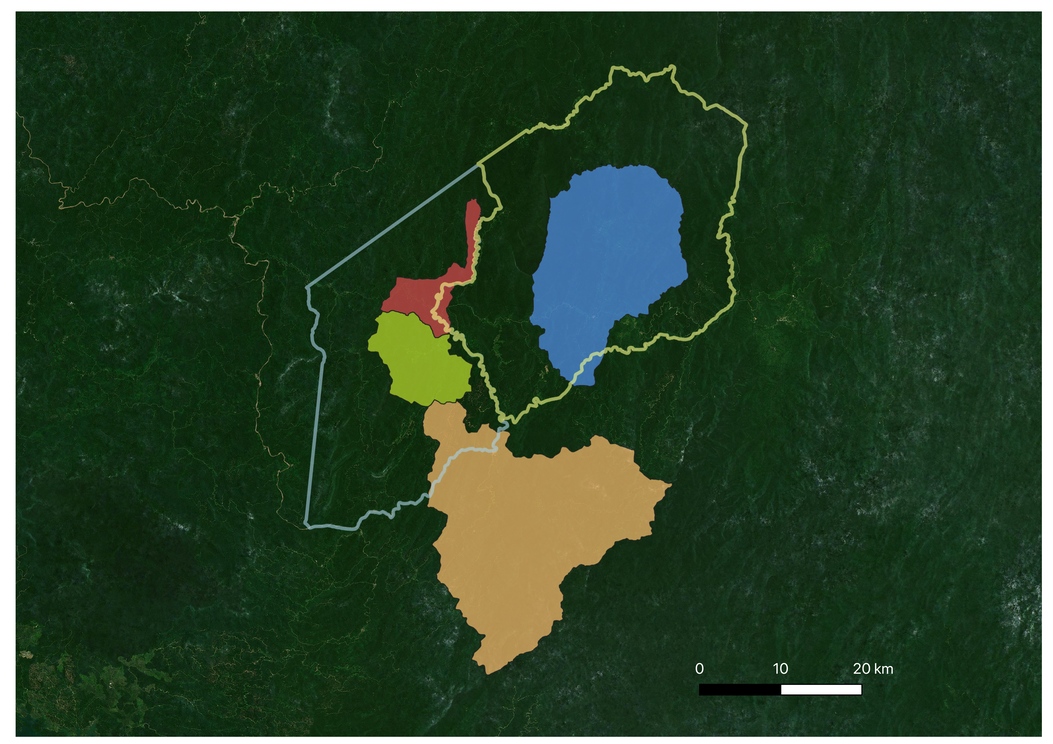

Suling Selaan FMU T/0411 & T/0412


Long Lamam Land
Long Ajeng/Long Murung Land


Long Moh Land
Jamok Land
N
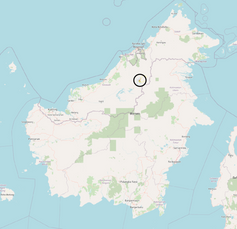
The Suling Selaan FMU contains two logging concessions: T/0412 and T/0411. The Penan have a long history of resisting logging in this area. When Samling entered the area around the village of Long Ajeng in the early 1990s, over 1,000 Penan participated in a roadblock that prevented Samling from building its main timber road into the area. The Penan maintained the blockade for several months before it was destroyed by the government’s special police unit and the military on September 28th, 1993. More than 200 people were injured and three Penan died as the result of police violence.[52]
In 2004, T/0412 was the first concession to be certified under MTCS in Sarawak. Following the certification, many headmen in the area, including Bilong Oyau, the Headman of Long Sait and a leader for the Penan communities in the area, sent a letter to MTCC on January 25, 2005, criticizing the lack of consultation with the local communities and requesting MTCC to revoke the MTCS certification.[53] This MTCS certificate expired in 2009.[54]
At an unknown time, concession T/0411 was certified for legality under STLVS. A GFS audit from 2019 confirmed that Samling had not conducted social impact assessments for all villages and that the company had no agreement with the three villages of Long Ajeng, Long Lamam and Ba Data Bila:
“Samling Plywood (Baramas) Sdn. Bhd. has not conducted a formal Social Assessment separate to the EIA that included an evaluation of 7 of the longhouses associated with the T/0411 licensed area. The Kenyah and Penan tribe settles [sic] the region. The Penan villages of Ba’ Ajeng, Long Lamam, and Data Bila were not visited under the Social Assessment to develop an agreement. Since Samling Plywood (Baramas) Sdn. Bhd. has not established a formal agreement with the 3 mentioned Penan villages, no logging operations are conducted in the areas claimed by the longhouse communities.”[55]
In August 2020, Penan leaders and KERUAN Organisation sent further letters to SIRIM requesting information about the certification and indicating their rejection of logging on their territory.
It appears that the legality certification under STLVS was terminated at some point, as Samling seems to be transitioning to the legally required MTCS certification. Current assessments undertaken in the area indicate that MTCS certification for this FMU is likely underway.
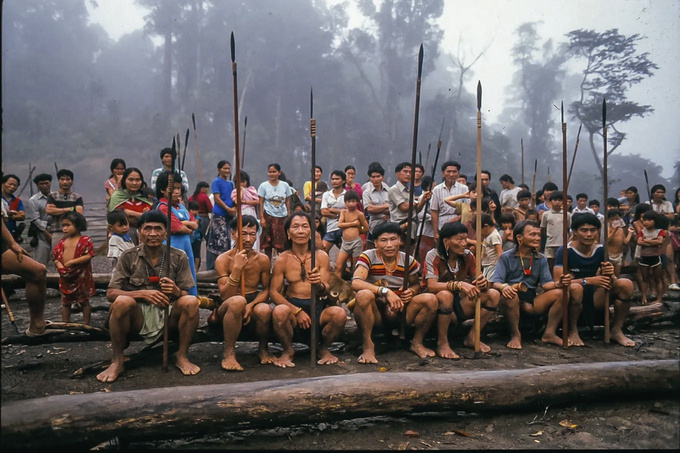
Historical Image of Long Ajeng protest 1992
Long Ajeng, Long Lamam, and Long Murung
On February 7 and 9, 2021, Penan community leaders of Long Ajeng and neighboring Penan villages of Long Lamam and Long Murung confronted Samling workers about the logging they had discovered in their territory. Their territories are within the UBFA.
These communities then lodged a police report about the logging activities on March 5, 2021. A blockade was erected on September 9, 2021, to stop Samling extracting timber.[56] When Samling encroached further and entered the proposed core protection zone of the UBFA in May and June 2022 (see Figures 15-17), the communities filed another police report, consulted their lawyer and alerted supporting NGOs. The logging was taking place in a culturally and ecologically sensitive area called the Batu Siman mountains.
In July 2022, just before the communities started rebuilding their blockades, Samling withdrew their machinery from the area.[57]
Figure 15: Analysis of logging
road encroachment
Upper Baram Forest Area
Agricultural zone
Buffer zone
Core zone
Logging roads until April 2022
New logging roads May-July 2022
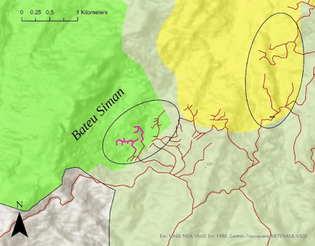
Figure 16: UBFA, Samling FMUs and community territories
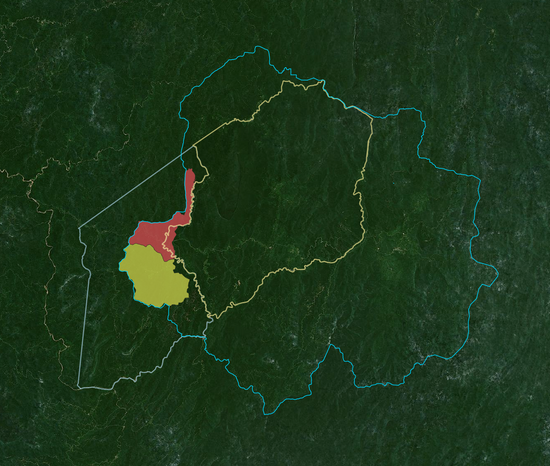


Suling Selaan FMU T/0411 & T/0412
Long Lamam Land

Long Ajeng/Long Murung Land

Upper Baram Forest Area
Area of Interest
N
Figure 17: Encroachment near the Batu Siman mountains
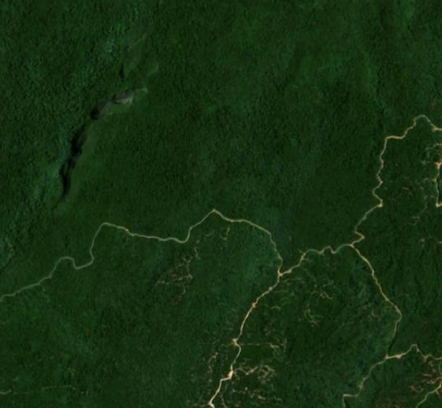
Before May 2022
Area of Interest
Batu Siman
After May 2022
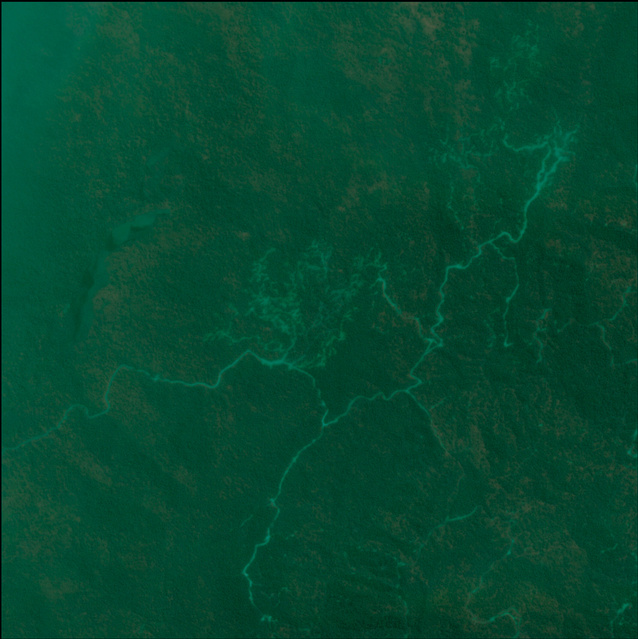
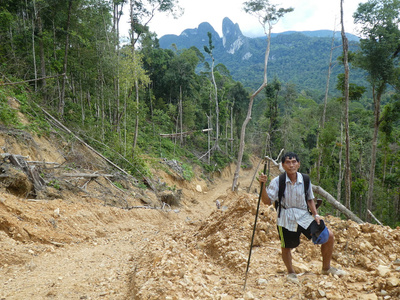
Jawa Nyipa showing the impacts of the logging on his community’s territory, July 2022
“We never gave Samling an entry authorisation. Many times, we asked them to stop working in our area. Samling did not listen to a single word from us and has been taking timber from our land up until now. Now we ask them one last time to stop and we want compensation for the damage they have done on our land.”
— Jawa Nyipa, headman of Long Ajeng [58]
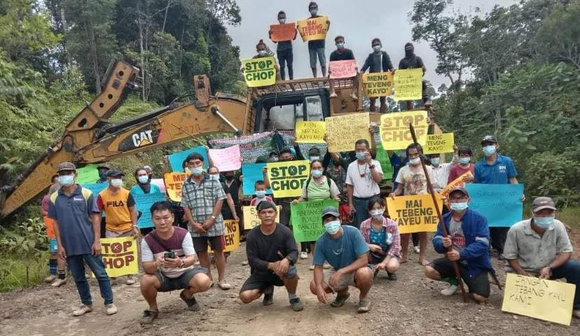
Penan communities protesting Samling logging on their territories, September 2021
Long Moh
Figure 18: Long Moh territory overlapping with Gerenai and Suling Selaan FMUs
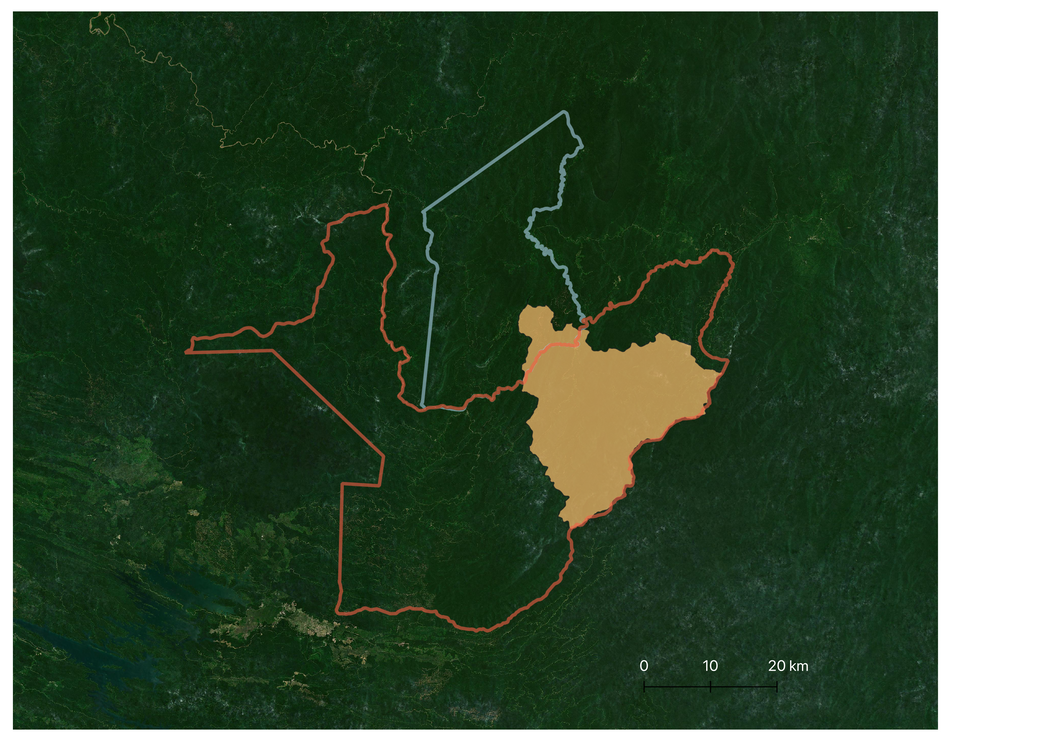



Gerenai T/0413 FMU
Suling Selaan FMU T/0411
Long Moh Land
N
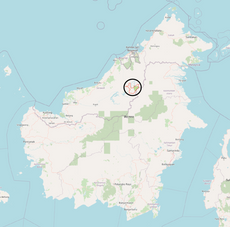
The Kenyah community of Long Moh also experienced logging without their consent, even after being consulted by Samling. Long Moh has territory in two FMUs operated by Samling: the Gerenai FMU and the Suling Selaan FMU.
SIRIM’s 2022 audit report of the Gerenai FMU substantiates the existence of “native issues” with Long Moh, and reports that these issues were not handled according to the Procedure for Conflict Resolution. The GFS audit for concession T/0411 (Suling Selaan FMU) from 2019 identifies a “lack of agreement” with the community of Long Moh as a “minor gap.”[59]*
The Bekia area is a culturally sensitive site within the territory of Long Moh and the UBFA. It is also within the boundaries of the Suling Selaan FMU and was logged by Samling without community consent.
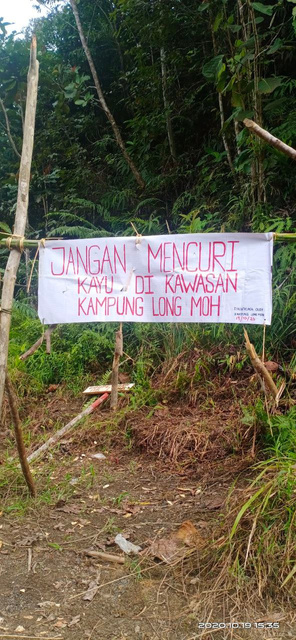
Sign that reads ‘Do not steal wood
from the Long Moh village area’
*Compliance is defined when all applicable criteria are observed to be compliant. A Minor Gap to any indicator does not constitute non-compliance to a criterion. “A major gap” to any applicable indicator does reflect non-compliance to a criterion. Compliance for a criterion where multiple minor gaps are identified in indicators under the criterion may reflect non-compliance to the criterion.
Figure 19: Analysis of logging activities In Long Moh 2017-2021
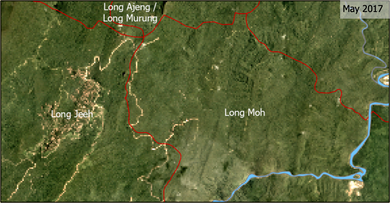
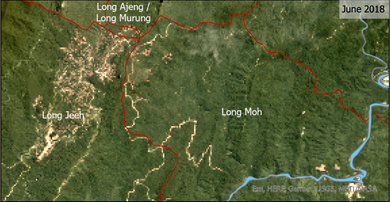
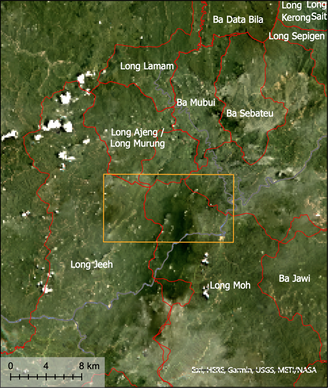
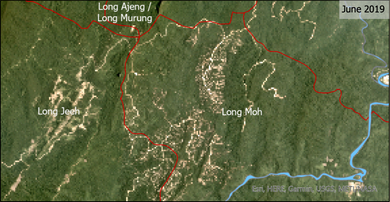
Communities
River
Extent Indicator
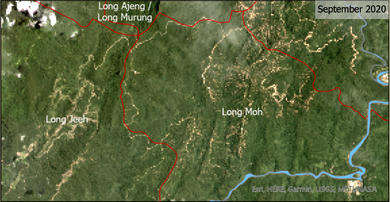
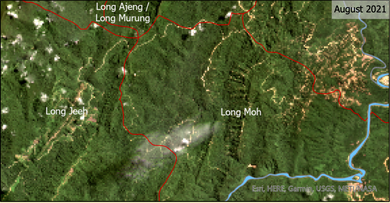
Satellite imagery between 2017 and 2021 shows a web of logging roads and logging activities creeping into the traditional territory of Long Moh (see Figure 19). In July 2020, Long Moh community members discovered that Samling had encroached into the Bekia, Ampai, and Seru’en areas. They sent a letter to Samling in September 2020, demanding compensation and action. After no response, they sent another letter to Samling in February 2021, this time signed by 300 community members and CC’d to MTCC, SIRIM and Forest Department Sarawak.[60]
The letter states that during a meeting between the residents of Long Moh and representatives from Samling on June 18, 2018, “Mr. Fam Chee Kiong promised that [Samling Timber] would not enter the Bekia, Ampai, and Seru'en areas without holding any consultation with the residents of Long Moh.”[61] However, based on the community’s ground surveys, “it is true that the entire forest and NCR land in these areas have been encroached and destroyed by Samling Timber.”[62] The letter also states that the logging camp manager, Mr. Lai Kam Wen, had agreed to compensate Long Moh for this encroachment during a meeting held on September 24, 2020.
Logging trucks in the territory
of Long Moh, October 2020
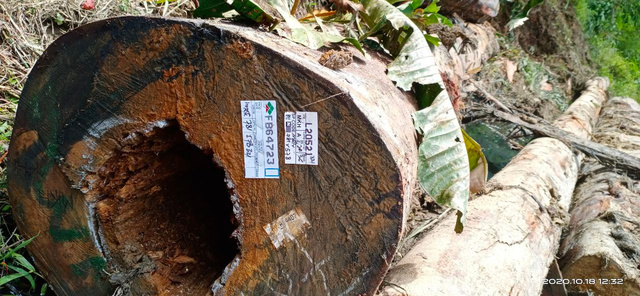
Trees from the territory of Long Moh stamped by Samling, October 2020
In response, Samling representatives sent a letter to Long Moh claiming that they never agreed to not carry out logging in the Bekia, Ampai, and Seruen areas. Samling’s letter not only denies the agreement to not log certain areas, it also threatens legal action against the community. As of publication, Long Moh has not received compensation from Samling.
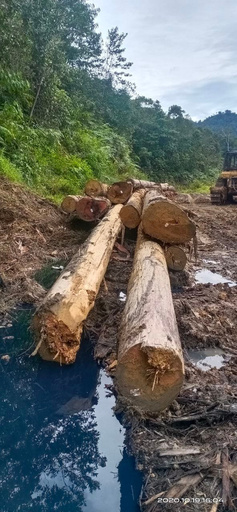
Samling’s imprudent action will not only destroy our primary jungle but also will wipe out our history. An area which is considered to be sacred and holds our ancestors’ belongings has signs of trespassing and destruction.”
— William Tinggang, Long Moh.[63]
Photos of unwanted logging documented
by Long Moh community, October 2020
Long Moh community protesting Samling
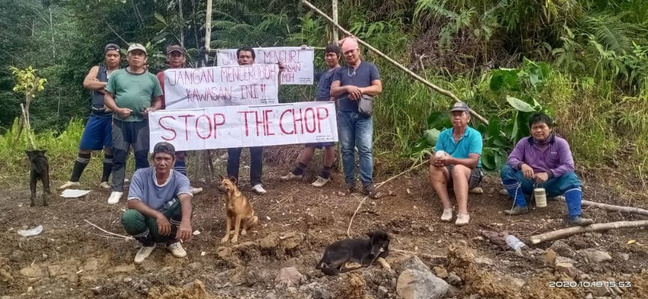
Legal Intimidation
Beyond the documented conflicts with communities, Samling’s legal threats and demands against Indigenous communities and a small grassroots organization have had an intimidatory effect and have concerned many onlookers in Sarawak and internationally.
Samling has sent letters to communities threatening legal action and has resorted to suing a local NGO for reporting opposition to logging. Some argue that this strategy attempts to silence community concerns and puts at risk the right of civil society to publish or report on those concerns as a matter of public interest.[64]
Indigenous Kenyah and Penan communities in the Baram watershed opposing logging on their territories tried to establish a dialogue with the concession holders and relevant government authorities.
When those attempts failed, they turned to two local non-governmental organizations (NGOs), SAVE Rivers and KERUAN Organisation, for support. These organizations have a long history of working with Indigenous communities and are themselves managed and led by Indigenous people from Northern Sarawak. Penan communities of the Limbang watershed also turned to these organizations after learning that logging concessions overlapped with their native territories.
SAVE Rivers and KERUAN Organisation helped communities reach out to the relevant government agencies and Samling personnel. When all communication channels were exhausted, and after nothing had changed on the ground, the NGOs began publishing reports in the public domain about Indigenous communities’ grievances regarding Samling’s logging operations.
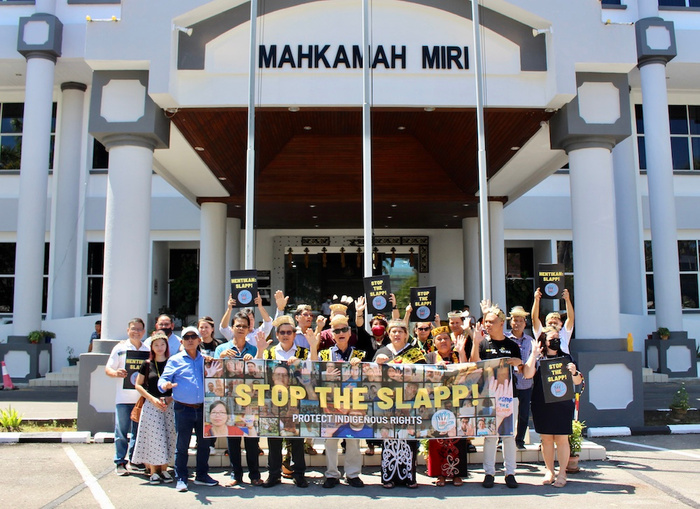
Stop the SLAPP protest outside Miri High Court
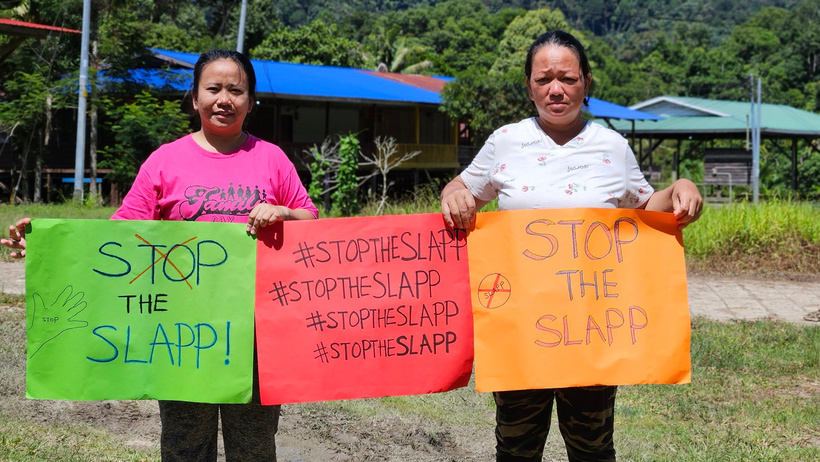
Stop The SLAPP supporters in Long Semiyang
In July 2021, Samling Plywood Miri Sendirian Berhad and Samling Plywood Baramas Sendirian Berhad filed a defamation lawsuit against SAVE Rivers for publishing those reports.[65]
The United Nations Special Rapporteur on Human Rights Defenders, the United Nations Special Rapporteur on the Rights of Indigenous Peoples, and the Business and Human Rights Resource Centre have recognized that this suit may be classified as Strategic Lawsuit Against Public Participation (SLAPP).[66] SLAPP suits are intentionally designed to avoid accountability by preventing public dialogue and intimidating local resistance.[67]
Samling’s Statement of Claim for the lawsuit demanded an apology, an injunction stopping SAVE Rivers from reporting community claims and damages in the sum of RM 5 million, or 1.1 million US dollars. This would have bankrupted SAVE Rivers and its directors.
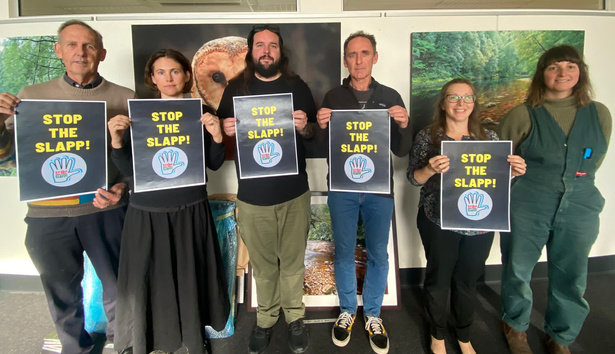
Stop The SLAPP supporters in Australia
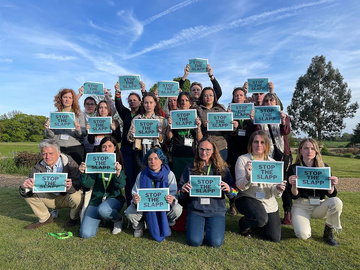
Stop The SLAPP supporters in the United Kingdom
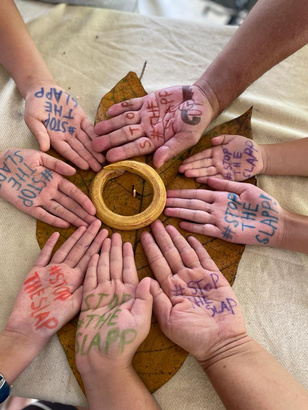
Stop The SLAPP supporters In Sarawak
Samling also sent letters to communities threatening legal action. These letters were in response to letters sent by the communities expressing their dissatisfaction with the consultation process or opposition to logging operations on their land. In a letter dated March 26, 2021, to the communities of Long Moh, Samling COO James Ho Yam Kuan wrote:
“[T]here is absolutely no basis for your claim for compensation for any alleged encroachment, damage and/or destruction. We reserve our right to bring legal action.”[68]
A letter sent from James Ho Yam Kuan regarding the Penan communities in the Ravenscourt FMU to on April 14, 2021, uses similar language, as does a letter regarding the Penan communities of Long Ajeng, Long Murum, and Long Lamam, sent by Samling CEO Lawrence Chia Kee Loong on April 9, 2021.[69]
These letters illustrate Samling’s approach to community grievances, which is one of denial and legal threat rather than engagement and proper investigation of complaints.
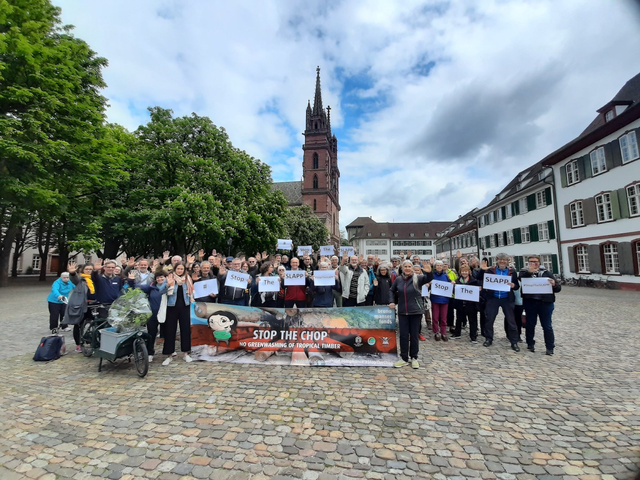
Stop The SLAPP protest In Switzerland
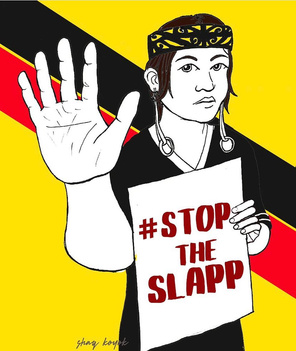
Support poster by local artist
Shaq Koyok
The SLAPP suit against SAVE Rivers, although eventually withdrawn before trial, necessitated the diversion of significant organizational resources by a small community-based NGO, and time and effort by its staff and board members towards preparation for court proceedings. But, rather than having a chilling effect on community campaigns, Samling’s legal action against SAVE Rivers sparked an international solidarity movement. This included extensive media coverage and a petition with more than 30,000 signatures.[70] More than 160 local and international organizations joined the call for Samling to drop the suit, and more than 8,000 people sent emails expressing their concern to Samling’s CEO.[71]
In August 2023, Samling CEO Chia Kee Loong filed a police report against SAVE Rivers and its board members.[72] In the report, he accused SAVE Rivers of spamming his email address with emails petitioning him to drop the suit against SAVE Rivers. These emails were not sent by SAVE Rivers, but by international supporters in opposition of the SLAPP suit.
SAVE Rivers directors and lawyer called to the police station
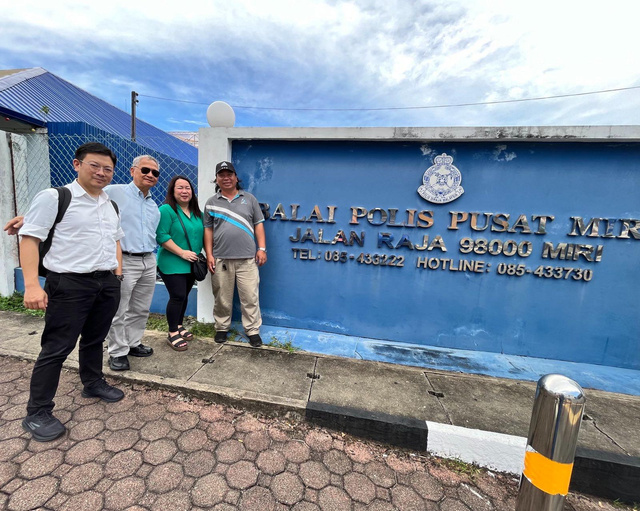
Stop The SLAPP protest at London Zoo
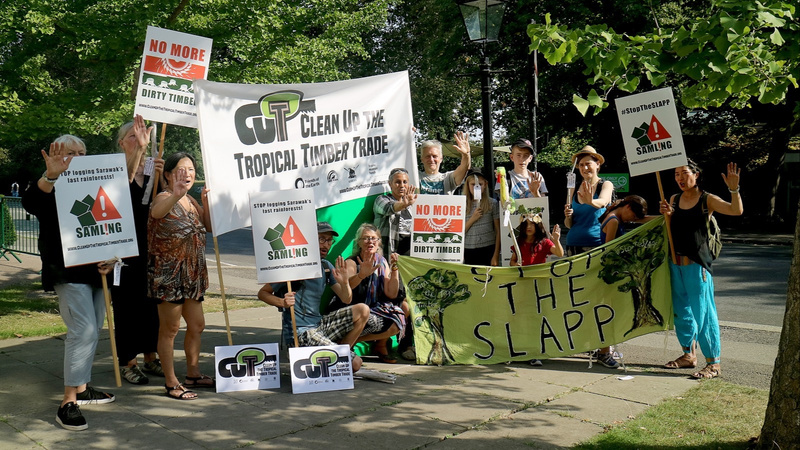
The police report also accused SAVE Rivers of disturbing the peace during court proceedings in May 2023. These proceedings were originally scheduled to be the trial dates for the defamation suit against SAVE Rivers, however, a few days before the trial, the trial was delayed and instead, lawyers for both sides met at the court to determine dates for the rescheduled trial. During that meeting, supporters of SAVE Rivers gathered at the court building and performed traditional song and dance in a peaceful and respectful gathering. It was this gathering that was the subject of the Samling CEO’s police report.
After three adjournments, final trial dates were set to commence on September 18, 2023. On the morning of September 18, Samling formally withdrew the suit, releasing a joint statement with SAVE Rivers.[73]
None of the allegedly defamatory content was edited or taken down, and Samling received no damages or apology from SAVE Rivers. Communities understandably viewed this withdrawal as a major win for forest defenders.
“This is a huge victory for SAVE Rivers and the communities they support, and a humiliating backdown for Samling. SAVE Rivers and the communities stood and will continue to stand in solidarity with each other. No one thought that we could win against such a powerful company, but we proved everyone wrong.”
— Boyce Ngau, vice-president of GCRAC commenting on Samling’s withdrawal [74]
Documented Unsustainable Environmental Practices
Photograph of Samling logging operations taken by Long Moh community in October 2020
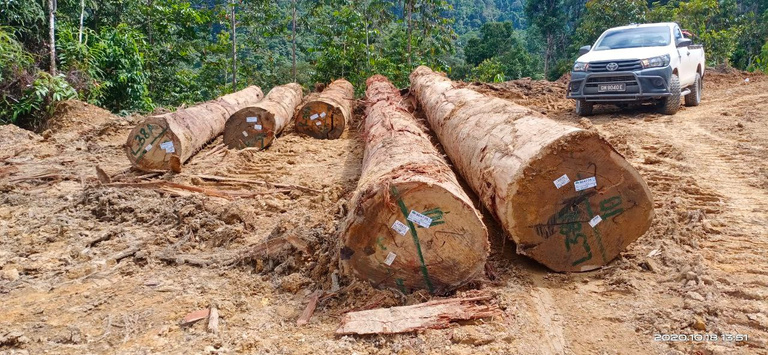
Timber sourced from Samling should not carry the “sustainable” label because of the numerous Indigenous rights concerns listed above. However, even without taking evidence from a human rights perspective into account, importer countries and international buyers should take note of Samling’s questionable environmental record - a record which disproves their claim to the “sustainable” label.
This report has already covered recent logging in the UBFA, an important conservation zone and wildlife corridor. Samling has also logged a proposed wildlife sanctuary, leveled forests in contravention of forest conversion rules and contributed to a significant increase in flooding risk.
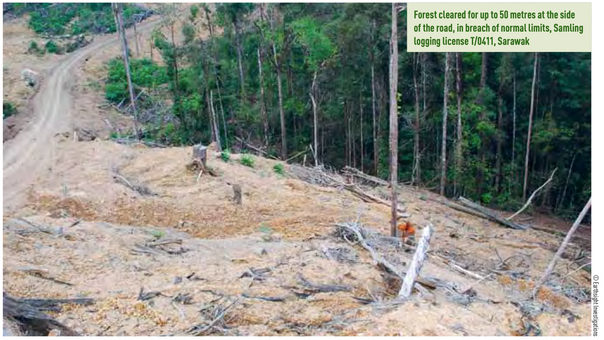
Forest cleared by Samling up to 50 metres at the side of the road in breach of normal limits in Suling Selaan FMU, as reported by Earthsight in 2010
Sungai Moh Wildlife Sanctuary
Samling logged an area that was originally slated to become a Wildlife Sanctuary in the Sungai Moh area.
The Sarawak government initially proposed the Sungai Moh Wildlife Sanctuary for an area in the northeastern part of what is today the Gerenai FMU, according to a map from FDS from 2010 (see Figure 20). This area is also claimed by the local Penan community of Ba Jawi. At that time, the forest in the proposed protection area was still intact and there were no logging activities taking place
(see Figure 22).
Samling first began to construct a logging road into the proposed Sungai Moh Wildlife Sanctuary area in September 2010. By February 2012, Samling was logging intensively inside the area. By 2014, most of the wood resources inside the area had been exploited (see Figure 22).
According to a map of Samling’s Forest Management Plan for the Gerenai FMU from 2019 (see Figure 21), the location of the Sungai Moh Wildlife Sanctuary was later moved to a region southwest of the initial location, now on Long Moh land. Samling also built roads encroaching into the area of the new sanctuary location (see Figures 23 and 24).
Figure 20: Historical location of
Sungai Moh Wildlife Sanctuary
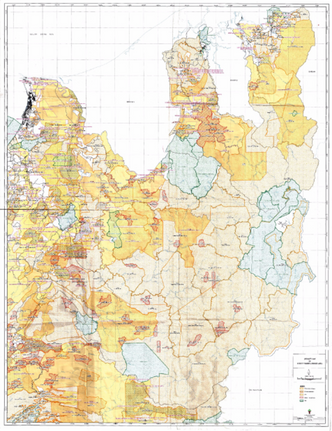
Figure 21: New location of Sungai Moh Wildlife Sanctuary sourced from Samling Forest Management Plan
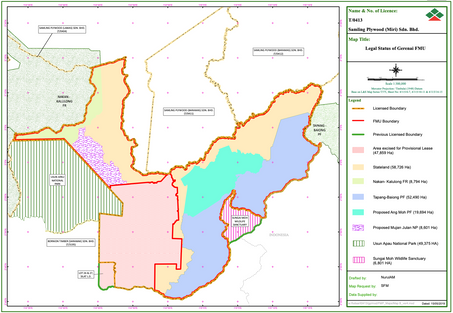
Figure 22: Progression of logging in the proposed Sungai Moh Wildlife Sanctuary between 2010-2014
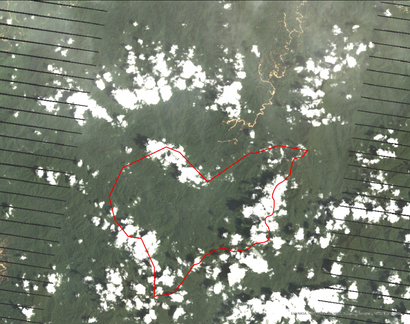
Satellite image shows unlogged forest in February 2010, in proposed Sungai Moh Wildlife Sanctuary.
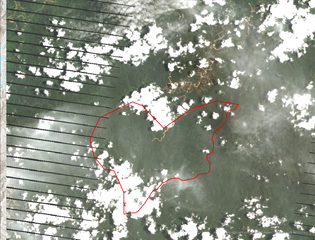
Logging roads start to develop in September, 2010.
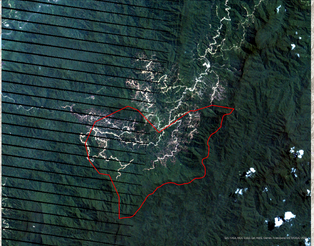
Logging activities intensify in February, 2012.
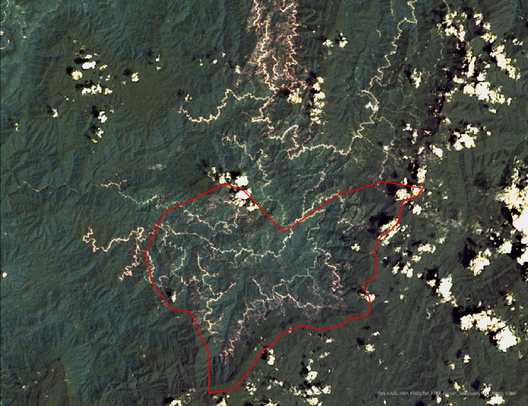
By February 2014 Samling has logged the entire area of the proposed Sungai Moh Wildlife Sanctuary.
Figure 23: Analysis showing encroachment into both old (blue) and new (orange) locations of
the sanctuary
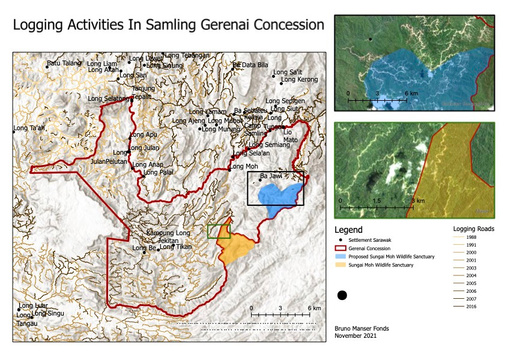
Figure 24: Analysis showing encroachment into the new location of the sanctuary
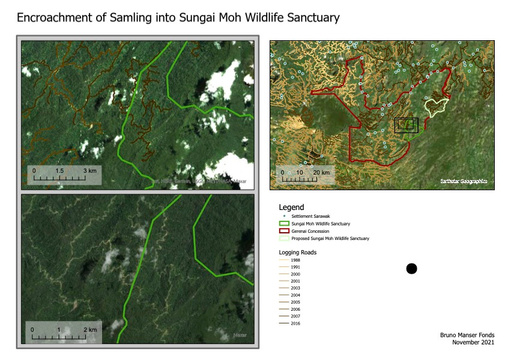
Forest Conversion
Forest conversion (the clearing of forests for other purposes, usually agriculture) of more than 5% of the total area of an FMU is prohibited in the MTCS scheme.
However, in the Gerenai FMU approximately one quarter (47,859 hectares) of the FMU is designated as a plantation. This means it has recently been, or is in the process of, being clearcut to establish oil palm plantations. This is referred to in Samling’s Forest Management Plan for the Gerenai FMU as “[an] area designated as provisional leases for agricultural development… will at some time be excised from the FTL [Forest Timber License]”.[75]
The excised area of 47,859 hectares is far in excess of the allowed 5% limit. To resolve this non-compliance, SIRIM has presumably accepted the exclusion of the Provisional Lease area from the scope of certification, even though the unit of certification under MTCS is the full FMU.[76] The main FMU Camp, Gerenai Camp, lies within the excised area.
Figure 25 shows that the area has been logged intensively since 2018, predominantly by Samling, but also by some other companies, most likely subcontractors. The images indicate the clearing of forest to establish a non-forest zone, in this case agricultural plantations.
MTCS requires that “conversion from natural forest… shall not include any High Conservation Value areas”.[77] If an HCV assessment was conducted prior to logging, it is not available publicly. The area being converted contained significant intact, unlogged natural forests and provided significant resources for local communities and valuable habitat for wildlife. It is highly likely that this area contained multiple High Conservation Values.
Oil palm plantation in Sarawak
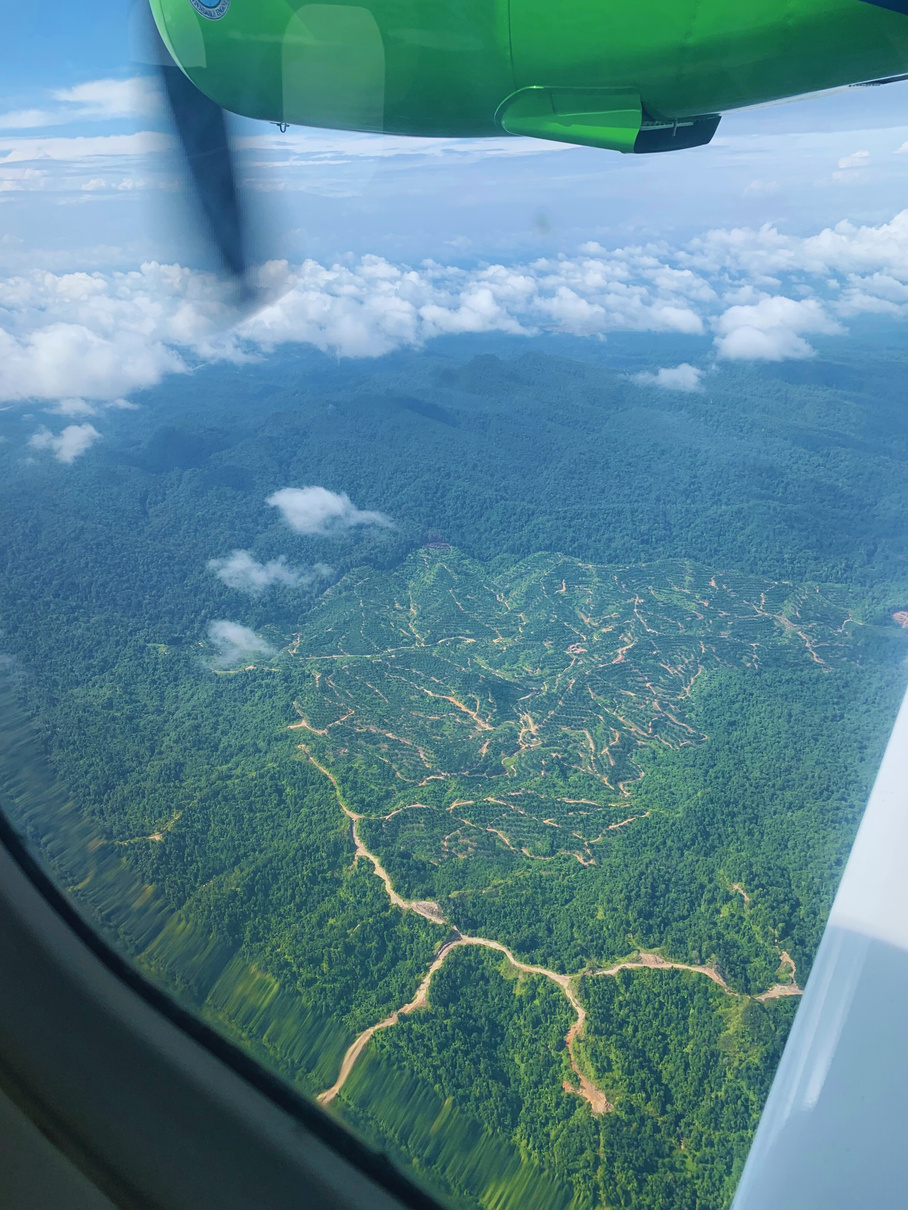
Figure 25: Extensive deforestation in excised area of Gerenai FMU
Samling
Excised Area Gerenai
Year of deforestation:
No deforestation/before year 2000
2000-2006
2007-2012
2018-2019
2020-2021
N
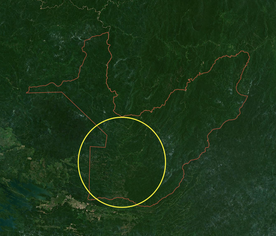
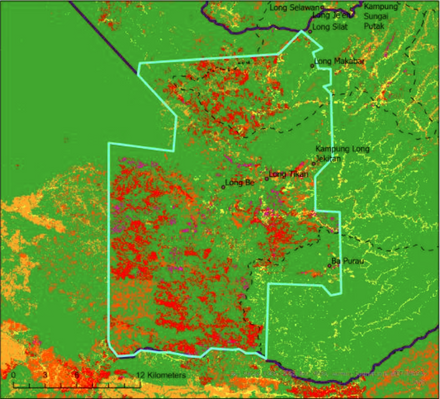
It is now mandatory for all FMUs in Sarawak to be certified under MTCS or FSC. The conversion of a large area of intact forest into non-forest use is a gross violation under each scheme, and would disqualify the FMU from certification. That this FMU has been certified by the MTCS, after audits conducted by SIRIM, illustrates that the enforcement of the standards is defective.
The excised area will be converted into oil palm plantations (see Figure 26). It has been divided into 13 Provisional Leases for oil palm plantations that have been given to companies with strong political ties, including four companies that are the land clearing operators for Samling Plywood (Miri).[78]*
In Malaysia, the Malaysian Sustainable Palm Oil (MSPO) Certification Scheme is now mandatory. According to MSPO, establishment of new plantations must not involve any conversion of natural forest, protected areas or High Conservation Value areas after December 31, 2019, and companies must complete EIA, SIA and HCV assessments prior to the development of the land.[79] The palm oil from this excised area will therefore fail to meet MSPO requirements. It will also fail to meet the standards of the Roundtable on Sustainable Palm Oil (RSPO), and the new EU Deforestation Regulation (EUDR) requiring products to be deforestation free.**
*Three of the 13 Provisional Leases fall outside of the FMU area.
**The EUDR requires companies trading in cattle, cocoa, coffee, oil palm, rubber, soya and wood, as well as products derived from these commodities, to ensure the goods do not result from recent (post 31 December 2020) deforestation, forest degradation or breaches of local environmental and social laws.
The excised area of the Gerenai FMU presents two significant conundrums: the forest conversion excludes any timber from the area being sold under MTCS or FSC, however certification under these schemes is mandatory for all FMUs.
Neither does the palm oil from the area qualify to be sold under MSPO, however, the MSPO is mandatory for all oil palm plantations.
This illustrates the contradictory nature of forest management in Sarawak. FDS is responsible for tendering the logging and oil palm concessions. It has also initiated the requirement for FMUs to obtain forest certification. The government makes commitments to protecting their forests and establishes policies intended to sustainably manage forest resources, while simultaneously permitting gross violations of these commitments and policies.
Figure 26: Issued Provisional Leases showing the names of 13 different companies with a total land bank of just over 50,000 hectares, primarily within the Gerenai FMU. Map obtained from the Land and Survey office.
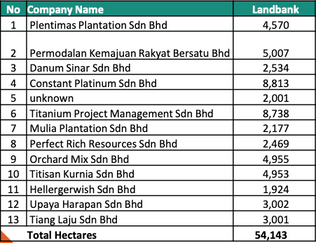
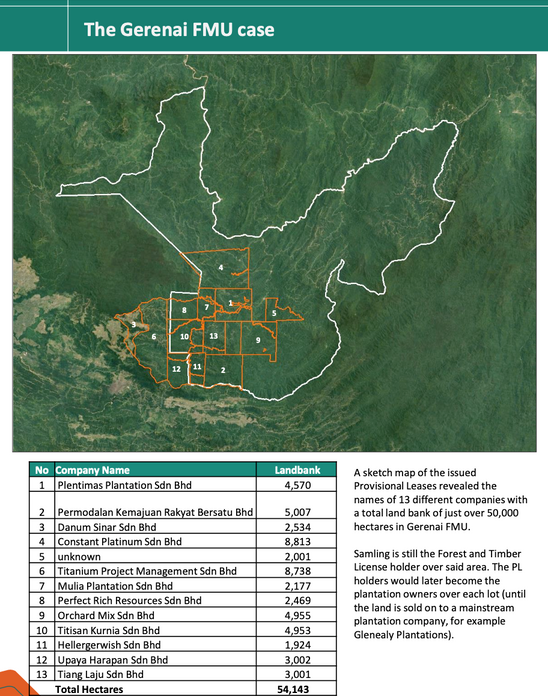
Plantations
Samling also manages a number of Licenses for Planted Forest (LPFs) in Sarawak. These LPFs are often managed by one of its subsidiaries, Samling Reforestation (Bintulu) Sendirian Berhad. These “Industrial Tree Plantations” are essentially tree farms, where natural forest areas have been cleared for replanting with fast-growing, often non-native tree species that are cultivated and harvested for sale as timber products. This practice greatly harms forest health and biodiversity. It is not reforestation in the sense of restoring original biodiversity, but instead the clearing of natural forest to make way for further commercial forestry in a manner which actively prevents native species from recovering. Samling recently received a permit for a pilot carbon trading initiative in of it its LPFs.
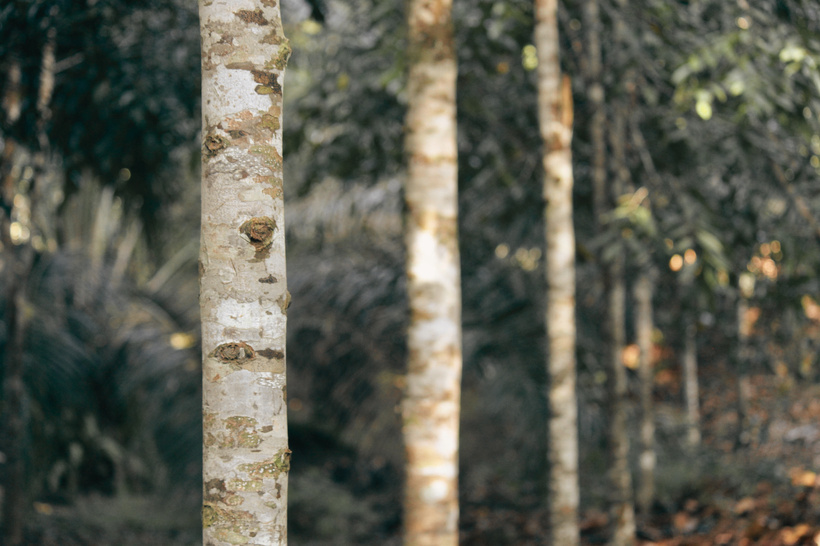
Figure 27: Samling's LPFs in Sarawak according to available data
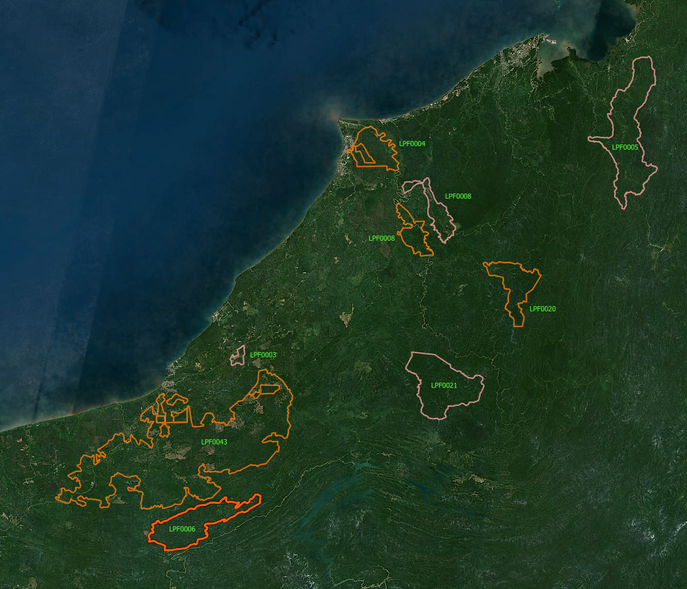
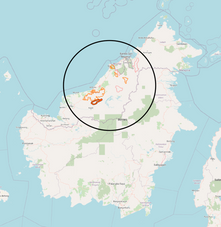
Flooding
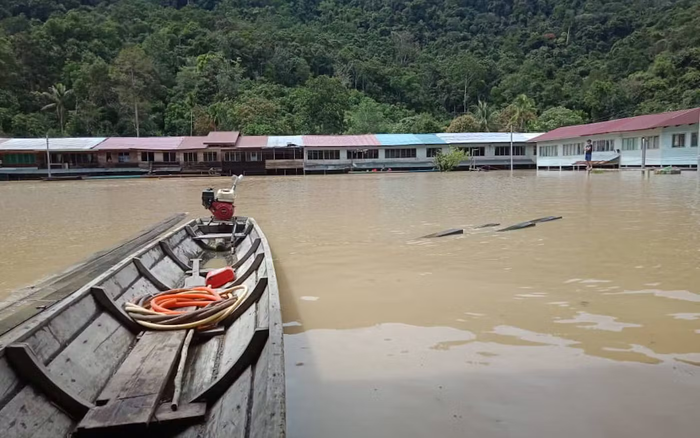
Flooding at Long Tungan, early 2021
Samling is the main concession holder in the Baram watershed. According to a 2023 study of the Baram area: “Since 2008, flooding incidents have increased steadily with compounded frequency and extremity annually.”[80] The same study found that overlogging in the Upper Baram was a contributing factor to this increase.
At least six villages in the Lower and Upper Baram watershed have been significantly affected by these flooding disasters, with structural loss and damages, adverse health impacts, personal loss and grievances, social disruptions and financial burdens.
Deforestation and logging are often linked to increased flooding. Healthy forests filter water, reduce erosion, regulate rainfall, recharge
groundwater tables and buffer against the impacts of droughts and floods.[81] When watersheds are unable to properly filter water and regulate water supply, erosion, flood and landslide risks increase.
A 2014 EIA conducted for the Gerenai FMU confirms that impacts during the felling stage include runoff increase, which “may lead to flash flooding during intense rainfall” and that “the risk of flash flooding in the downstream area will increase.”[82] Communities also allege that, in contravention of forestry regulations, Samling extracted timber from riverbanks, and have provided photographs of such areas. Such extraction would negatively impact the ability of the watershed to regulate flooding.
Documented Shortcomings, Disparities and Factual Errors in Impact Assessments
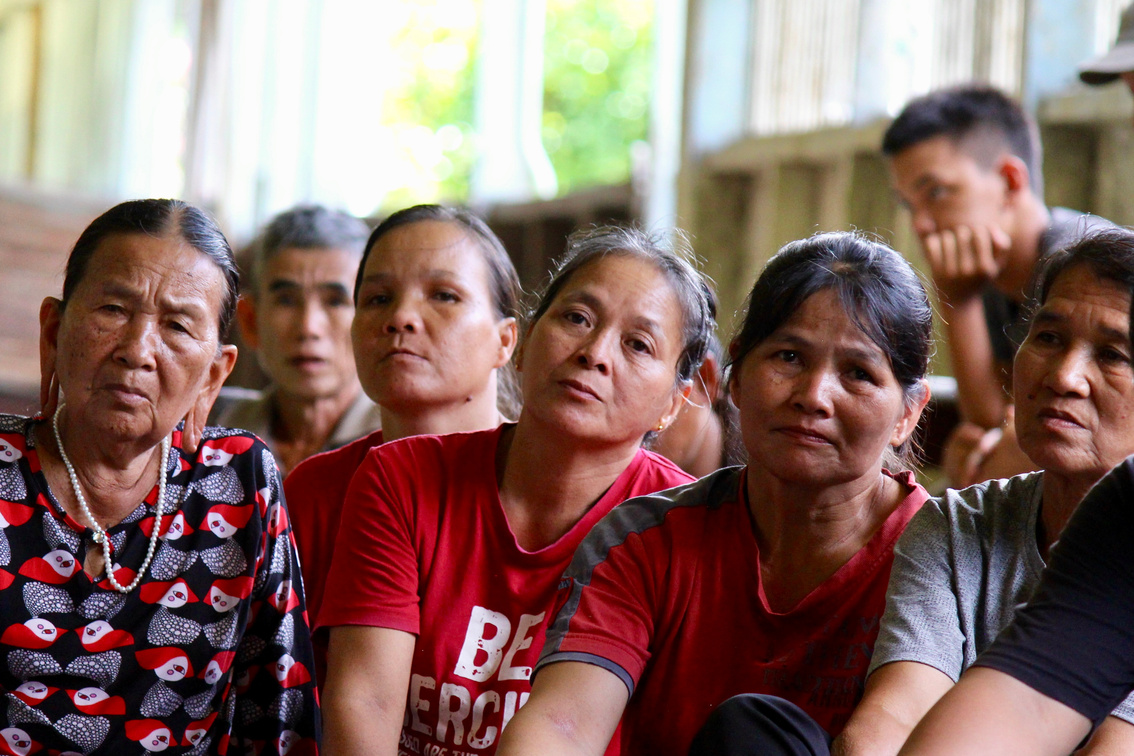
Community consultation
Social Impact Assessments (SIAs), Environmental Impact Assessments (EIAs), and High Conservation Value (HCV) Assessments are a crucial step in determining whether and how to initiate a wide variety of projects.
Evaluating the impact that a logging concession will have on the environment and people is vital to understanding whether a project is desirable, viable, and feasible, and how to avoid or mitigate potential damage. Without properly understanding the impacts, a project is much more likely to encounter obstacles, create community opposition, and adversely impact ecosystems and people.
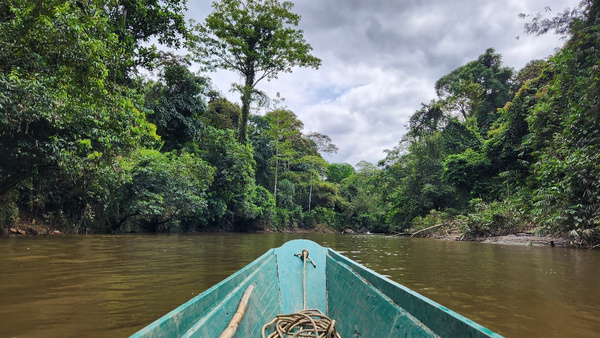
Weak Impact Assessments
“The real fact is that the kampong [village] folks don't understand. These consultants, however, rushing with their presentation and what they present, it is beyond their experiences. Moreover, some are illiterate even though the consultants tried to explain through slide presentation.”[85]
Social and environmental impact assessment processes in Sarawak historically exclude the very communities they are evaluating. Unlike under federal processes, there is no public participation requirement for EIAs in Sarawak.[83] Common issues with EIAs and SIAs include lack of clarity, opaque procedures, inaccessible documents, and low-quality participation.[84]
Impact assessors regularly fail to adequately communicate their objectives. Community members are often confused about what the consultants are doing and why they are there. As one leader from the Gerenai area explained,
Impact assessments are notoriously difficult to access, both from government agencies and from Samling. Communities are routinely unable to access reports, even when they formally request copies, including maps of their own territories and mitigation requirements.[86]
In June 2020, the Gerenai Community Rights Action Committee (GCRAC) formally requested copies of impact assessment reports for the
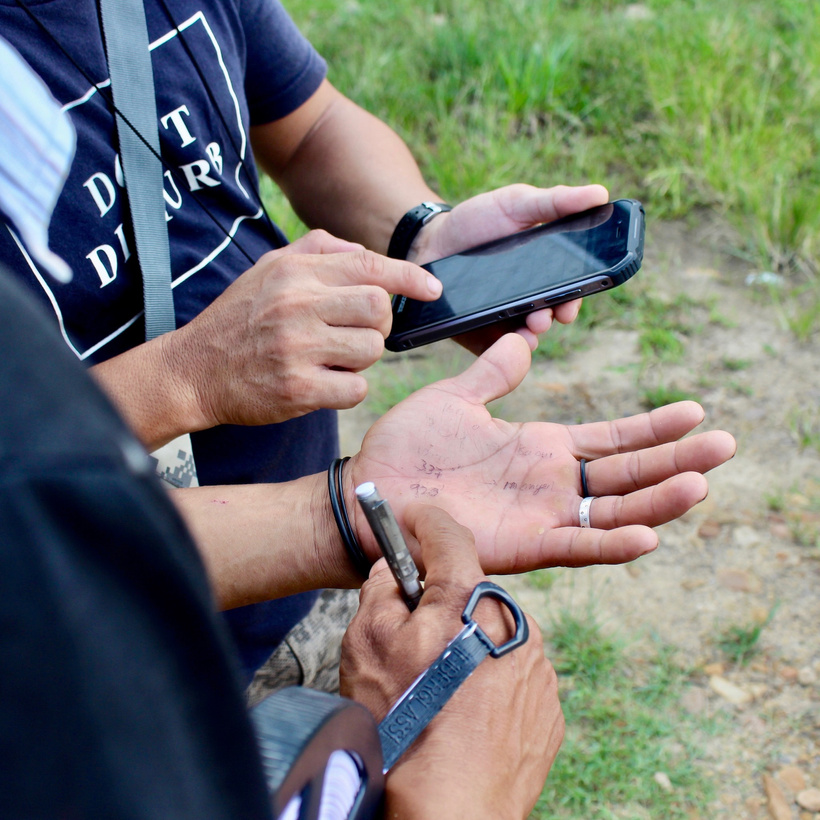
Baram Heritage Survey technicians in training
Gerenai FMU from the Natural Resources and Environment Board (NREB), the Sarawak state agency in charge, and did not receive a response. GCRAC formally requested copies of impact assessments reports for the Gerenai FMU from Samling in August, 2021, but again, did not
hear back.[87]
Impact Assessors also anecdotally allege that they are unable to access impact assessment documents from the NREB to conduct background research on an area. The NREB tightly controls access to EIAs and SIAs conducted in Sarawak. Sometimes it is possible to access some physical copies of the reports at their offices, but they typically do not allow copies or photos of the documents to be made, and no one is allowed to take the documents out of the office.
Without access to these documents, communities are unable to verify or counter the results of impact assessments and, as a consequence, cannot exert their Free, Prior, and Informed Consent (FPIC).
It also makes it difficult for assessors to conduct background research, which can impact the quality of assessments.
Assessments sometimes fail to comprehensively describe impacts. The summaries of SIAs in Samling’s Forest Management Plans regularly highlight the positive impacts of logging such as road access and job opportunities for local communities, but often fail to mention negative impacts such as increased risk of floods, poor water quality, lack of timber for community use or reduced availability of game and forest products in logged forests.[88]
Assessments often fail to adequately consult a wide range or high number of community members. This is clearly visible in auditing reports and impact assessments in the Gerenai FMU. For example, the 2018 SIA for the Gerenai FMU notes that a total of 55 respondents were interviewed in an area with an estimated population of at least 11,472 (see Figure 28).[89]
Community consultation
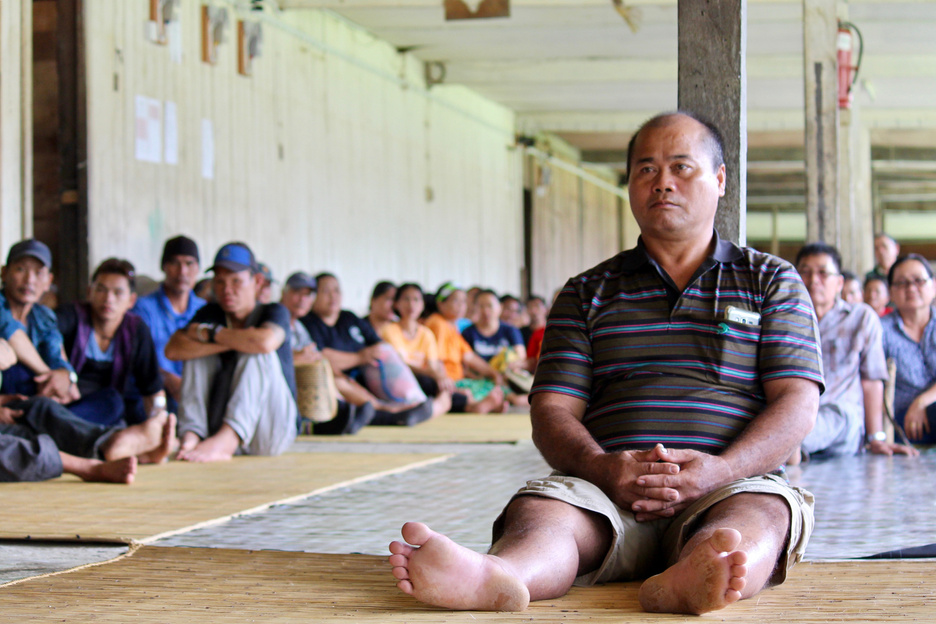
Figure 28: Table from the Social Impact Assessment from 2018 for the Gerenai FMU. The table shows no one was consulted in 5 out of 22 communities and very low participation rates in most communities.
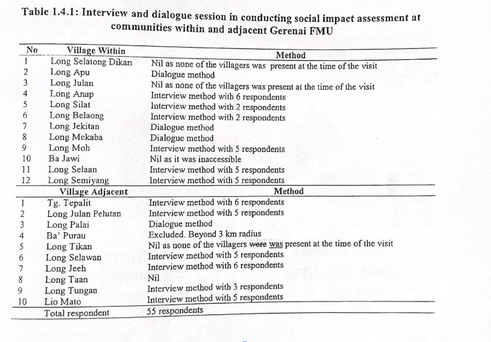
The 55 respondents were largely a homogenous group: 94% were male, and 63% were above the age of 55. The report notes that no one was interviewed in 5 of the 22 villages listed. In two of the villages only 2 people were interviewed. The author of the report explains that the SIA was conducted by two teams who split up to visit different communities. The author included community grievances that he heard into the SIA, however, he excluded the grievances heard by the other team in order to “prevent misconception.”[90]
In the Baram area, failure to secure community participation concurs with a lack of trust regarding industrial logging and consultation processes. The trip report from the 2014 SIA notes that the communities of Long Palai, “stressed that just because they are cooperating, it doesn’t mean that: agree [sic] to extend timber license, agree that the certificate to be awarded to the company.”[91] Like many villages in the Baram area, they distrust assessment processes due to a history of encroachment and the failure of the company to properly consult and
obtain consent.
As one leader of Long Moh described: “We are careful with any meeting invitations from the logging company. We are fed up with the dirty tricks of those who often look for opportunities to ‘obtain’ our Free, Prior and Informed Consent in malicious ways. In the past, when we attended meetings with the logging company [Samling], they often took our presence there as an agreement to all their wishes or agenda without properly informing and consulting us via proper minutes of the meeting or with any other relevant documents.”[92] The interviewee went on to explain that when people refused to fill out the questionnaires during a SIA consultation, the consultants tried to incentivize them by giving the first 10 people to fill out the questionnaire a prize, or “lucky draw”.
As described in Part II, Samling has violated agreements with Long Moh. The community is worried that any future agreements will be violated, and that their participation will be equated with consent.*
*Communities are right to think that their participation may be misconstrued as consent. Samling used the name of one of the SAVE Rivers directors they filed a defamation suit against on its CSR web page to promote how they cooperate with local NGOs and communities.[93]
Comparison to Community-Led Assessment
Comparing impact assessments and public summaries from the Gerenai FMU to a community-led assessment conducted in the same area demonstrates failures in the impact assessment processes. Data collected by the communities during the Baram Heritage Survey (BHS) is more abundant and accurate.
The BHS was a survey conducted in six communities of the Baram area in 2020 and 2021, including three that have territories in the Gerenai FMU and three that have territories in the Suling-Selaan FMU. In those six communities, about 80% of the permanent population was interviewed regarding land use, hunting, fishing, agriculture, and livelihood.[94]
A 2014 EIA from the Gerenai FMU underplays the value of forests for communities and diminishes their reliance on forest resources for nutrition, falsely claiming that hunting
mammals is “becoming less common” and that “fishing is not an important activity.”[95] Samling’s public summaries for its LPFs similarly misleadingly report that there is, “no real dependence [by local communities] on the forest products available in the MTCS area or indeed on those provided by the whole LPF.”[96]
The public summary for the Paong LPF continued to argue that, “Although wildlife still supplements the diets of some people, and wild vegetable and wild fruits are still gathered, what activity there is – primarily hunting, fishing and foraging for wild vegetables – is supplemental. It is abundantly clear that there has been little real negative socio-economic impact by the activities within the PAONG MTCS area on the nearby communities.”[97]
BHS field team for one village
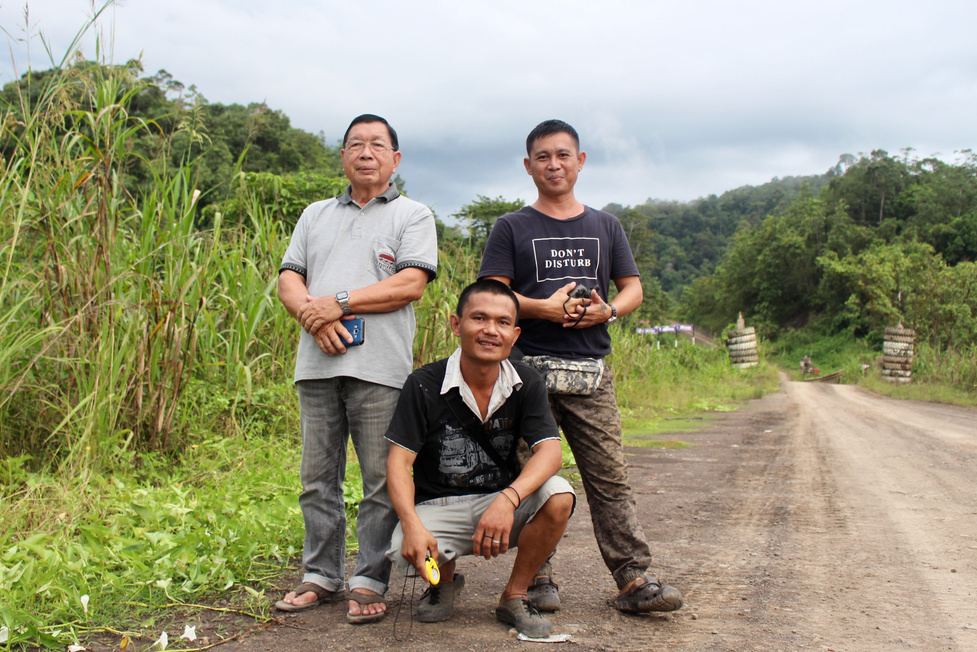
The results of the BHS survey, however, clearly negate these claims. In the BHS, 100% of the 111 people interviewed eat wild meat and fish, 71% regularly go hunting, 93% regularly go fishing, and 92% regularly consume wild-collected fruit.[98]
The BHS also found conflicting results regarding the positive impact of logging. The 2014 EIA states that over 100 people from local communities regularly work for the timber company, however the BHS found zero people employed by the timber company: all household incomes are reliant on traditional livelihoods such as agriculture, hunting, fishing, and foraging.[99] The EIA claimed that logging would raise household income, however the BHS found no increase in household income six years after the EIA was conducted.
The BHS also found significantly more wildlife. The 2014 EIA states that totally protected
fauna are rarely found in the project site, while the BHS found an abundance of protected fauna.
The 2014 EIA found 29 Rare, Threatened, and Endangered (RTE) species, while the BHS found 39. The 2014 EIA claims that there are only 3 hornbill species in the logging concession area, while the BHS found an abundance of 6 hornbill species.[100]
Statements like “the issue of conserving the existing biological environment is not very crucial” demonstrate that weak assessments make way for questionable conclusions.[101] Poor quality EIAs and SIAs that discard the value of healthy forests and underestimate wildlife populations will invariably fail to identify appropriate mitigation requirements and procedures.
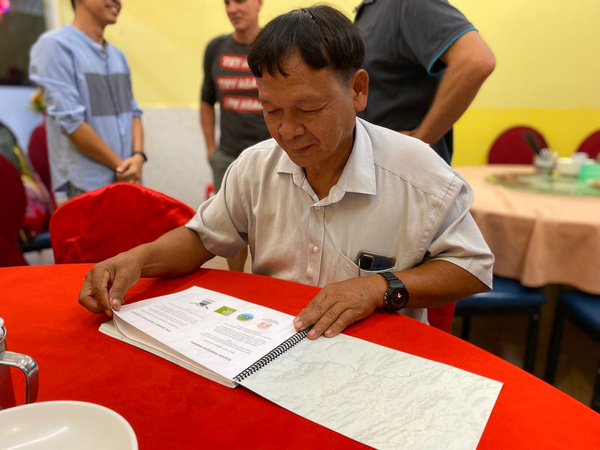
Community leader reading BHS atlas
PART 3:
Defective Complaints Mechanism
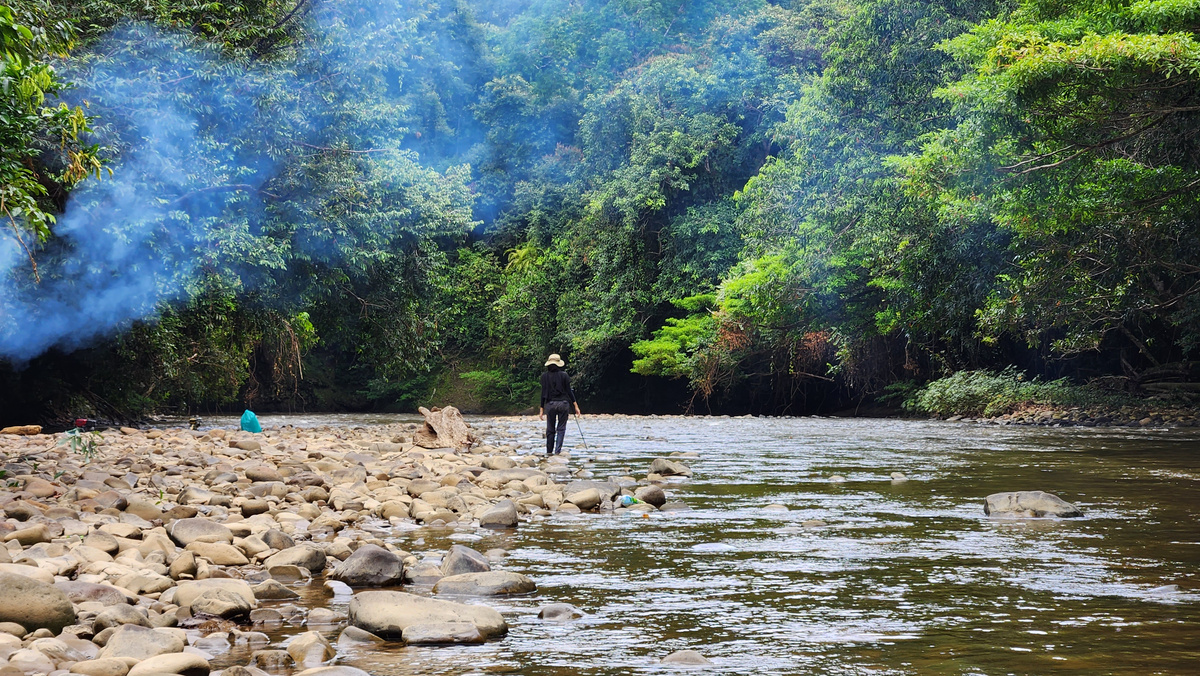
A Flawed System
The following sections assess flaws in the Samling and MTCS complaints and dispute resolution procedures, and how community and civil society complaints systematically end up in limbo.
Historically, Samling has ignored community grievances regarding logging. The lack of proper complaints procedures has repeatedly forced communities to complain through the only means they had: logging road blockades. In the Baram River Basin, large blockades against Samling date back to the early 1990s.[102] The documented cases in Part II of this report show that Samling has largely been unresponsive to community complaints and that the procedures for complaints and conflict resolution remain opaque.
The new mandatory commitment to Sustainable Forest Management and FMU certification has forced Samling to develop a complaints procedure, which was published on their website in 2022. Even without a proper complaints procedure, SIRIM granted MTCS certificates for Samling’s FMUs.
Information about complaints procedures were only published on the MTCC and Samling websites after NGOs criticized the lack of information. Despite this, the complaints process remains complex to navigate.
These difficulties obstruct communities from obtaining accurate information about the status of their land and expressing any concerns or opposition, essentially preventing them from influencing logging activities happening on their own territories and allowing all managing bodies to avoid responsibility when conflict occurs.
The inherent complexity of the complaints processes violates the International Organization for Standardization’s (ISO) principle of Accessibility.* The ISO standard for complaints mechanisms includes “Accessibility” as best practice:
“[T]he process is easily accessible to all potential complainants with information about how to make and resolve complaints. Language should be easy to understand and the organization should provide assistance in making a complaint. Other languages and formats should be made available as needed to support accessibility. No complainant should be disadvantaged.”[103]
*The International Organization for Standardization is an association that develops and publishes international standards for various industries and sectors.
Samling's Complaints Procedure
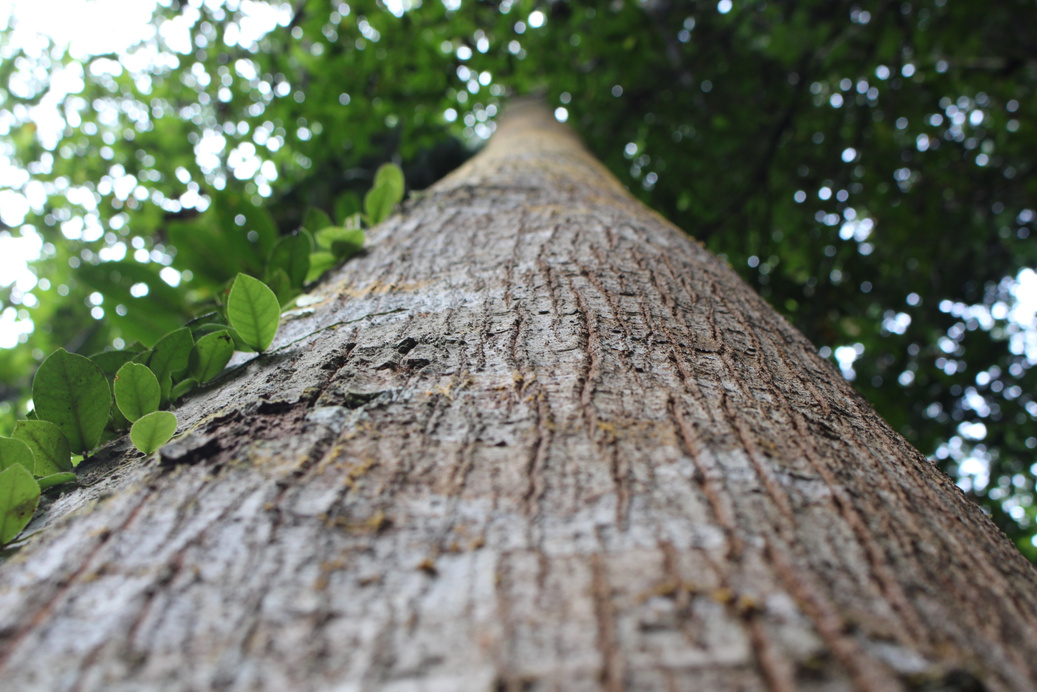
Communities tried to bring their grievances directly to the workers at the Samling camps as well as to send letters to Samling management. These communications would regularly fail to result in satisfactory outcomes for the communities. Despite an agreement to protect certain areas in the territory of Long Moh from logging in 2018, Samling later logged in these areas, denied the existence of the agreement and threatened the community with legal action.
The Penan of Long Ajeng also sought dialogue with Samling field staff after finding Samling extracting logs from their territory within the UBFA project in 2021. Nevertheless, in 2022 Samling logged the area and entered the proposed core protection area of UBFA.
When the Jamok community sent a letter to Samling’s Chief Forester in 2020 expressing concern about logging on their territory and noting that they had not been consulted about the FMU, the forester replied that he had no jurisdiction over their concerns and that the community should turn to FDS.
In June 2020, Penan grassroots organization KERUAN sent a letter to Samling informing them that the communities within the Suling Selaan FMU (including Long Ajeng) disagreed with logging.[104] KERUAN has never received a response, and in 2021, Samling logged the area. In 2020, Samling organized a seminar on MTCS upon request by GCRAC, but only MTCC and SIRIM presented information and Samling employees were not available to answer any questions from the communities.
As dialogue with and official letters to Samling do not seem to be an effective way of complaining - and without knowledge of other avenues to file complaints - communities have repeatedly been forced to set up blockades, as is the case with Long Ajeng and Long
Pakan in 2021.
The act of setting up a blockade and physically stopping the company from logging seems to be the only method that impacts Samling’s logging activities. A blockade is the last resort for communities when other channels have proven
to be ineffective. They also turned to local NGOs for support. When communities later publicly criticized Samling for inaction, they were threatened with legal action. In the case of SAVE Rivers, Samling turned the threat into an actual lawsuit for defamation.
Under the new government policy of Sustainable Forest Management[105] and the MTCS scheme[106] logging companies are required to have an appropriate mechanism in place to resolve conflicts. Furthermore, these mechanisms are required to be publicly available and records of negotiations or mediation in conflicts need to be maintained. Samling only fulfilled the requirement for a publicly available complaints procedure in 2022 - years after the certification of their first FMU. In 2022, Samling first published a flow chart on its website explaining how complaints could be made.[107] Samling later updated this flow chart[108] and also published a new form for complaints and requests on its Corporate Social Responsibility web page.[109]
FDS requires each FMU to establish a Forest Management Certification Liaison Committee (FMCLC) consultation framework to deal with
conflicts. The FMCLC consists of various stakeholders including government agencies, the license holder and local communities. The communities are meant to be organized under the Community Representative Committee (CRC) which consists of at least one representative of each community.
While SIRIM’s audit reports are contradictory on whether Samling officially established a CRC at the time of certification of the Gerenai FMU, it is clear that the majority of people in the villages were not aware of the existence or purpose of the CRC.
One member of the CRC, for example, only learned that he had been named as a member of the CRC multiple years after the CRC had supposedly been established. During a meeting held jointly with representatives from Samling and FDS, this person asked who were the CRC representatives for his community: “suddenly my name was mentioned as CRC, along with three others. When I asked when did they appoint me and the other members? Who selected us? Were the CRC members elected according to approved procedure? They were not able to give an answer.”[110]
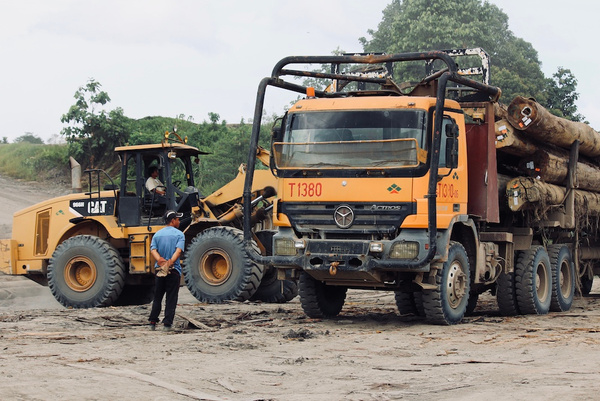
MTCS Complaints Procedure
The MTCS complaints procedure is a confusing and convoluted system that allows logging to continue unabated despite staunch opposition.
Making submissions to this opaque complaints process has proven challenging and confusing for people with reliable internet access, language skills, and experience. It is far more frustrating for remote communities, who may not have access to these resources, and who are trying to exercise their basic rights over their own land.
The official MTCC complaint mechanism appears to not have been available or active online until late 2020, years after communities began complaining about Samling’s activities. PEFC shared the MTCC dispute resolution process page with SAVE Rivers in November 2020. According to the Internet Archive, this page was published around this time. Originally, the supposed complaints section was a simple web contact form on the MTCC website with no other information.[111]
In May 2020, the MTCC added a section on their website called “inquiries and feedback.”[112] It appears that the complaint mechanism - if it existed - was not readily available to the public until after communities had expressed concern over the certification process, and sent those concerns up the chain. Furthermore, it was only accessible online by people well-acquainted with technology and able to decipher the complex requirements for submitting a complaint. It was not a tool that rural communities with spotty or nonexistent internet could access.
PEFC continued to endorse the MTCS in spite of its inadequate complaints mechanism and did not investigate this deficiency. PEFC commissioned a review of the new MTCS standard in 2020 and 2021. This review analyzed the standard itself, but did not take into consideration the complaints procedure.[113] PEFC maintained their endorsement of MTCS without an evaluation of this
essential component.
Furthermore, SIRIM does not have a clear limit regarding what constitutes withdrawal or suspension of a certificate. In practice, this means that communities can file innumerable complaints about compliance and consent and the certificate could still be issued, even if Samling does not sufficiently address
the non-conformities.
Case Study: Passing the Buck
Indigenous community members protesting in front of Samling’s office in Miri
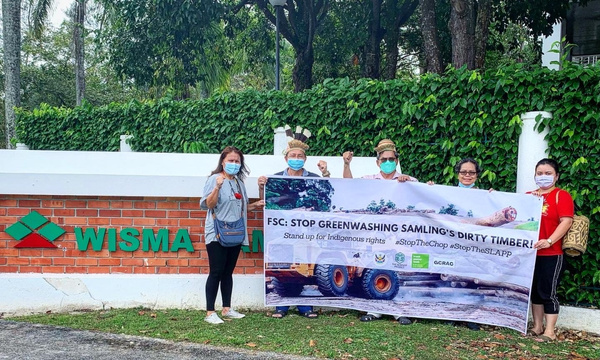
The following description of events describes the difficulties involved in trying to comprehend and navigate the complaints processes, focusing on the case of the Gerenai FMU, which is managed and operated by Samling Plywood (Miri) Sdn. Bhd., a fully owned subsidiary of Samling Global Ltd. From 2018 to 2023, community and NGO representatives exhausted the many complaints pathways they were told to use, and were not informed of the official MTCC complaints mechanism until years into the process. The various managers and administrators from the MTCC, PEFC, SIRIM and Samling repeatedly avoided accountability by placing responsibility on other entities.
This account demonstrates that the MTCC and PEFC have failed to act upon grievances regarding logging concessions stamped as sustainable.
Official complaints and communications with these bodies have failed to adequately address community concerns. The lack of access to remedy in these processes suggests that PEFC and MTCC complaints procedures are inadequate to address real grievances and adverse impacts caused by the companies they certify. This is a major credibility risk to PEFC and MTCC, and exposes the rift between the intent of their standards and the actual application.
Description of Events
Jul 2018
Sept
2019
Feb
2020
Community concerns with the Gerenai FMU certification process began when the Kenyah Jamok communities found Samling encroaching into their communal forest, the Ba’i Keremun Jamok. The Jamok quickly began the process of contacting Samling and FDS to notify them that they did not agree to the logging in their territory and that they wanted their communal forest to be excluded from any timber concessions. At this time, the community was not aware of any FMU in their area, nor that Samling was applying for MTCS certification for the Gerenai FMU.
Actions Taken By Communities and NGOs
- Sent numerous letters and filed 6 complaints to at least 6 different entities over multiple years
- Repeatedly asked for clarification regarding procedures and consultation processes
- Communities repeatedly stated opposition to logging including staging blockades and filing police reports
Representatives from the MTCC and SIRIM held a meeting with community members in Miri about the certification of the Gerenai FMU under MTCS. Participants understood that this meeting was held after SIRIM determined that Samling had not adequately consulted communities of the Gerenai FMU.[114] Communities were directed to inform Samling’s management department regarding opposition to or support of the FMU.
After MTCC and SIRIM left the meeting, concerned community representatives organized themselves as the Gerenai Community Rights Action Committee (GCRAC). GCRAC subsequently informed SAVE Rivers about the meeting and the ongoing MTCS certification. GCRAC and communities who were concerned with the certification process approached SAVE Rivers for support. GCRAC also spoke with Samling’s forester about organizing a larger consultation workshop to explain MTCS to the communities, which did not eventuate until September 2020.
A representative from SIRIM met with a representative from the supporting NGOs and confirmed that communities who disagree with certification or have issues with the consultation process should report their concerns directly to Samling, who would have a three-month window to respond and address the issues after which SIRIM would intervene. This was the correct advice, and is the beginning of a typical complaints mechanism escalation process.
Following this advice, three different letters were sent to Samling from the Kenyah Jamok, and the Penan in Ba Jawi and Long Lamai. The letters expressed concern with the lack of proper consultations, opposition to logging, and explained community forest protection projects already underway. GCRAC followed with a range of similar letters to Samling, SIRIM and the Natural Resources And Environment Board (NREB).
March
2020
David Marsden, the Chief Forester of Samling, responded to the Kenyah Jamok’s letter in a brief email saying, “... matters concerning allocation of forest areas, proposed land use, etc. are government issues over which Samling has no jurisdiction. Such matters should be addressed directly to the Director of Forests.”
In this email, Marsden effectively shirked responsibility for community complaints. Supporting NGOs forwarded his response to SIRIM, asking how to proceed. Samling did not respond to the other letters from Ba Jawi and Long Lamai. According to the MTCC complaints procedure, Samling should have responded to each letter, formally accepting them as complaints, and initiated the complaints process.
April
2020
June 2020
The MTCS Forest Management certificate for the Gerenai FMU was issued by SIRIM.
GCRAC sent a letter to SIRIM expressing concerns with the MTCS certificate for the Gerenai FMU. The letter cited the lack of FPIC and Samling’s failure to respond to their earlier letters. It also asked why the certificate was issued before the previously agreed-to consultation was conducted
in Miri.
Malaysia was under a Movement Control Order at this time, meaning that remote Indigenous communities were effectively under lockdown and unable to seek office meetings with decision makers. This added to the frustration of unanswered letters. Despite the Movement Control Order, logging continued throughout the Covid-19 pandemic as an essential industry.
SAVE Rivers and supporting NGOs began a media campaign regarding frustrations with the certification process called “Stop the Chop”. A series of press releases and opinion articles regarding the Gerenai FMU and the lack of consultation received local and international media coverage.
Actions Taken By Samling
- Repeatedly denied community allegations
- Redirected community complaints to FDS
- Threatened communities with legal action
- Filed a lawsuit against local NGO
- Filed police report against local NGO
- Published a complaints mechanism on their website
Throughout 2020, the communities of Long Selawan, Long Julan, Long Moh, Long Palai and Tanjung Tepalit also joined the campaign. A Stop the Chop petition was launched on the SAVE Rivers website. While both MTCC and Samling published responses disparaging the community claims on their websites, neither offered an alternative grievance process or made mention of a complaints procedure.[115]
Sept 25 2020
Oct 2020
March
- April
2021
The workshop requested by GCRAC finally took place in Miri with presentations by the FDS, MTCC, SIRIM and WWF, however, Samling did not present any information at its own workshop. Furthermore, no representatives from the FMU were present during the question and answer session. Community members reported that they felt very disappointed with the information and answers they received during the workshop, and many issues and questions remained unresolved.[116]
Actions Taken By MTCC
- Published complaints procedure on their website
- Initiated a complaints resolution process upon acceptance of formal complaints in May, 2021
- Effectively paused complaints resultion process when Samling filed lawsuit against SAVE Rivers
- Edited their complaints procedure to explicitly include a clause that pauses MTCC processes if legal cases are ongoing
- Edited their complaints procedure to exclude issues about FMU management and logging practices
- Largely deferred to Samling and SIRIM
Supporting NGOs requested a meeting with PEFC to discuss Samling and MTCC. A joint report titled “Complaints from the ground regarding the implementation of the Malaysian Timber Certification Scheme (MTCS) in Sarawak, Malaysia'' was sent to PEFC. The report points to the lack of transparency, failure to obtain FPIC, disregard of community dependence on forest resources, disregard of community initiatives for forest conservation, and flaws in the complaints mechanism. It also provides suggestions for how to improve these issues. SIRIM included the report and SAVE Rivers’ criticism in their next audit.
In late October, the supporting NGOs and community representatives had a video conference with PEFC, and were, for the first time, directed to file community concerns via the official MTCC complaints mechanism. MTCC was present in the call and was tasked with following up with the representatives about the mechanism via email. After two weeks of silence from MTCC, information regarding how to access the official MTCC complaints mechanism was provided by PEFC.
Samling and its subsidiary, Tree One Megapellet, sent letters to several communities who had written complaint letters, denying community allegations and threatening them with potential legal action. In the letter to Long Moh, Samling denied agreeing to not log the Bekia, Ampai, and Seru’en areas. Shortly after, on April 9, 2021, Samling’s lawyers sent a letter to SAVE Rivers demanding a public apology and retraction of allegedly defamatory statements, including a commitment to never repeat those statements.
May
2021
June 2021
GCRAC and KERUAN Organisation filed formal complaints with MTCC on behalf of communities. The MTCC accepted the complaint, which would be taken up by their Dispute Resolution Committee (DRC). The MTCC notified Samling, requesting a brief from them
due July 15.
The MTCC sent a letter to the Bruno Manser Fonds (BMF), SAVE Rivers, and The Borneo Project, inviting them and relevant stakeholders to a roundtable to discuss concerns and find an amicable solution to the issues. The organizations were keen to engage in dialogue, and proposed a meeting for the following month. Unfortunately, this dialogue was derailed when Samling filed a defamation suit against SAVE Rivers. Samling requested that the MTCC postpone the dialogue due to the lawsuit, although SAVE Rivers was not the entity to file the complaints. NGOs question whether part of the motivation for the lawsuit was to stop the MTCC process from moving forward.
Jul 28
2021
The DRC met, without any submissions from Samling. While they were unable to deliberate about the subject matter raised in the lawsuit, they did flag that MTCC had improved its website complaint mechanism in response to the complaints.[117]
Oct 2021
The MTCC process was hamstrung by the lawsuit, and GCRAC, Bruno Manser Fonds, and The Borneo Project filed a complaint with PEFC. Correspondence and meetings with PEFC continued into 2022 and PEFC directed NGOs to file complaints about SIRIM with
Standards Malaysia.
Meanwhile, Samling continued to encroach into Indigenous land, and communities in the Baram area continued to resist logging through blockades. Even though SAVE Rivers were effectively silenced while the lawsuit was pending, the Stop the Chop campaign continued throughout 2021 and 2022. Supporting NGOs made contact with forest campaigners from European countries that import MTCS timber.
Actions Taken By PEFC
- Deferred to MTCC
- Asked Standards Malaysia to open investigation into SIRIM 3 years after NGOs contacted PEFC regarding complaints
- Largely deferred to Samling and SIRIM
Nov - Dec
2021
Oct 2022
SIRIM’s 2021 surveillance audit of the Gerenai FMU, conducted in November and December 2021 takes note of letters sent to Samling. SIRIM found 12 major and 12 minor non-conformities by Samling, including the following relating to the complaint mechanism:
“Mechanism for conflict resolution (resource & tenure rights) were not publicly available and consultation with local communities were not conducted for 2020/2021”[118]
Minor non-conformity against indicator 3.2.2
“Lack of engagement and disclosure of information on Forest Certification and management processes which include involvement of the communities in accordance with the free and prior informed process. Lack of engagement and disclosure of information on the FMU management processes affecting the duly recognized legal and customary tenure or use rights of the local communities. Lack of disclosure and information on objectives and functions of FMCLC and CRC. Insufficient identification and monitoring of sites of significant importance to the communities. Corrective actions provided was not sufficiently implemented.”
Major non-conformity against indicator 2.2.2[119]
“Updated records on the status of compensation using the appropriate mechanism were not available.”[120]
Minor non-conformity against indicator 4.5.2
“No engagement and disclosure of dispute mechanism process including time frame to respond to dispute. Dispute mechanism on land claims not made available to the communities. Updated Records of dispute over tenure and use rights was not available.”[121]
Minor non-conformity against indicator 2.3.1
NGOs submitted a policy of association complaint to FSC. Samling, as a holder of two FSC chain of custody certificates, must comply with FSC policy in all of their operations.
Actions Taken By SIRIM
- Included community and NGO letters and grievances in their audits
- Withdrew Ravenscourt FMU certification
- Continues to reissue the Gerenai FMU certificate after many years of numerous major and minor non-conformities, and Samling’s failure to address prior non-conformities
May 2023
FSC officially accepted the policy of association complaint after determining there was sufficient evidence regarding violation of FSC policies.
Advokasi Pribumi, an NGO registered by a Public Relations firm based in Kuala Lumpur in March, 2023, criticized SAVE Rivers in two press releases and urged them to settle the court case with Samling.[122] As Advokasi Pribumi has no visible history and media outlet, the Sarawak Report questioned whether they were set up to discredit SAVE Rivers.[123]
June 2023
SIRIM published the results of the Gerenai Surveillance Audit from 2022 upon request by the supporting NGOs. The audit report confirmed a plethora of community grievances and failures to address non-conformities, as described previously.
Jul -
Aug 2023
Sept 2023
SIRIM revoked the MTCS certification of Samling’s Ravenscourt FMU in the Upper Limbang area after determining Samling failed to submit and implement effective corrective action regarding non-conformities from previous audits.
Police interrogated directors of SAVE Rivers after Samling CEO filed a police report against them.[124]
Supporting NGOs sent a letter to SIRIM, further questioning its independence and impartiality in assessing Samling’s compliance with MTCS. The letter questioned why SIRIM had not suspended or revoked Samling’s MTCS certificate for the Gerenai FMU, given the recurring non-conformities and failure to remedy the situation after multiple audits.
In response, PEFC asked Standards Malaysia, the accreditation body, to consider the letter as an official complaint and open an investigation. Standards Malaysia proceeded to accept the letter as an official complaint and open an investigation into SIRIM.
However, Standards Malaysia’s investigation only addressed SIRIM's conformance with standards for performance as a Crediting Body (CB); Standards Malaysia is not able to address the crux between Samling and the communities.
Samling withdrew the defamation lawsuit against SAVE Rivers.
Oct 2023
Standards Malaysia and SIRIM concluded their investigation into SIRIM’s certification of the Gerenai FMU and determined that the CB’s actions regarding certification complied with procedure. Standards Malaysia also found that SIRIM did not have clear procedures regarding what would lead to suspension of certification.
This account clearly shows how difficult it has been for communities and supporting NGOs to understand and access the proper complaints procedures, and how hard it is for communities to resist logging on their own territories. Even when audit reports repeatedly confirm that Samling did not adequately obtain FPIC from communities, little is done to address community concerns.
No entities take responsibility for conflicts regarding Indigenous rights:
- Samling pointed to FDS as the responsible entity, published defensive statements on their website when allegations were made, and denied all community allegations.
- FDS, who was copied on most communications throughout the process, did little to intervene.
- MTCC seemingly paused the dispute resolution process when Samling filed a lawsuit against SAVE Rivers and stressed that community concerns and complaints must be dealt with by SIRIM.
- PEFC referred the case back to MTCC.
- SIRIM continued to issue certificates to a company that repeatedly failed to address non-conformities.
Standards Malaysia’s investigation into SIRIM was only an evaluation of SIRIM’s systems, it did not investigate the original problems of non-conformities on the ground. It did find, however, that SIRIM did not have a clear threshold for which a certificate should
be withdrawn.
This means that timber companies could in practice accumulate countless non-conformities and still be awarded the certificate, no matter how poorly they conform to the standards.
SIRIM did act to withdraw the MTCS certificate for the Ravenscourt FMU after several years of complaints and non-conformities, however, it is unclear why the same has not occurred for the Gerenai FMU, given the repeated major and minor non-conformities.
The design of this system is flawed; it simply allows the involved stakeholders to attribute responsibility to other entities, thereby allowing the timber industry to continue to ignore the rights of Indigenous communities.
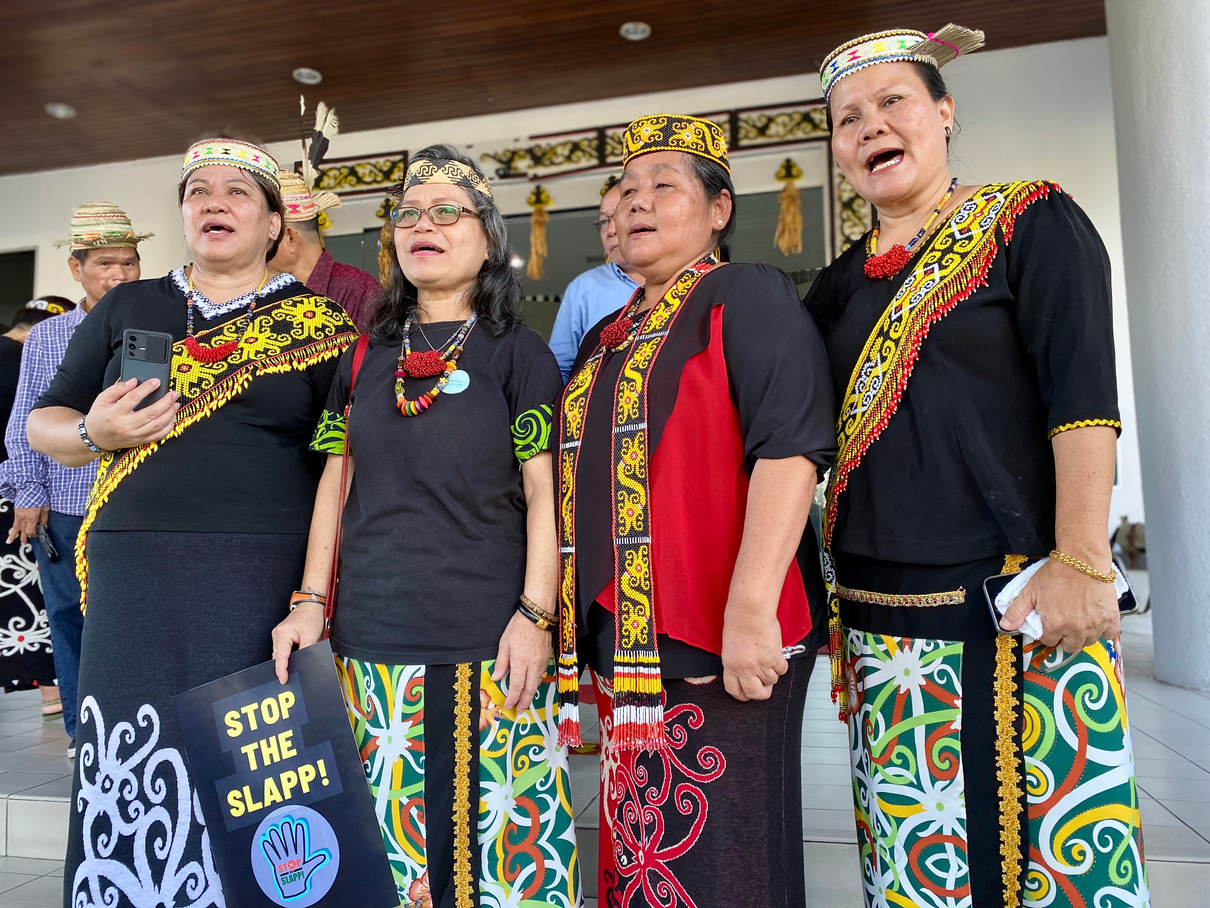
Inherent Issues Within the Complaints Procedures
The above case study demonstrates a broken complaints system for timber certification in Malaysia. There were at least 6 different entities that complaints were submitted to over 5 years, with none of those processes resulting in remedy thus far, and most of them not following the process laid out in the official complaints procedures.
The PEFC system uses complaint escalation processes to try to resolve complaints at the ground-level first, before escalating them to higher levels of authority. According to the complaints procedures now published on the Samling and MTCC websites, complaints from communities should have first gone to Samling and should have been addressed within the FMU management and the multi-stakeholder committees of the FMUs. SIRIM should then have evaluated these complaints during audits.
Samling failed to address complaints with the community. SIRIM included complaints during their audit reports, however this did not result in sufficient remedy measures in the case of the Gerenai FMU. Furthermore, this is a fundamentally problematic approach. It puts the burden on the communities engaging in the certification process to identify what constitutes a complaint and advocate for that process. They are expected to do this without assistance accessing and understanding their rights in the complaints system from the company or anyone else.
The process also relies on the CB, in this case SIRIM, to substantiate the complaint. More often than not a CB will try to file the complaint as stakeholder concerns and not trigger the formal complaint procedures.
SIRIM issued non-conformities to Samling as a result of the community complaints, but did not treat the communities as complainants, ignoring their responsibilities. Samling’s corrective actions to address the problems were insufficient, and it was never made clear to communities that they were entitled to a formal complaint process where they had the right to escalate their complaints.
Standards Malaysia handles complaints against SIRIM, but will only review SIRIM against their requirements for accreditation and will not address the communities’ concerns directly. Furthermore, this stage of escalation did not occur until 5 years into the process. Their investigation found that SIRIM had followed their own protocol regarding withdrawal and suspension of certificates, which is quite easy to do given that the protocol has no limit regarding how many non-compliances lead to corrective action.
Figure 29: MTCS complaints procedure
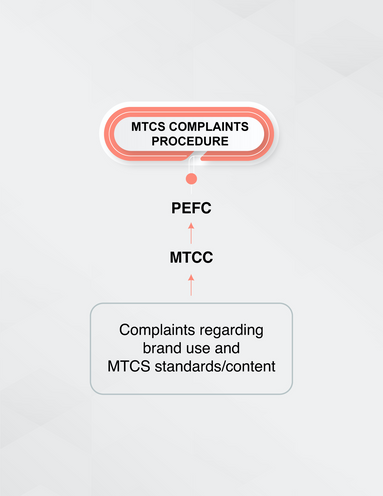
The International Accreditation Forum investigates complaints against Standards Malaysia and so far they have not been involved in this process.
Importantly, PEFC and MTCC are not involved in this escalation process. According to the December 2021 version of the MTCC complaints procedure, the MTCC can receive and resolve complaints related to certificate holders, CBs, and standards. However, in the May 2023 version (currently not online but shared with the complainants), this responsibility is relinquished. The MTCC can now only process complaints with a very limited scope, such as logo use and communication with CBs. This effectively means that the MTCC has no means to address complaints about certificate holders (i.e. Samling); they have to rely on SIRIM. They also now have a clause that expressly pauses MTCC processes if legal cases are ongoing.
This seems to suggest that rather than expanding their complaints process and improving it to address the concerns of stakeholders, MTCC (and PEFC by extension) are passing the buck back to CBs and are making it harder and more convoluted for complainants to ask MTCC to intercede in major issues with their own standards system.
It is unclear what the threshold is for termination or suspension of the MTCS certificate in the SIRIM auditing process. Standards Malaysia’s investigation confirmed that there is no clear threshold for suspension, which means companies can repeatedly fail to address non-conformities without consequence. Multiple years of major non-conformities in the Gerenai FMU show that corrective actions have not addressed failures to obtain FPIC, and this has had no impact on the certification status.
Furthermore, MTCC has no power to intervene in certification status, even if they see
significant issues with the certification process or FMU operations. This design makes it impossible for them to guarantee their own standards: if SIRIM does an inadequate evaluation or does not suspend certification after repeated major non-conformities on the part of a timber company, the MTCC cannot disassociate from the company.
The payment structure also presents issues for the auditing processing through SIRIM. Companies pay SIRIM directly to conduct the audits. This increases the risk that companies will have undue influence on the
auditing process.
Figure 30: Accreditation complaints procedure
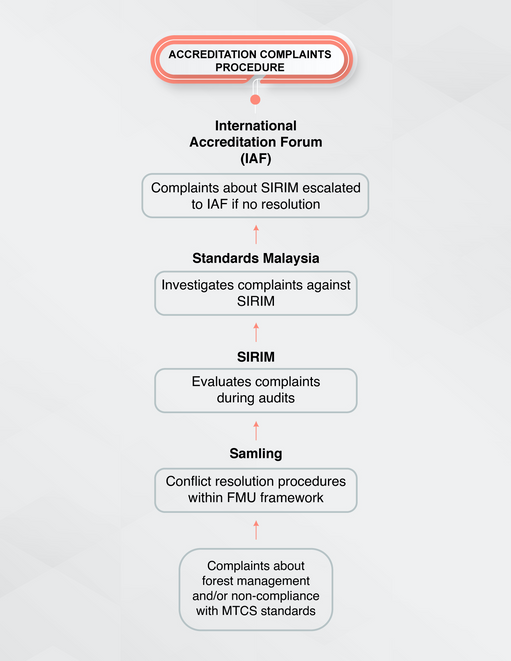
PART 4:
Samling and the Global Supply of Conflict Timber Products
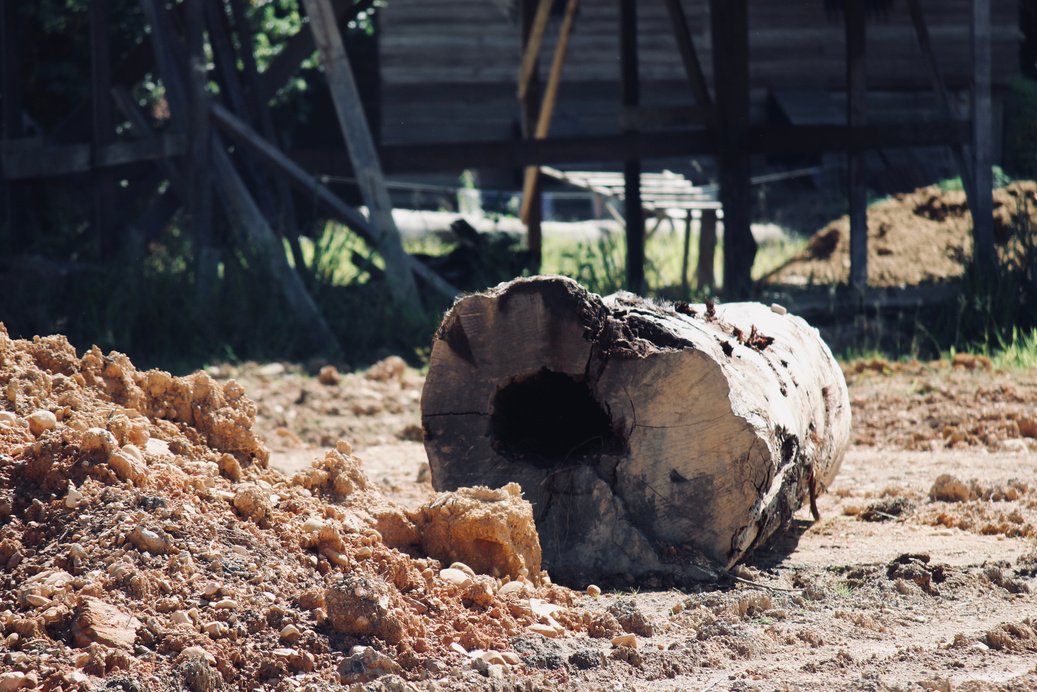
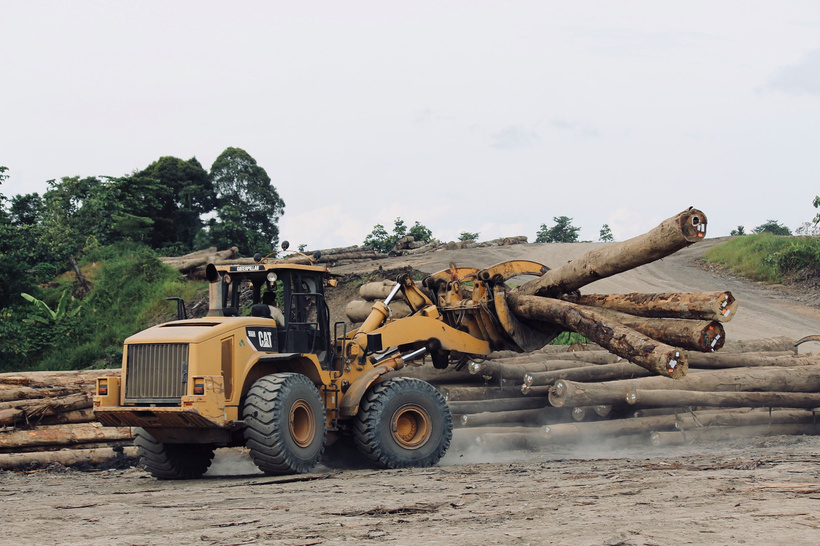
- Corporate Structure and Trade Flow
- Finished and Semi-finished Products
Samling’s activities stretch well beyond the logging in Sarawak that has harmed communities and the environment.
Once logs are harvested, tracking what products they become and which countries they are sent to is a complex process. The following section outlines some of what this investigation has found about Samling’s corporate structure and trade flow, identifies companies that buy from Samling and flags some other questionable corporate activities in which the company takes part. It does not take into consideration trade flow to Europe. While a large portion of MTCS timber goes to the EU, it is not possible to track exactly where it goes and who the buyers are in the EU, as regulations do not require transparency in these transactions.

Corporate Structure and Trade Flow
Samling has a vast and complex corporate structure. Samling’s last annual report was published in 2011 before the company went private, so there is very little publicly available information about the company. The connections detailed below have been substantiated as much as is possible through gray literature.
Samling Global Ltd. is the ultimate parent company. Through three subsidiaries in Samling Global’s control – Samling Labuan Ltd., Lingui Developments, and Syarikat Samling Timber – the company controls over 65 companies related to forest products, as well as several more in palm oil plantations and production.
Figure 31: Samling’s corporate structure
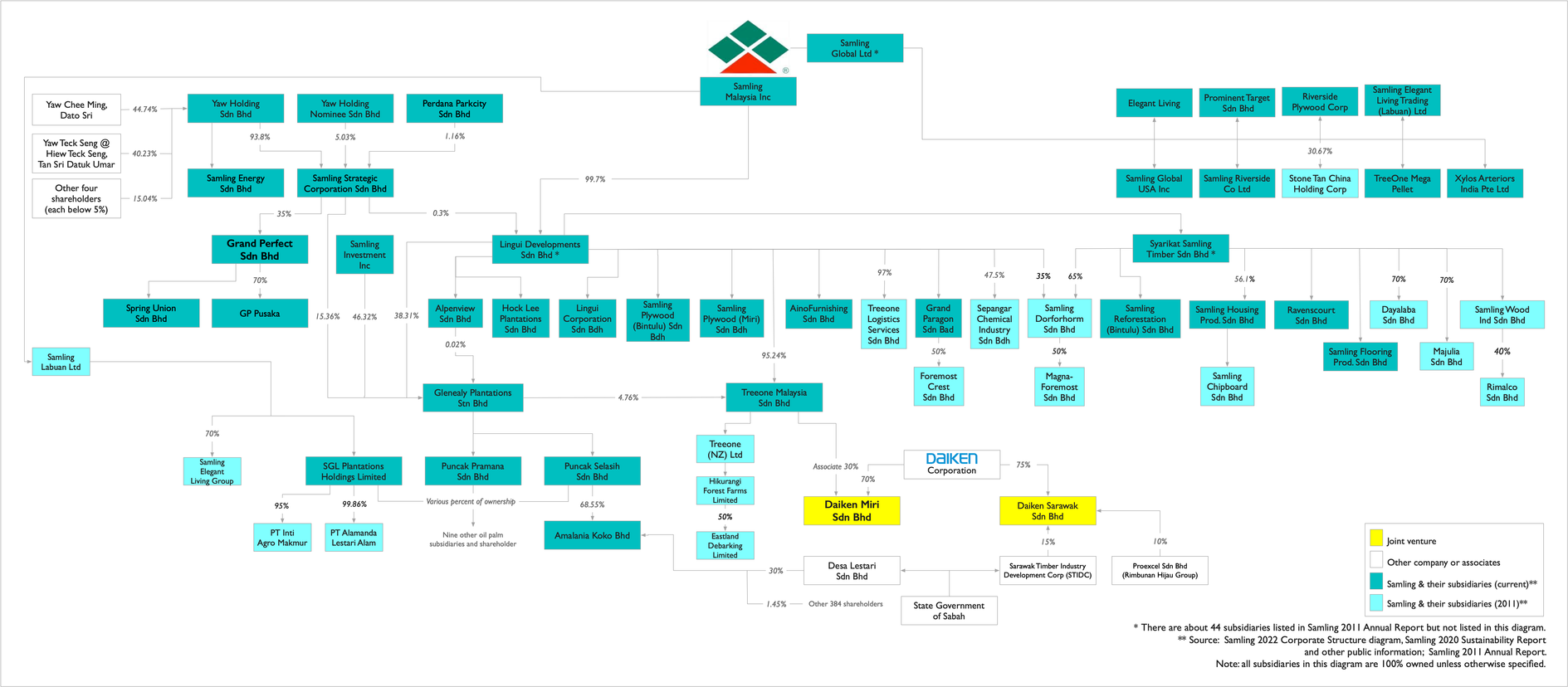
Samling's Key Holdings
Grand Perfect Sdn Bhd
Samling Strategic Corp, a direct subsidiary of Yaw Holding Sdn. Bhd., is a 35% shareholder.[125]
The company’s list of shareholders is controversial. KTS, another major forest company operating in Sarawak owns 35% of Grand Perfect, with the remaining 30% held by Gasijaya Sdn. Bhd., a subsidiary of another major forestry player in Sarawak, Ta Ann. [126]
Grand Perfect owns Spring Union Sdn. Bhd. (100%), which holds a 70% stake in GP Pusaka, the management company for LPF 0043 and LPF 0012.[127] These are the plantations that supply the majority (96%) of the 3rd party plantation-sourced logs by Samling, including Daiken Miri’s Tekwood line, Samling Home Product’s House of Acacia, and other Samling ventures.[128]
Daiken Miri
Samling Malaysia, via Lingui Developments, owns a 30% stake in Daiken Miri, with Daiken as the 70% majority owner. They produce branded Medium Density Fiberboard (MDF) products called Tekwood and Tekwood-A. This MDF is used in furniture and musical instruments sold by several well-known brands.
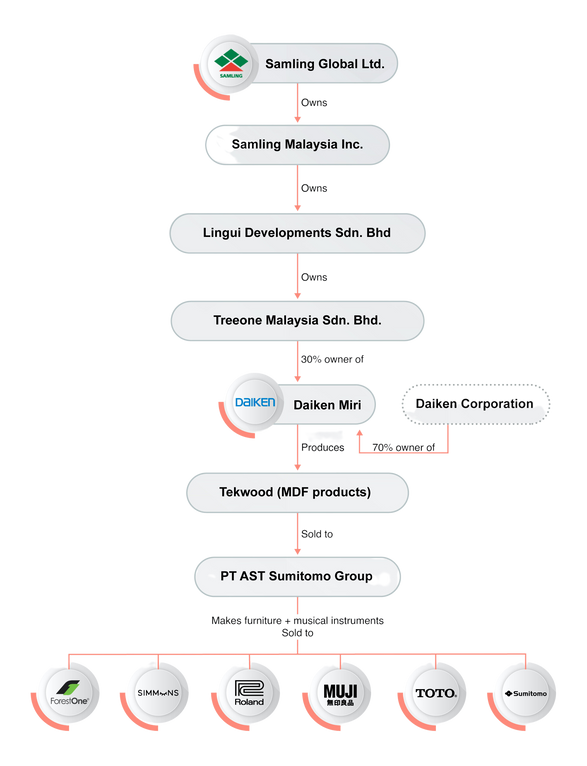
Figure 32: Product trade flow. This table shows an example of how Samling products are manufactured and sold internationally.
Finished and Semi-finished Products

The information below highlights aspects of Samling's trade practices for different wood products, including plywood, MDF, doors, and flooring.
The trade flow data is an estimate of the supply chain connections for trade between January 2021–July 2022.* The following section highlights Samling’s identifiable global connections. It provides buyers and customers with some information about where Samling products can be found.
Plywood
Japan is the major destination for Malaysian plywood exports.[129] Sarawak plays a significant role in this trade through partnerships with companies like Itochu Corporation and Daiken.
Samling Plywood also sells to Shamrock Building Materials and the Mickey Group in the United States. Shamrock Building Materials is FSC certified, but it is unclear from the data whether the plywood purchased from Samling included veneers with native species from Sarawak or carried FSC claims.**
Medium Density Fibreboard (MDF)
For MDF, Daiken Miri (30% owned by Samling) uses acacia and dipterocarp tropical hardwood residues to make their products, meaning that their MDF likely comes from a mixture of wood from acacia plantations and from natural forest concessions in Sarawak.[130]
*Because it is not possible to access Malaysian customs data, the following trade flow research is based on ‘reverse customs data’, where import data from destination countries is used to look up Malaysia exports, combined with Sarawak government statistical data on exports and companies’ public information. Customs data sources include U.S. vessel manifest data and import data from India, Indonesia, Mexico, Pakistan, Vietnam, China, and the Philippines.
**Shamrock Building Materials purchased 3000 tons of plywood from Samling Plywood (Bintulu) in 2021. At the time of publication, the company declined to make a commitment to refrain from purchasing from Samling in the future.
There is therefore a high likelihood that some of the wood products from the disputed concessions in this report ends up in this MDF. Samling’s MDF products are traded under the brands TEKWOOD and TEKWOOD-A. By volume, 65% of MDF produced in Sarawak goes to Japan and 17% goes to the Philippines.[131]
In 2020 and 2021, Daiken Miri sold 6,100 tons (about 3,000 cubic meters)[132] of TEKWOOD to PT AST Indonesia (Sumitomo Group). PT AST[133] makes furniture and musical instruments such as pianos. A review of their Indonesian exports shows that they are a major manufacturer of furniture for Muji, Toto (bathroom furniture), Simmons (mattress components and furniture), Roland (pianos), Sumitomo (furniture), and Forest One Australia (plywood), among other customers. For each of these customers, a large proportion of the products utilize MDF.
Daiken Miri also sold 1,300 tons of TEKWOOD to PT Matsuzawa Pelita Furniture Indonesia, which makes office furniture, doors, kitchens, and musical instruments for brands such as Panasonic (musical instruments, speaker boxes), Kawai (pianos), Takara Standard (kitchens), Lixil Corp. (kitchens), Pamouna Co. Ltd. (furniture), Paramount Bed (hospital beds) & Kokuyo (furniture).[134] All brands are Japanese.
Doors
Samling partners with U.S. door manufacturer Masonite for the manufacture and distribution of molded door skins worldwide.[135] Samling Home Products (SHP) sells doors under the 'Frontiera' brand made from acacia and other tropical hardwoods.[136] Samling-owned Grand Paragon Sdn Bhd is also listed as selling door skins in the available trade flow data. Grand Paragon sells to S.M. Corp in India, which is the exclusive technology and brand partner for Masonite in India.[137]
Flooring
Samling manufactures flooring in Malaysia and in China through two groups of companies. The first is based in Sarawak and Peninsular Malaysia and includes Samling Home Products and Samling Flooring Products. The second flooring group is based in China and includes Riverside Plywood, Elegant Living, Baroque, Samling Global, Samling Riverside (based in Hong Kong), and Suzhou Times Flooring.[138] According to trade flow data, Samling Riverside sold engineered flooring to Samling Global USA Inc, which manufactures and wholesales flooring in the U.S. through brands such as LifeCore Flooring.[139]
The data also showed that Elegant Living (70% Samling-owned and one of China’s major flooring distributors) sells to Baroque Flooring in the U.S. In addition, Elegant Living makes a line of engineered acacia wood flooring called ‘Adura’ that is wholesaled in the U.S. by Mannington Mills.[140]
Samling also sells flooring through Xylos[141] Arteriors India, a wholly owned subsidiary of Samling. Xylos sells flooring and BORNEOTEAK products. BORNEOTEAK is a trademark registered by Samling for acacia mangium species grown in their LPFs. Acacia mangium products are sold by Samling downstream[142] primarily through Xylos as BORNEOTEAK, though often marketed as “Borneo Teak” – the common name for a different and near-threatened tree species, intsia bijuga.
Figure 33 below summarizes the Tier 1 customers for Samling’s semi-finished and finished products traced out of Sarawak, as well as the connected Tier 2+ customers or markets, finished products, and brands.
Figure 33: Samling’s tier 1 customers
Destination country | Customer | Business | Samling product and brands | Connected customers and markets |
Indonesia | Intera Indonesia | Manufacturer (furniture) | Sawn wood (acacia) | |
Matsuzawa Kogei | Manufacturer (office and kitchen furniture, musical instruments) | “TEKWOOD” and “TEKWOOD-A” MDF | Japan: Panasonic, Kawai, Takara | |
PT AST Indonesia (Sumitomo Group) | Manufacturer (building materials, furniture, pianos) | “TEKWOOD” and “TEKWOOD-A” MDF | Japan: Muji, Toto, Simmons, Sumitomo. Australia: ForestOneInt’l, Roland Music | |
PT Anghauz Indonesia | Doors | “Frontiera” doors, skins, and MDF | Retails in Indonesia | |
USA | Shamrock Bldg Materials Inc | Retailer (building materials) | Hardwood veneered plywood | U.S. market |
Mickey Group | Online forest products trader | Plywood | U.S. market | |
Samling Global USA | Flooring manufacturing and distribution | Engineered hardwood and MDF-based laminate flooring | U.S. market | |
Mannington Mills | Flooring manufacturing and distribution | Engineered hardwood and MDF-based laminate flooring | U.S. market | |
Baroque Flooring | Flooring distributor | Engineered hardwood and MDF-based laminate flooring | U.S. market |
Destination country | Customer | Business | Samling product and brands | Connected customers and markets |
Vietnam | Cong Ty Tnhh Xuat Nhap Khau Va Che Bien Go Hop Thinh | Manufacturer (flooring) | MDF (for laminate flooring) | Vietnamese market |
India | Fabwood | Retailer and wholesaler (wood products) | Engineered hardwood flooring | Indian market |
Jai Shiv Plywood | Manufacturer (plywood) | Plywood | ||
Luxurious Arts | Manufacturer (furniture) | Engineered hardwood flooring | ||
Patel Timber Mart | Retailer (wood products) | Flooring, plywood | ||
S.M. Corp | Manufacturer (doors) | “Frontiera” doors, skins, and MDF | Masonite customers in India | |
VK Patel & Co | Retailer and wholesaler (doors) | MDF | Indian market | |
Xylos Arteriors India | Retailer, manufacturer (flooring) | Flooring, plywood,BORNEOTEAK | Major hotel chains operating in India | |
Japan | Itochu Japan | Construction | Plywood and sawn wood | Japanese market |
Daiken Japan | Construction | TEKWOOD | Japanese market |
Conclusion and Recommendations
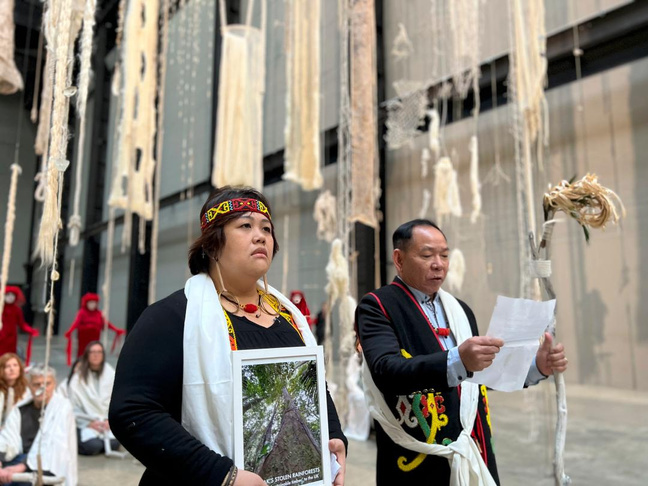
The evidence presented in this report uncovers a deeply troubling reality. It demonstrates that timber company Samling has a long and varied history of conflict over Indigenous land rights in Sarawak and has contributed to significant environmental degradation. The findings underscore the urgent need for a paradigm shift in the logging industry. They call into question the role of certification bodies in the context of Sarawak’s commitment to preserve its forests and combat climate change.
The findings shed light on the inability of the Malaysian Timber Certification Council (MTCC) and the Programme for the Endorsement of Forest Certification (PEFC) to guarantee their own standards and enforce compliance.
The certification body, SIRIM, has proven to be incapable of effectively monitoring and enforcing these standards. As a result, trust in these certification schemes has been severely undermined, and the validity of timber products labeled as "sustainably sourced" by Samling and similar companies is questionable.
In our years of work supporting Indigenous communities to navigate the Samling and MTCC complaints process, it is our opinion that the design of the complaints mechanism is inherently flawed. It functions as a tool supporting the interests of the timber industry at the expense of Indigenous rights and environmental justice.
A critical takeaway from the investigation is the strong recommendation that MTCS products and timber products from Sarawak, particularly those associated with Samling, should be avoided until Indigenous communities in the region have secured their land rights. MTCC is unable to guarantee the standards they claim to uphold. Considering the numerous and ongoing land rights conflicts and the subsequent inaction from certification bodies, products from Sarawak must be considered high-risk. Conscientious consumers and businesses should prioritize sourcing timber from more transparent and ethically managed supply chains.
As a tropical forest hotspot and megadiverse country, Malaysia plays a crucial role in combating climate change. The indiscriminate logging practices carried out by companies like Samling not only exacerbate deforestation but also contribute to a significant loss of biodiversity and the release of carbon emissions. To fulfill its forest cover commitments and contribute to the global fight against climate change, Malaysia must prioritize keeping its forests intact and shift towards regeneration. FDS must ensure that they do not award logging and oil palm concessions in contradiction of their own commitments and policies to protect forests and Indigenous rights.
Moreover, increased transparency is a fundamental requirement to address the issues at hand. Both Samling and the government of Sarawak must prioritize greater transparency in Social and Environmental Impact Assessments and other evaluation documents related to logging activities. This transparency will enable independent monitoring, hold accountable those responsible for any violations, and ensure that environmental and social impacts are thoroughly assessed and mitigated.
This report sounds the alarm for immediate action and transformation within the logging industry in Sarawak, with specific attention to Samling's practices and the effectiveness of certification bodies. Conflicts regarding Indigenous land rights and the impact of logging in a threatened biodiversity hotspot are matters that demand serious attention and remediation. Only by working collaboratively with Indigenous communities, civil society, and industry stakeholders can Sarawak and Malaysia as a whole move towards a more sustainable and just future. It is our collective responsibility to support Indigenous peoples’ rights, protect our forests, and address the global climate crisis through decisive action and principled decision-making.
Right: Indigenous women in
Sarawak demanding
Samling drop the lawsuit
against SAVE Rivers in front
of the Miri high court.
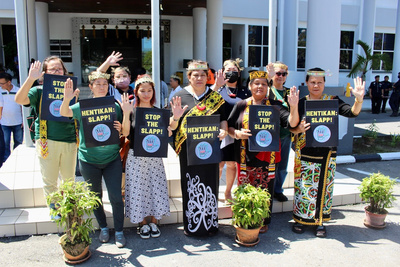
Key Recommendations
1.
The Malaysian Timber Certification Scheme (MTCS) certification for Samling’s Gerenai FMU should be suspended with immediate effect.
2.
The Forest Department Sarawak (FDS) should issue a moratorium on Samling's logging operations in the Gerenai Forest Management Unit and other FMUs with a similar track record of community complaints for alleged breach of Samling's duties as the concession holder.
8.
9.
The European Union should ban the entry of Samling's timber products to the EU common market under the European Union Deforestation Regulation (EUDR) until the issues addressed in this report have been resolved.
All remaining primary or unlogged forests should be excluded from logging concessions and conversion to agriculture or other land categories.
3.
FDS should initiate an independent review of Samling's compliance with forest certification and forest legislation. Indigenous communities should be closely involved in the review.
4.
The Malaysian Timber Certification Council (MTCC) must incorporate a mechanism that allows them to ensure compliance of their own standards.
5.
Complaints procedures of all organizations (SIRIM, MTCC, Samling, PEFC) must be more transparent, accessible, and timely.
6.
SIRIM and MTCC must increase transparency regarding what constitutes a suspension or withdrawal of MTCS or FSC certificates. Recurring non-compliance with certification standards must lead to suspension and/or cancellation of certificates.
10.
Products from Sarawak should be considered as high risk of conflict until Indigenous communities have secure land rights. FDS should ensure that they do not award logging and plantation concessions in direct contradiction of their commitments and policies to protect forests and Indigenous Rights.
11.
All stakeholders should prioritize greater transparency and quality in social and environmental impact assessments.
12.
Communities must be properly and adequately consulted in the certification process. SIRIM must ensure that free, prior and informed consent has been obtained.
13.
Companies, MTCC, SIRIM, FDS, and consultants should work collaboratively with Indigenous communities and civil society.
7.
Consumers and businesses should prioritize sourcing their timber from more transparent and ethically managed supply chains, avoiding Samling and MTCS certified products, until the certification process becomes reliable and land rights conflicts are solved.
14.
Malaysia should prioritize keeping its forest intact and shift towards regeneration and protection of Indigenous rights, including ratifying the United Nations Declaration on the Rights of Indigenous Peoples.
15.
Malaysia must pass anti-SLAPP legislation.
References: Introduction and Part 1
- International Tropical Timber Organization (ITTO), Annual Review and Assessment of the World Tropical Timber Situation 1993-1994, 1995, p. 28, https://www.itto.int/direct/topics/topics_pdf_download/topics_id=3114&no=0
- Bruno Manser Fonds, Sarawak Geoportal creates transparency on land use in Malaysian Borneo, February 24, 2014, https://www.brunomanser.ch/en/news/sarawak-geoportal-creates-transparency-on-land-use-in-malaysian-borneo
- LinkedIn, Samling Group of Companies, https://www.linkedin.com/company/samling-global-limited/
- Samling, Natural Forest, https://www.samling.com/natural-forest Accessed October 24, 2023
- See Global Witness, An Industry Unchecked, September 2013, p. 3, https://www.globalwitness.org/en/campaigns/forests/industry-unchecked/; Global Witness, Japan’s timber imports fuelling rainforest destruction in Sarawak and violation of indigenous land rights, June 2014, https://www.globalwitness.org/en/archive/briefing-japans-timber-imports-fuelling-rainforest-destruction-sarawak-and-violation/; Global Witness, Wilful Ignorance, April 2016, https://www.globalwitness.org/en/reports/wilful-ignorance/
- Hanbury-Tenison, R., Rainforest Tribunal, August 2023 https://www.youtube.com/watch?v=SjQLfWdlSM4
- Global Witness, Pandering to the loggers: Why WWF’s Global Forest and Trade Network isn’t working, July 2011, p. 12, https://cdn2.globalwitness.org/archive/files/library/pandering_to_the_loggers_web_0.pdf
- Council on Ethics, The Government Pension Fund Global, February 22, 2010, https://www.regjeringen.no/globalassets/upload/fin/etikk/recommendation_samling.pdf
- Greenpeace, Partners in Crime: Malaysian Loggers, Timber Markets and the Politics of Self-Interest in Papua New Guinea, October 2001, p. 11, https://www.greenpeace.org/usa/wp-content/uploads/legacy/Global/usa/report/2010/2/partners-in-crime-malaysian.pdf
- Hance, J., Logging Company fined $100 million for illegal logging in Papua New Guinea, Mongabay, June 28, 2011, https://news.mongabay.com/2011/06/logging-company-fined-100-million-for-illegal-logging-in-papua-new-guinea/
- At the time of publication (September 2023), this investigation is ongoing, FSC Connect, Samling Global Ltd https://connect.fsc.org/actions-and-outcomes/current-cases/samling-global-limited
- Colchester, M., Pang, W.A., Chuo, W.M., and Jalong, T., Land is Life: Land Rights and Oil Palm Development in Sarawak, Forest Peoples Programme and Perkumpulan Sawit Watch, 2007, p. 1, https://www.forestpeoples.org/sites/default/files/publication/2010/08/sarawaklandislifenov07eng.pdf
- Ibid., p. 2.
- Friends of the Earth, Indigenous customary land rights and the modern legal system, December 6, 2021, https://foe-malaysia.org/articles/indigenous-customary-land-rights-and-the-modern-legal-system-6/
- Colchester, M., Pang, W.A., Chuo, W.M., and Jalong, T., Land is Life: Land Rights and Oil Palm Development in Sarawak, Forest Peoples Programme and Perkumpulan Sawit Watch, 2007, p. 1, https://www.forestpeoples.org/sites/default/files/publication/2010/08/sarawaklandislifenov07eng.pdf
- See, Government of Malaysia, Management Of Upper Baram Forest Area For Conservation And Sustainable Development With Involvement Of Local Communities, Upper Baram, Sarawak, Malaysia, International Tropical Timber Organization, n.d., https://www.itto.int/project/id/PD902_19-Rev.3-F; Government of Sarawak, Community Empowerment in Forest Management and Forest Landscape Restoration in Upper Baram, Sarawak Malaysia, International Tropical Timber Organization, March 2019, https://www.itto.int/project/id/PP-A_59-352
- MTCS, Malaysian Criteria and Indicators for Sustainable Forest Management, March 19, 2020, https://mtcc.com.my/wp-content/uploads/2020/06/MCI-Sustainable-Forest-Management-Final.pdf
- FDS, Progress of Planting, Forest Department Sarawak, https://forestry.sarawak.gov.my/web/subpage/webpage_view/1009 Accessed October 19, 2023
- FDS, Sustainable Forest Management, Forest Department Sarawak, https://forestry.sarawak.gov.my/web/subpage/webpage_view/595, Accessed November 10, 2023
- Reforestation & Industrial Forest Division, Aggressive Industrial Forest Plantation Management Towards Sustainability Of Wood Production And Wood-Based Industries In Sarawak: Updates And The Way Forward, Forest Department Sarawak, n.d., p. 13, https://forestry.sarawak.gov.my/web/attachment/show/?docid=Q0paZUpXNjNQN1dwMGJsS2loR3NFUT09OjrzAX7pGF7JSzke03kUu2DA; Samling is most clear about LPFs on their website: Samling, Sarawak ITP certification, n.d, https://www.samling.com/sarawak-itp-certification
References: Part 2
21. See, Ecosol Consultancy Sdn. Bhd., Environmental Impact Assessment for the Re-Entry Hill Logging Within Coups 01AR to 07AR and 15AR to 19AR Under the Forest Timber Licence No. T/0413 at the Batang Baram-Sg Silat Area, Miri Division, Sarawak, NREB Reference No.: NREB/6-3/2H/37, July 2014, pp. C3-37.
22. Global Forestry Services, STLVS P1-4 Checklist & Report [for Samling T/0405], v04, March 1, 2020, p. 7, http://borneoproject.org/wp-content/uploads/GFSS-018-019-STLVS-P1-4-Summary-Samling-T0405-Nov-2021-1_Layun.pdf
23. SAVE Rivers, More communities step up to challenge Samling, October 15, 2020 https://saverivers.org/2020/10/15/more-communities-step-up-to-challenge-samling/
24. SIRIM QAS International, Stage 1 Audit (2018) on Gerenai Forest Management Unit for Forest Management Certification, October 19, 2018, p. 7,
25. SIRIM QAS International, Public Summary, Surveillance 2 Audit (2019) on Gerenai Forest Management Unit for Forest Management Certification, May 9, 2020, p. 8, https://www.sirim-qas.com.my/wp-content/uploads/2020/11/Public-Summary-FMC-of-Gerenai-Forest-Management-Unit-Main-Assessment_v2.0.pdf
26. SIRIM QAS International, Public Summary, Surveillance 1 Audit (2021) on Gerenai Forest Management Unit for Forest Management Certification, June 24, 2022, p. 9, https://www.sirim-qas.com.my/wp-content/uploads/2023/06/Public-Summary-Gerenai-FMU-SA1-2021-ver-3.2.pdf
27. Ibid., p. 10.
28. Ibid., p. 14.
29. Ibid., p. 15.
30. SIRIM QAS International, Public Summary, Surveillance 2 Audit (2022) on Gerenai Forest Management Unit for Forest Management Certification, June 13, 2023,
https://www.sirim-qas.com.my/wp-content/uploads/2023/06/Public-Summary-FMC-of-Gerenai-FMU-2nd-Surveillance_2022-1.pdf. Notably this audit report lacks the section on corrective actions that such reports usually contain.
31. Ibid., pp. 9-10.
32. Ibid., p. 10.
33. Ibid., p. 12.
34. Ibid., pp. 12-13.
35. Ibid., p. 13.
36. Libut, S. P., Meeting between SST and Kampong Long Tungan: Logging in self proclaimed “Tanah Simpan” in Blocks 24 & 25 Coupe 21 T/0413 Gerenai, July 30, 2018, p. 25,
37. McAlpine, F., Logging concession in Malaysian Borneo lacks consent of Indigenous communities, Mongabay, July 13, 2020, https://news.mongabay.com/2020/07/malaysias-tropical-timber-certification-scheme-leaves-indigenous-rights-at-risk-commentary/
38. Bruno Manser Fonds, Penan go to court to defend Heart of Borneo rainforests, Scoop Independent News, December 22, 2010, https://www.scoop.co.nz/stories/WO1012/S00743/penan-go-to-court-to-defend-heart-of-borneo-rainforests.htm
39. SIRIM QAS International, op. cit., June 24, 2022, p. 14.
40. SIRIM QAS International, op. cit., June 24, 2022, p. 16.
41. See Map G: Forest Zoning, October 19, 2022, https://www.samling.com/sites/default/files/2023-02/IMG_3232.JPG from Syarikat Samling Timber Sdn. Bhd., PUBLIC SUMMARY Forest Management Plan Gerenai Forest Management Unit for the period 2018 to 2027, 2nd ed., Samling, February 2, 2023, p. 2, https://www.samling.com/sites/default/files/Edition%202_Gerenai%20FMU%20Public%20Summary%20_%20v02Feb2023.pdf
42. Ba Jawi, Re: Rejection of logging and MTCS certification in Ba Jawi, Gerenai FMU [Letter], July 15, 2023, http://borneoproject.org/wp-content/uploads/20230715_letter-Ba-Jawi-to-Samling_Gerenai-FMU_without-signatures.pdf
43. Donald, R., Malaysia’s Indigenous Penan block roads to stop logging in Borneo, Mongabay, October 14, 2021, https://news.mongabay.com/2021/10/malaysias-indigenous-penan-block-roads-to-stop-logging-in-borneo/
44. Ho, J. Y. K., Response to Malaysiakini's article on Samling Group [Letter], Malaysiakini, December 6, 2021, https://www.malaysiakini.com/letters/601992
45. See Global Forestry Services reports: Global Forestry Services, STVLS P1-4 Checklist & Report [for Samling T/0405], v01, January 31, 2018, pp. 6-8, http://borneoproject.org/wp-content/uploads/GFSS-018-016-STLVS-P1-4-Summary-Samling-T0405-Aug-20202.pdf
; Global Forestry Services, op. cit., v04, March 1, 2020; Global Forestry Services, STLVS P1-4 Checklist & Report [for Samling T/0405], [Close out date November 29, 2021], v04, March 1, 2020, pp. 5-6, http://borneoproject.org/wp-content/uploads/GFSS-018-013a-STLVS-P1-4-Summary-Samling-T0405-Close-out_2019.pdf
References: Part 2
46. Global Forestry Services, STVLS P1-4 Checklist & Report [for Samling T/0405], Global Forestry Services, November 2021, p. 7, https://borneoproject.org/wp-content/uploads/GFSS-018-019-STLVS-P1-4-Summary-Samling-T0405-Nov-2021-1_Layun.pdf
47. The Borneo Project, Penan challenge logging giant with video message from the ground, March 25, 2022, https://borneoproject.org/penan-challenge-logging-giant-samling-with-video-message-from-the-ground/
48. Council on Ethics, The Government Pension Fund Global, 22 February 2010, p. 18,
https://www.regjeringen.no/globalassets/upload/fin/etikk/recommendation_samling.pdf
49. SIRIM QAS International, Public Summary, Surveillance 2 Audit (2020) on Ravenscourt Forest Management Unit for Forest Management Certification, February 16, 2021, p. 5, https://www.sirim-qas.com.my/wp-content/uploads/2021/05/Public-Summary-FMC-of-Ravenscourt-FMU-2nd-Surveillance-1st-Cycle_2020_v1.0.pdf
50. SIRIM QAS International, Public Summary, Recertification Audit (2021) on Ravenscourt Forest Management Unit for Forest Management Certification, May 20, 2022, p. 10, https://www.sirim-qas.com.my/wp-content/uploads/2022/12/Public-Summary-FMC-of-Ravenscourt-Forest-Management-Unit-Recertification-Assessment_2021_v1.0.pdf
51. KERUAN Organisation, Letter to SIRIM Re: Rejection of MTCS certification of Ravenscourt FMU, September 19, 2020, p. 2
52. Bruno Manser Fonds, Tong Tana: Government certified fraud, April 2005, https://www.brunomanser.ch/upload/tongtana/pdf/tt_0504_e.pdf
53. See: Ibid.; MTCC, Information Update: Sela’an Linau FMU, MTCC, https://mtcc.com.my/information-update-selaan-linau-fmu/
54. MTCC, Expiry of Certificate for Forest Management for Sela’an-Linau FMU, MTCC, n.d., https://mtcc.com.my/expiry-of-certificate-for-forest-management-for-selaan-linau-fmu/
55. Global Forestry Services, STLVS P1-4 Checklist & Report [for Samling T/0411], [Close out date March 23, 2019], v02, February 1, 2019, p. 5, https://www.gfsinc.biz/wp-content/uploads/2018/03/GFSS-018-012-STLVS-P1-4-Summary-Samling-T0411-Mar-2019.pdf
56. Bruno Manser Fonds, Penan Step Up Campaign to Save Sarawak’s Last Primeval Forests from Logging, n.d., https://www.bmf.ch/en/news/penan-step-up-campaign-to-save-sarawaks-last-primeval-forests-from-logging-187
57. Bruno Manser Fonds, Penan Successfully Stop Timber Giant Samling from Logging in Conservation Area, n.d., https://www.bmf.ch/en/news/penan-successfully-stop-timber-giant-samling-from-logging-in-conservation-area-209
58. Ibid
59. Global Forestry Services, op. cit. v02, February 1, 2019.
60. The people of Long Moh, Letter demanding cease of logging activities in Coupe 04A sent to the Operations Manager, Samling Timber, drafted November 2020 and sent February 2021.
61. Ibid. Original quote: “Merujuk pada minit mesyuarat perjumpaan penduduk Kampung Long Moh dengan pihak Syarikat Samling Timber pada 18 Jun 2018, En. Fam Chee Kiong telah berjanji bahawa SST tidak akan masuk ke kawasan Bekia, Ampai dan Seru’en sebelum mengadakan sebarangan rundingan bersama penduduk kampung Long Moh.”
62. Ibid. Original quote: “Berpandukan tinjauan yang telah dibuat oleh beberapa orang kampung di kawasan Bekia, Ampai dan Seru’en pada 29 Julai 2020, adalah benar bahawa seluruh kawasan hutan dan tanah temuda (jekau) di kawasan tersebut telah dicerobohi dan telah musnah oleh Syarikat Pembalakan Samling Sdn. Bhd.”
63. The Borneo Project, Long Moh Community Shocked by Unethical Logging Practices, The Borneo Project, December 2, 2020 https://borneoproject.org/long-moh-community-shocked-by-unethical-logging-practices/
64. Anthony, T, Quantum of strategic litigation — quashing public participation, Australian Journal of Human Rights, 2009, v14 ed02, pp. 1-38, https://www.austlii.edu.au/au/journals/AJHR/2009/1.pdf
65. Articles written by SAVE Rivers cited as defamatory by Samling:
- Certification without compliance, Flawed timber certification process violates indigenous rights, SAVE Rivers, June 20, 2020, https://saverivers.org/2020/06/23/certification-without-compliance-flawed-timber-certification-process-violates-indigenous-rights/
- Stop the Chop: Baram Communities Call for an End to Certification of Conflict Timber, SAVE Rivers, September 15, 2020, https://saverivers.org/2020/09/15/stop-the-chop-baram-communities-call-for-an-end-to-certification-of-conflict-timber/
- Kallang, P., Bogus Consultation Process for Timber Certification, SAVE Rivers, October 6, 2020, https://saverivers.org/2020/10/06/bogus-consultation-process-for-timber-certification/
- Absent from their Own Seminar: Samling Continues to Ignore Indigenous Voices, SAVE Rivers, October 9, 2020, https://saverivers.org/2020/10/09/absent-from-their-own-seminar-samling-continues-to-ignore-indigenous-voices/
References: Part 2
5. More Communities Step Up to Challenge Samling, SAVE Rivers, October 15, 2020, https://saverivers.org/2020/10/15/more-communities-step-up-to-challenge-samling/
6. Unethical Practices by Logging Company Revealed by Long Moh Community, SAVE Rivers, December 2, 2020, https://saverivers.org/2020/12/02/unethical-practices-by-logging-company-revealed-by-long-moh-community/
7. 300 Long Moh villagers demand justice after unpermitted logging on their land, SAVE Rivers, March 10, 2021, https://saverivers.org/2021/03/10/300-long-moh-villagers-demand-justice-after-unpermitted-logging-on-their-land/
8. Community alerts Sarawak Government of ongoing logging in Upper Baram Forest Area, SAVE Rivers, March 9, 2021, https://saverivers.org/2021/03/09/community-alerts-sarawak-government-of-ongoing-logging-in-upper-baram-forest-area/
66. Mandates of the Special Rapporteur on the situation of human rights defenders; the Working Group on the issue of human rights and transnational corporations and other business enterprises and the Special Rapporteur on the rights of indigenous peoples, August 29, 2022, Ref.: AL MYS 2/2022, https://spcommreports.ohchr.org/TMResultsBase/DownLoadPublicCommunicationFile?gId=27493
67. Anthony, T, op cit.
68. Ho, J. Y. K., letter to communities of Long Moh, March 26, 2021. Original quote: “Dalam keadaan ini, tiada alasan sama sekali bagi tuntutan anda untuk pampasan untuk mana-mana pencerobohan, kerosakan dan/atau kemusnaha yang didakwa. Kami merizabkan hak kami untuk membawa tindakan undang-undang.”
69. Legal representative Roland Engan & Co sent a letter regarding logging in the area around Long Ajeng, Long Lamam, and Long Murung to FDS, cc’ing Treeone Megapellet, on March 8, 2021. Treeone Megapellet, a subsidiary of Samling, responded on April 9, 2021, stating: “In the circumstances, there is absolutely no basis for your allegations and we request that you retract your Letter. We reserve our rights to take legal action.” Chia, L. K. L., Re Letter issued by Messers. Roland Engan & Co dated 8th March 2021 in respect of the Objection to Logging Activity at the Communal Boundary of Long Ajeng, Long Lamam and Long Murung to the Director of Forests of Forest Department Sarawak (“FDS”) (“Letter”), April 9, 2021, Ref.: REC/SSFMU/03/2021, Rec.: 9/4/2021 at 3 PM, http://borneoproject.org/wp-content/uploads/treeone_megapellet_2021_04_09-RE-encroachment-in-Suling-Selaan-.pdf
Roland Engan & Co sent a similar letter on behalf of Long Benali, Ba Pengaran Iman, Ba Pengaran Kelian, Long Main, Long Kepang, Long Sabai, and Ba Kerameu. Treeone Megapellet responded on April 14, 2021, stating: “We categorically deny all your allegations in the Letter… In the circumstances, there is absolutely no basis for your allegations and we request that you retract your Letter. We reserve our rights to take legal action.”
Ho, J. Y. K., Letter issued by Messers. Roland Engan & Co dated 10th March 2021, addressed to Dr Zamri Bin Rosli, UPM, Bintulu with the subject matter of “Proposed Suling Sela’an FMU” (“Letter”), April 14, 2021, Ref.: REC/SSFMU/03/2021, http://borneoproject.org/wp-content/uploads/Letter-TreeOneMegapellet_Suling-Sela_an-FMU.jpg
70. Eko, Samling: drop the lawsuit against Borneo’s forest defenders (Petition), n.d., https://actions.eko.org/a/samling-drop-the-lawsuit-against-borneo-s-forest-defenders?akid=121890.760397.lYhXVa&eko=true&rd=1&source=fwd&t=2
71. The Borneo Project, 160 organizations join new call for Samling to drop lawsuit, April 18, 2023, https://borneoproject.org/160-organizations-join-new-call-for-samling-to-drop-lawsuit/
72. Save Rivers, Samling CEO makes police report against SAVE Rivers, August 12, 2023, https://saverivers.org/2023/08/12/samling-ceo-made-a-police-report-against-save-rivers/
73. SAVE Rivers and Samling, Joint Statement of Samling Plywood Miri Sdn Bhd Samling Plywood Baramas Sdn Bhd and SAVE Rivers Sdn Bhd, September 18th 2023,
74. The Borneo Project, Timber giant Samling withdraws lawsuit against forest defenders, September 18, 2023, https://borneoproject.org/timber-giant-samling-withdraws-lawsuit-against-indigenous-forest-defenders/
75. Samling, Public Summary, Forest Management Plan, Gerenai Forest Management Unit for the period May 2018 to April 2027, https://www.samling.com/sites/default/files/inline-files/Gerenai%20FMU%20Public%20Summary%20_%20v.17June2019(004)_5March.pdf
76. Greenpeace, Legal Forest Destruction, February 2006, p. 24, https://www.greenpeace.org/static/planet4-netherlands-stateless-develop/2018/06/legal-forest-destruction.pdf
77. Malaysian Timber Certification Scheme, MC&I SFM 1/2020: Indicator 6.10.1, MTCC, March 19, 2020, http://mtcc.com.my/wp-content/uploads/2020/04/MCI-Sustainable-Forest-Management-1-Apr-2020.pdf
References: Part 2
78. Report provided anonymously from industry contact, October 2023
79. Malaysian Palm Oil Certification Council, MSPO Certification Scheme: MSPO Standards, August 17, 2021, https://www.meti.go.jp/shingikai/enecho/shoene_shinene/shin_energy/biomass_sus_wg/pdf/017_03_02.pdf
80. Pillai, K. V., Integrated assessment (IA) with Indigenous community participation: an emerging market case study (IAIA2023 Conference Proceedings), International Association for Impact Assessment (IAIA) Conference, 2023, https://conferences.iaia.org/2023/uploads/edited-presentations/Edited_262_Kanapathi_Pillai_Kamala_Vainy_Integrated_Assessment_Indigenous_community_participation_1.pdf
81. Global Forest Watch, Topics, Water, n.d., https://www.globalforestwatch.org/topics/water/#slides
82. Ecosol Consultancy Sdn. Bhd, op. cit.
83. Idris Mohammed, S. M., Memorandum on Recommendations to Revamp the Environmental Impact Assessment Process in Sarawak, Sahabat Alam Malaysia, June 5, 2014, https://foe-malaysia.org/wp-content/uploads/2020/12/140605_Memorandum_on_Improving_EIA_Process_in_Sarawak_Final.pdf
84. Ibid.
85. Male community leader (Anon.), personal communication, May 3, 2023.
86. Idris Mohammed, S. M., op. cit.
87.“We note in your press release dated July 13th, 2021 that Samling has not received any formal requests from civil society or communities for social or environmental impact reports. Although our organisations have made official requests for these reports from the Natural Resources and Environment Board, called for their distribution through media reports, and verbally requested the documents during the stakeholder discussion at Mega Hotel on 25th September, 2020, we have received no response to any of these requests. As such, we would like to formally request all of the i) environmental impact, ii) social impact and iii) high conservation value reports related to the Gerenai concession from Samling directly. This will help our understanding of proposed forest management and logging in the Baram area, which is of great concern to us and the communities we represent.” GCRAC, Letter sent to Lawrence Chia, CEO, and David Marsden, Chief Forester of Samling, August 12, 2021, http://borneoproject.org/wp-content/uploads/GCRAC-Letter-sent-to-Lawrence-Chia-CEO-and-David-Marsden-Chief-Forester-of-Samling-August-12-2021.pdf
88. See for example Samling, PUBLIC SUMMARY for Forest Management Plan for Layun Forest Management Unit (T/0405) for the period 2022 to 2031, Samling, 2023, https://www.samling.com/sites/default/files/inline-files/Layun%20Public%20Summary%2020230222.pdf; Merawa Sdn. Bhd., PUBLIC SUMMARY for Forest Management Plan for Tama Abu Forest Management Unit (T/0390) for the period 2020 to 2029, Samling, May 2023, https://www.samling.com/sites/default/files/Tama%20Abu%20FMU.pdf; Samling Reforestation (Bintulut) Sdn. Bhd., PUBLIC SUMMARY for Forest Management Plan for the MTCS Area within PAONG LPF/0021for the period 1st January 2023 to 31st December 2032, Samling, n.d., https://www.samling.com/sites/default/files/media/pdf/2023/Paong%20LPF%200021%2030%20May%2023.pdf
89. Syarikat Samling Timber Sdn. Bhd., Social Impact Assessment Report for Communities Within and Adjacent to Gerenai FMU, October 5, 2018, pp. 3-16,
90. “Note that these points [grievances] are from villages that the writer personally visited and grievance[s] are recorded here from first-hand conversation with the villagers. Other points recorded by other members were not included in this report to prevent misconception.” Syarikat Samling Timber Sdn. Bhd., Social Impact Assessment for Gerenai FMU (T/0413) Trip Report, 9-21 July, 2018, p. 3,
91. Ibid.
92. Male community leader (Anon.), personal communication, May 3, 2023.
93. The Borneo Project, Samling namedrops local activist in order to make itself look good, June 22, 2023, https://borneoproject.org/samling-namedrops-local-activist-it-is-suing-in-order-to-make-itself-look-good
94. The Borneo Project, SAVE Rivers, Bruno Manser Fund and KERUAN Organisation, The Baram Heritage Survey, The Borneo Project, 2022. https://borneoproject.org/wp-content/uploads/The-Baram-Heritage-Survey3.pdf
95. Ecosol Consultancy Sdn. Bhd., op. cit., p. C3-21.
96. Samling Reforestation (Bintulu) Sdn Bhd., PUBLIC SUMMARY Forest Plantation Management Plan for the MTCS Area with PAONG LPF/0021 For the period 1st January 2023 to 31st December 2032, Samling, 20 May 2023., p.32, https://www.samling.com/sites/default/files/media/pdf/2023/Paong%20LPF%200021%2030%20May%2023.pd
97. Ibid, p.32
98. The Borneo Project et al, The Baram Heritage Survey, op. cit.
99. Ibid.
100. Ibid.
101. Ecosol Consultancy Sdn. Bhd, op. cit.
References: Part 3
102. Greenpeace, Legal Forest Destruction, February 2006 https://www.greenpeace.org/static/planet4-netherlands-stateless-develop/2018/06/legal-forest-destruction.pdf
103. International Standards Organization, Quality Management – Customer satisfaction – Guidelines for complaints handling in organizations, 3rd ed., July 2018, reference number ISO 10002:2018 (E), https://www.iso.org/standard/71580.html
104. KERUAN Organisation, Letter to David Marsden, Chief Forester of Samling, June 23, 2020, http://borneoproject.org/wp-content/uploads/KERUAN-Organisation-Letter-to-David-Marsden-Chief-Forester-of-Samling-June-23-2020.pdf
105. See, ‘Guideline 12: Conflict resolution guidelines for sustainable forest management’ THE GREEN BOOK, MANUALS, PROCEDURES AND GUIDELINES FOR FOREST MANAGEMENT CERTIFICATION IN SARAWAK (NATURAL FOREST), Forest Department Sarawak Management and Planning Division, 2019, p. 273,
https://forestry.sarawak.gov.my/web/attachment/show/?docid=YWlvM2NlWFV2VGFJaythSmthMkNIdz09OjrrprvW5AU3KcLq0Z7OEzbq
106. See for example Criterion 2.3 and its verifiers in the MTCS document: MTCS, Malaysian Criteria and Indicators for Sustainable Forest Management, MTCS, September 30, 2021, p. 16, https://mtcc.com.my/wp-content/uploads/2022/02/MTCS-ST-1002-2021-MCI-SFM-Final-B5.pdf
107. Samling, Samling Grievances Process Flow Chart, January 2022, accessed via the Internet Archive: https://web.archive.org/web/20220120090316/https://samling.com/sustainability/corporate-social-responsibility-csr
108. Samling, Samling Grievances Process Flow Chart, July 13, 2022, accessed via link from https://samling.com/sustainability/corporate-social-responsibility-csr
109. Samling, Samling Complaint/Request form accessed 27 September 2023, https://samling.com/samling-complaintrequest-form
110. Personal communication, August 30, 2023. Contact requested anonymity.
111. MTCC, Malaysian Timber Certification Council Contact form, MTCC, September 29, 2017, accessed via the Internet Archive: https://web.archive.org/web/20170929054554/http://mtcc.com.my/contact/
112. MTCC, Malaysian Timber Certification Council General Inquiry, MTCC, May 13, 2020, accessed via the Internet Archive: https://web.archive.org/web/20200513111040/http://mtcc.com.my/general-inquiry/
113. Form International, PEFC Conformity Assessment: Malaysian Timber Certification Scheme (MTCS), May 2021, https://cdn.pefc.org/pefc.org/media/2021-11/4f36e0c0-e96e-4547-88de-2a3cd10a357f/dbce712d-0302-5859-8d37-63c3193a4060.pdf
114. Male community member from a village within the Gerenai FMU (Anon.), personal communication: report of community meeting with SIRIM organized by Roland Engan, September 10, 2019.
115.See, MTCC, Commentary: PROCESSES INVOLVED IN GRANTING CERTIFICATION UNDER THE MTCS, MTCC, August 13, 2020, https://mtcc.com.my/commentary-processes-involved-in-granting-certification-under-the-mtcs/; Samling, Media Release: Samling Group refutes online news reports, Samling, July 7, 2020, https://www.samling.com/sites/default/files/content/media-release/pdf/2021/Samling%20Group%20refutes%20online%20news%20reports.pdf
116. SAVE Rivers, Absent from their own seminar: Samling continues to ignore indigenous voices, SAVE Rivers, October 9, 2020, https://saverivers.org/2020/10/09/absent-from-their-own-seminar-samling-continues-to-ignore-indigenous-voices/
117. MTCC, Outcome of Meeting of Dispute Resolution Committee on Complaints Relating to the MTCS-PEFC Certification of Gerenai and Ravenscourt FMUs, MTCC, n.d., http://borneoproject.org/wp-content/uploads/Outcome-of-Meeting-of-Dispute-Resolution-Committee-on-Complaints-Relating-to-the-MTCS-PEFC-Certification-of-Gerenai-and-Ravenscourt-FMUs-MTCC.pdf
118. SIRIM QAS International, op. cit., June 24, 2022, p. 15.
119. Ibid., p. 42.
120. Ibid., p. 78.
121. Ibid., p. 43.
122. Dayak Daily, Timber co vs Save Rivers lawsuit: Advocacy group urges collaboration for sustainable future setting aside past grievances, May 17, 2023, https://dayakdaily.com/timber-co-vs-save-rivers-lawsuit-advocacy-group-urges-collaboration-for-sustainable-future-setting-aside-past-grievances/
Dayak Daily, Attack on Telang Usan rep over logging issues in Baram uncalled for says NGO, March 17, 2023, https://dayakdaily.com/attack-on-telang-usan-rep-over-logging-issues-in-baram-uncalled-for-says-ngo/
123. See, Sarawak Report, Dirty Tricks By Samling’s PR Department?, May 18, 2023, https://www.sarawakreport.org/2023/05/dirty-tricks-by-samlings-pr-department/; Sarawak Report, PR Cat & Mouse Games by Pro-Samling ‘Sustainability NGO’ APS?, May 20, 2023,
https://www.sarawakreport.org/2023/05/pr-cat-mouse-games-by-pro-samling-sustainability-ngo-aps/; Dayak Daily, Timber co vs Save Rivers lawsuit: Advocacy group urges collaboration for sustainable future setting aside past grievances, May 17 2023
https://dayakdaily.com/timber-co-vs-save-rivers-lawsuit-advocacy-group-urges-collaboration-for-sustainable-future-setting-aside-past-grievances/; Dayak Daily, Attack on Telang Usan rep over logging issues in Baram uncalled for says NGO, March 17, 2023
https://dayakdaily.com/attack-on-telang-usan-rep-over-logging-issues-in-baram-uncalled-for-says-ngo/
124. SAVE Rivers, SAMLING CEO MAKES POLICE REPORT AGAINST SAVE RIVERS, August 12, 2023, https://saverivers.org/2023/08/12/samling-ceo-made-a-police-report-against-save-rivers/
References: Part 4
125. Samling Global Limited, Annual Report 2008 - Connect Transactions (4) Provision of services on timber extraction, establishment and maintenance of tree plantations to Grand Perfect Sdn. Bhd., p.73, https://www1.hkexnews.hk/listedco/listconews/sehk/2008/1028/ltn20081028611.pdf
126. Faeh, D., “Development of Global Timber Tycoons in Sarawak, East Malaysia (history and company profiles), Bruno Manser Fund, February 2011, https://www.stop-timber-corruption.org/resources/bmf_report_sarawak_timber_tycoons.pdf
127. GP Pusaka, Harvesting of Timber, Grand Perfect, https://www.gppusaka.com.my/harvesting-timber; see also, https://www.gppusaka.com.my/node/1
128. Samling, Miscellany of Facts - about our timber based operations, rev.04, June 2021, https://www.samling.com/sites/default/files/inline-files/Miscellany%20of%20Facts%20UPLOAD%20(edit%204%20JUNE)%2021.pdf.
129. Research conducted by Stand.earth Research Group based on Malaysian External Trade Statistics for January - December 2021, https://metsonline.dosm.gov.my/tradev2/category
130. Samling claims that 100% of their sourcing is from Sarawak; see Ibid.
131. Sarawak Timber Industry Development Corporation (STIDC), Statistics of Timber and Timber Products Sarawak 2021, STIDC, https://www.sarawaktimber.gov.my/modules/web/pages.php?mod=download&id=110
132. Forest Product Conversion Factors: Project Overview and Status, United Nations Economic Commission for Europe, March 10, 2009, https://unece.org/fileadmin/DAM/timber/meetings/forest-products-conversion-factors.pdf
133. Wesleynet Indonesia, eCatalogue: T Company profile, PAST Indonesia, Wesleynet.com, http://www.wesleynet.com/indonesia/ecatalogue/profile.php?Co_Code=1287
134. Matsuzawa Kogel, “Product Introduction”, accessed September 2023, https://matsuzawa-kogei.co.jp/group-company/#
135. Samling, Our Businesses: Downstream Timber Operations, https://www.samling.com/our-business/downstream-timber-operations
136. Frontiera, Our Products, Frontiera Malaysia, January 2022, https://frontieramalaysia.com/product/
137. SM Corporation, About Us, Masonite, November 2020, https://www.smcorpindia.com/about-us/
138. International Trade Administration, Multilayered Wood Flooring From the People's Republic of China: Final Determination of Sales at Less Than Fair Value [Notice], Federal Register, October 18, 2011, https://www.govinfo.gov/content/pkg/FR-2011-10-18/pdf/2011-26932.pdf
139. SCS Global Services, Lifecore Flooring Products - Samling [Independent Assessment], Registration No. SCS-FS-04055, n.d., https://cdn.scscertified.com/products/cert_pdfs/LifecoreFlooringSamling_2020_SCS-FS-04055_s.pdf
140. Mannington, Floors - ADURA®Max Wood Plank: Acacia Tiger’s Eye MAX011, Mannington Mills, Inc., 2019, https://www.mannington.com/Residential/Adura-Vinyl-Plank/AduraMax/AduraMaxPlank/Acacia/MAX011
141. Xylos Arteriors India, https://xylosindia.in
142. Syarikat Samling Timber Sdn. Bhd., PUBLIC SUMMARY Forest Plantation Management Plan Lana LPF for the period 2016 to 2026, Samling, April 20, 2023, https://www.samling.com/sites/default/files/Lana%20FMP%20PUBLIC%20SUMMARY%20%2014%20April%202023.pdf
